Matchups that will define the NBA Finals

No matchup is an island, entire of itself. Assigning any one basketball player to guard another has rippling implications for everything that happens on the floor. Game plans are formulated based on how the defense lines up and where it might be exploited. Actions are warped based on which players are involved on both sides of the ball. The work of a defensive stopper comes built-in with the opportunity cost of every alternative; assuming any specific responsibility foregoes another, making even the smallest lineup decisions an act of compromise. Basketball might not be a terribly complicated game, but it is complex in the way that all constantly evolving systems tend to be.
Keep this in mind when wading into this year’s NBA Finals, a bout between two flexible teams with all kinds of options available to them. Both the Warriors and the Cavs will have the burden of stopping a near-unstoppable offense. How they’ll go about doing so begins with a basic lineup structure which informs offensive feedback and then triggers defensive adjustment. Let’s start with the basics:
• MORE NBA: Finals predictions, X-factors, more | Finals preview
Golden State’s lineup balance
By the end of the 2015 Finals, Golden State had bounced Andrew Bogut from the rotation entirely and come to entrust Draymond Green as their default center. It was small ball that unlocked the series; Cleveland’s frontcourt, undercut by Kevin Love’s season-ending shoulder injury, didn't have the means to run with the Warriors or defend them in space. Kyrie Irving’s absence further compromised the rotation to the point that it couldn’t really adjust once Golden State broke loose.
Eye On The Prize: How Kyrie Irving got LeBron's Cavaliers back to the Finals
The dynamic refreshes with Love and Irving’s return, the addition of Channing Frye, and Cleveland’s newfound love of three-point bombing. Attacking and defending the Cavs now demands a different formula; starting Green at center simply doesn’t offer the same jolt that it did when Timofey Mozgov was his positional counterpart, left to plod his way through awkward cross-matches. Starting Bogut makes sense now in a way it didn’t then. Tristan Thompson is the closest thing Cleveland has to a traditional center in its rotation, which gives Bogut his best chance to play a role in this series by offering an anchor to the paint. Deny him that opportunity and he’ll be pulled out of his game to guard the likes of Frye or Love at the three-point line.
Getting even limited minutes from a traditional center could do wonders in preserving Green for each game’s most critical stretches. Keep in mind: Even in last year’s small-ball dominated Finals, the Warriors played with one of their three centers (Bogut, Festus Ezeli, or Marreese Speights) on the floor for more than half the series. Bogut deserves a chance to see what he can offer as a starter and the Warriors, who just outlasted the Thunder in a series by spreading out their minutes and being the fresher team at the end of games, could use his rim protection opposite LeBron James. Of course, in doing so, Golden State would help to accommodate…
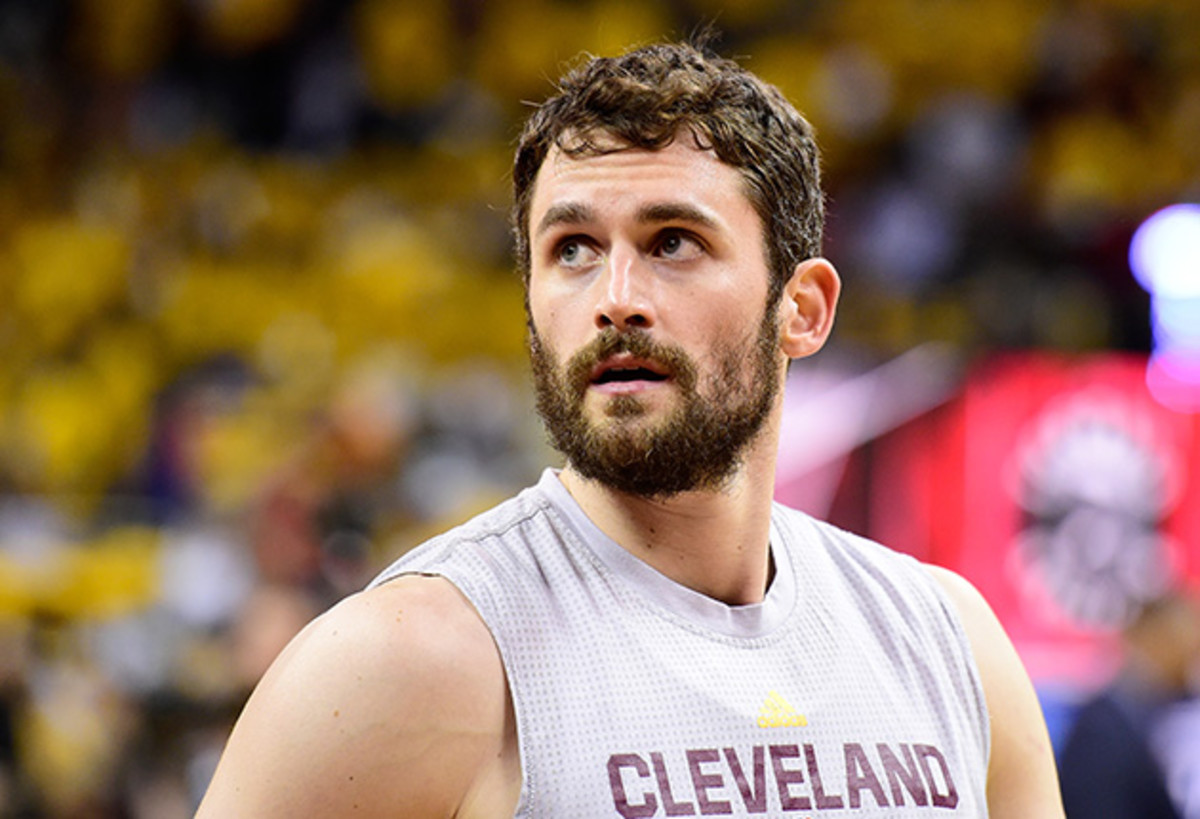
Kevin Love, in search of shelter
The last thing Cleveland should want is Love pulled out, 25 feet from the basket, to either hedge or switch on to Stephen Curry in the pick-and-roll. Love’s solid defense this postseason hasn’t gone unnoticed. That particular job, however, is beyond him—demanding better communication, quicker feet, and more productive instincts than he could reasonably claim. Golden State will go out of its way to put Love to the test at every opportunity. There’s nowhere to hide completely, though certain matchups offer Love more cover than others.
Bogut is among the most preferable. At this stage in his career, Bogut is both rangeless and fairly slow—qualities that render him significantly less dangerous in pick-and-roll or dribble hand-off situations than, say, Green. Any Bogut screen would allow Love to focus on guard attainment for a few beats with relatively little risk; a smart, well-coordinated defense can generally handle Bogut’s rumbles down the lane without compromising too much elsewhere on the floor.
Even if he doesn't take on Bogut, Love is best off avoiding a direct matchup with Green at all costs. It’s not just the shooting; the pick-and-roll chemistry between Curry and Green allows them to toggle angles and re-screen to string out defenders, all with a healthy flexibility in terms of space and angle. The wider breadth of options available to a pick-and-roll duo, the greater the potential for bigs like Love to get lost in the shuffle. Even Harrison Barnes would be a better starting matchup for Love, if not…
NBA Finals Rematches
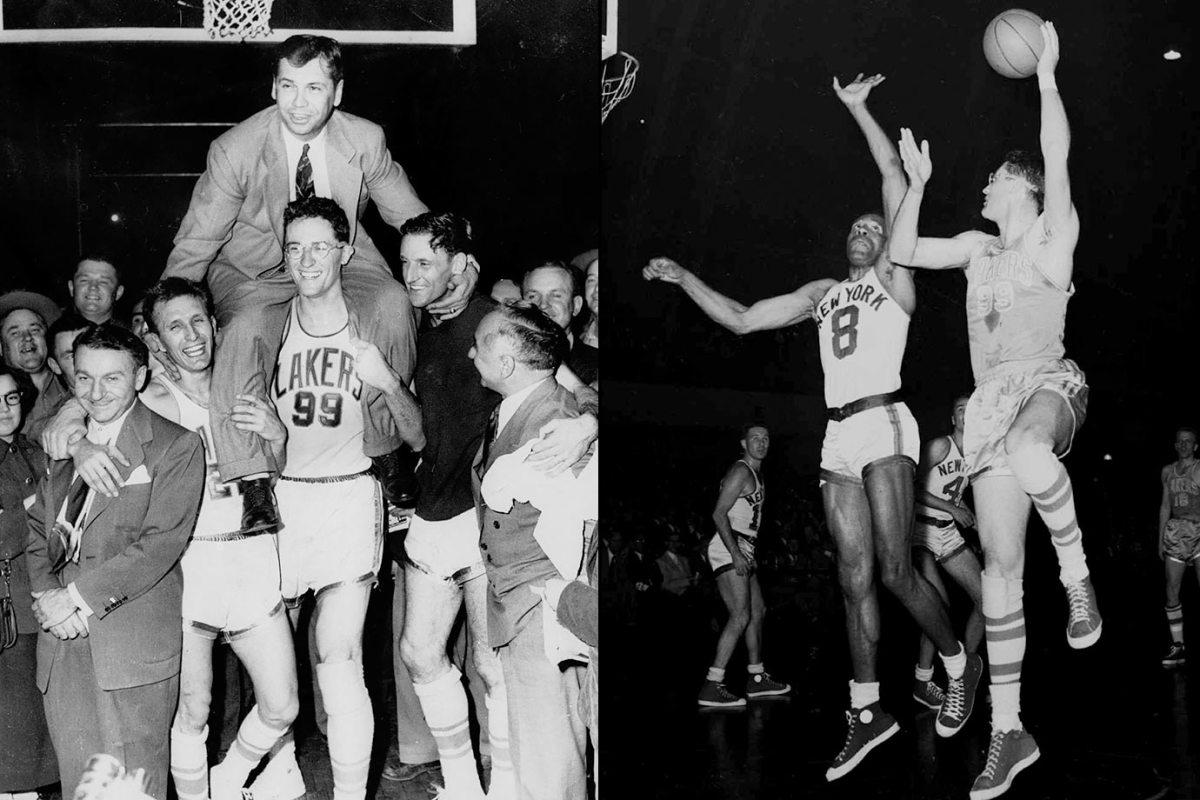
1952: Minneapolis Lakers 4, New York Knicks 3. George Mikan averaged 21.7 points and 17.4 rebounds, and the Lakers beat the Knicks in seven games. The teams alternated wins and losses in each game. — 1953: Minneapolis Lakers 4, New York Knicks 1. Mikan was dominant again, averaging 20.8 points. The Knicks took Game 1 on the road, but the Lakers won the next four — keyed by two two-point triumphs.
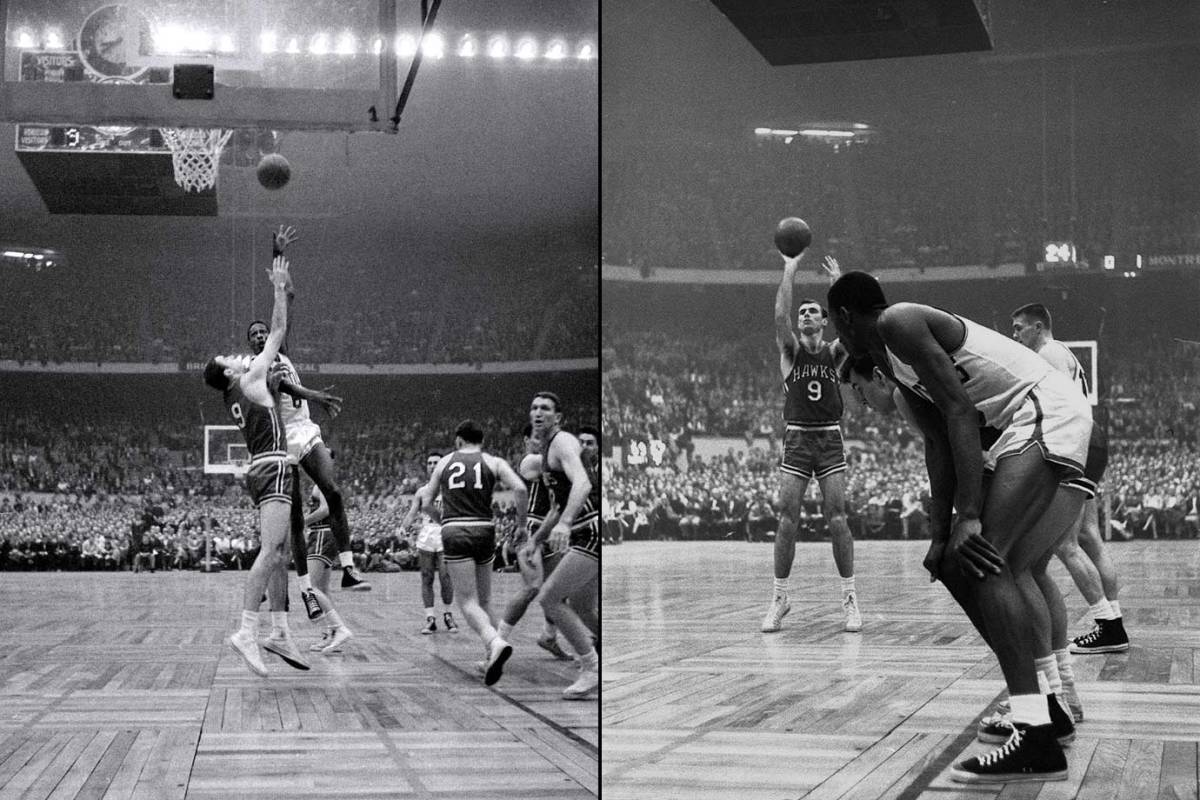
1957: Boston Celtics 4, St. Louis Hawks 3. A tremendous series, with four of the seven games decided by two points — including Game 7, the Celtics winning 125-123 in double overtime. — 1958: St. Louis Hawks 4, Boston Celtics 2. Denied a title the previous year, Hawks star Bob Pettit averaged 29.3 points and 17 rebounds — with 50 points in the Game 6 clincher.
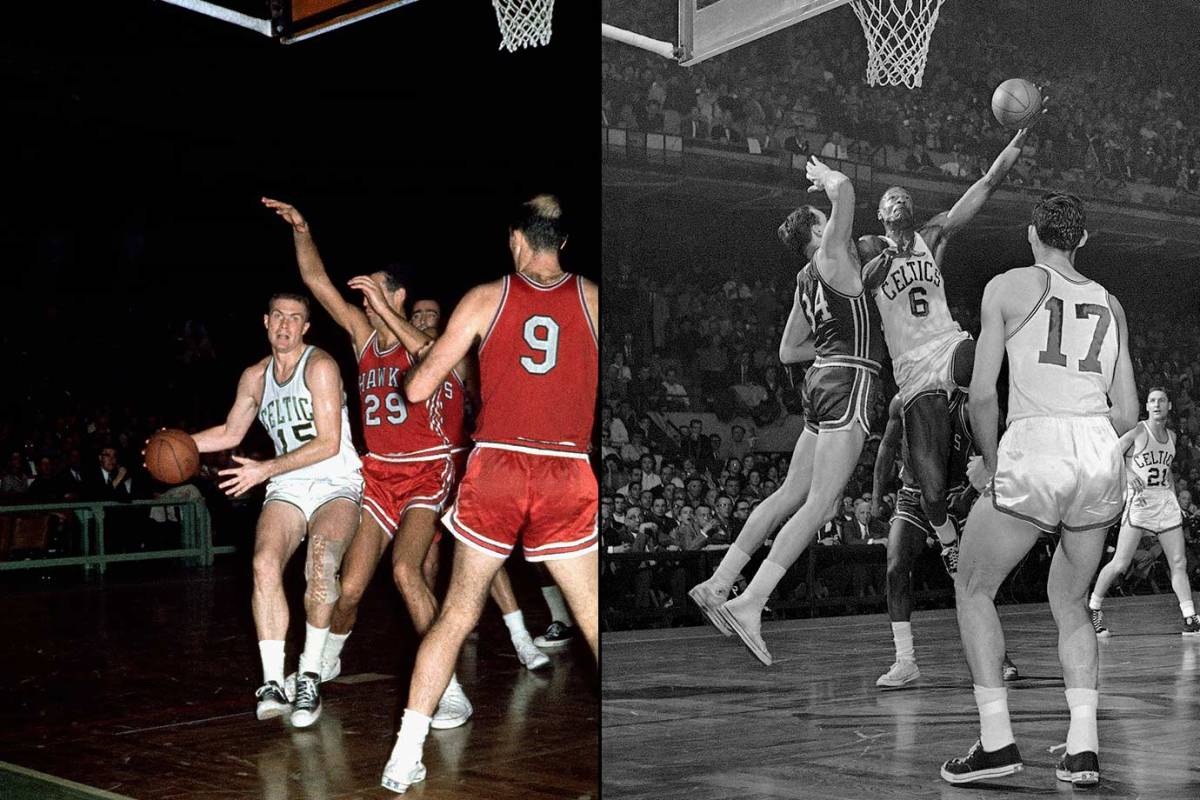
1960: Boston Celtics 4, St. Louis Hawks 3. Tom Heinsohn averaged 22.4 points, Bill Russell averaged 24.9 rebounds and the Celtics got four double-digit wins, including a 122-103 victory in Game 7. — 1961: Boston Celtics 4, St. Louis Hawks 1. More of the same. Heinsohn led the Celtics in scoring again at 22 points, Russell grabbed an astounding 28.8 rebounds and Boston easily defended its title.
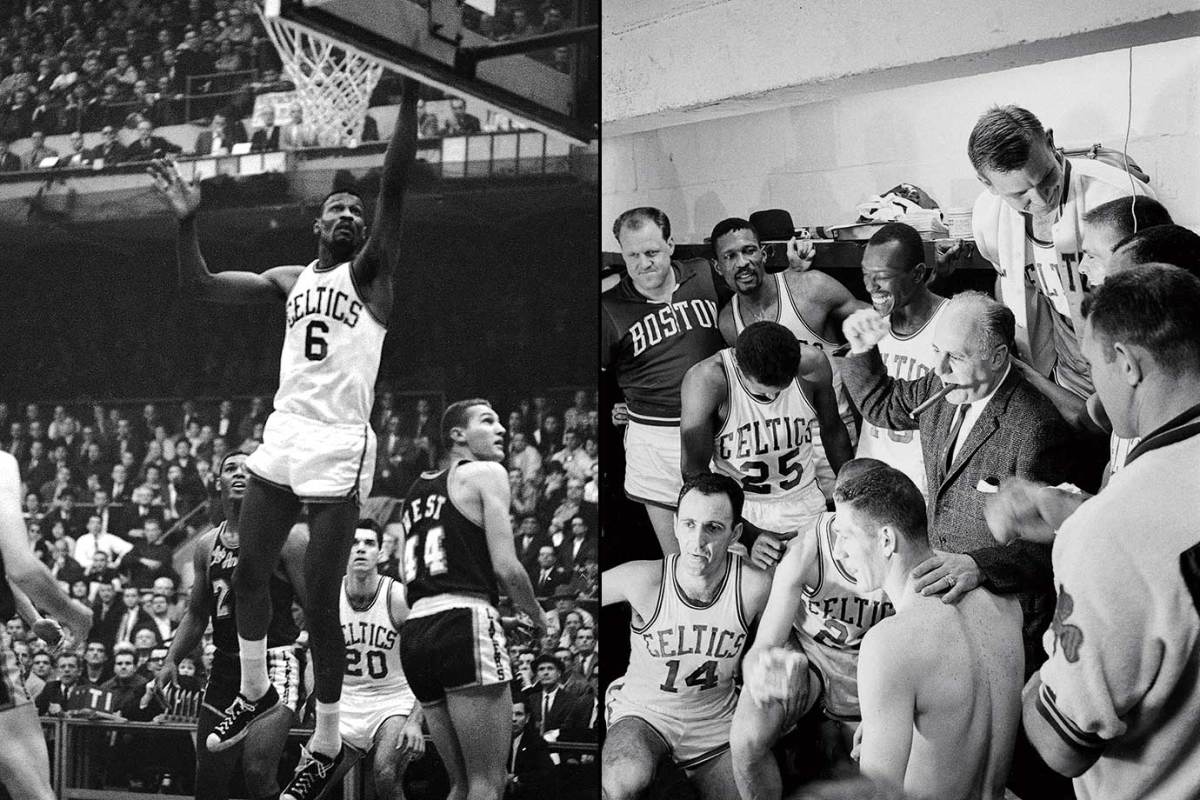
1962: Boston Celtics 4, Los Angeles Lakers 3. Lakers stars Elgin Baylor (who had a 61-point game, a Finals record) and Jerry West were brilliant, averaging 72 points per game. But the Celtics rallied from 3-2 down. Bill Russell averaged 22.9 points and 27 rebounds for Boston. — 1963: Boston Celtics 4, Los Angeles Lakers 2. Baylor and West averaged 63 points per game. The Celtics, with Sam Jones, Tom Heinsohn and Russell leading the way, had too much depth and balance.
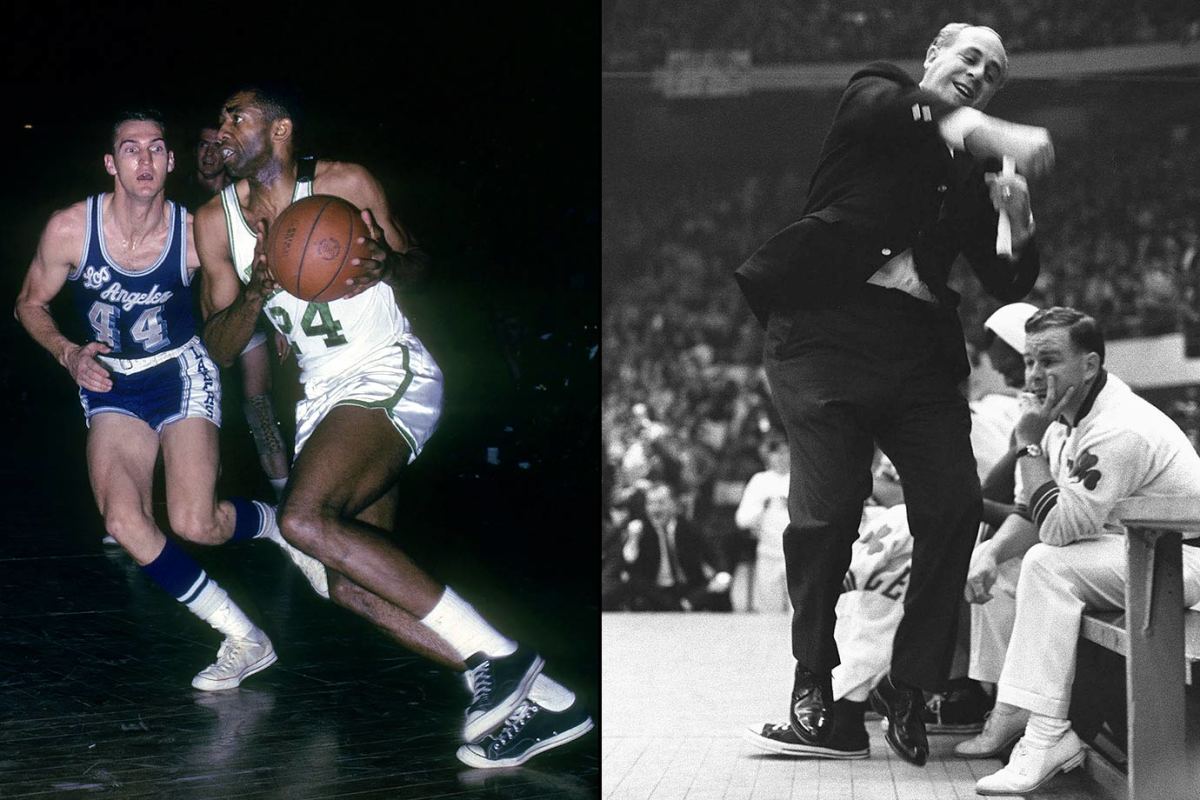
1965: Boston Celtics 4, Los Angeles Lakers 1. Boston left little doubt, winning Game 1 by 32 points and Game 5 by 33 points. Jerry West averaged 33.8 points in vain for the Lakers; Sam Jones averaged 27.8 points for Boston. — 1966: Boston Celtics 4, Los Angeles Lakers 3. Up 3-1 at one point, the Celtics were forced to a Game 7 in Red Auerbach’s final season. Boston escaped with a two-point win for its eighth straight title
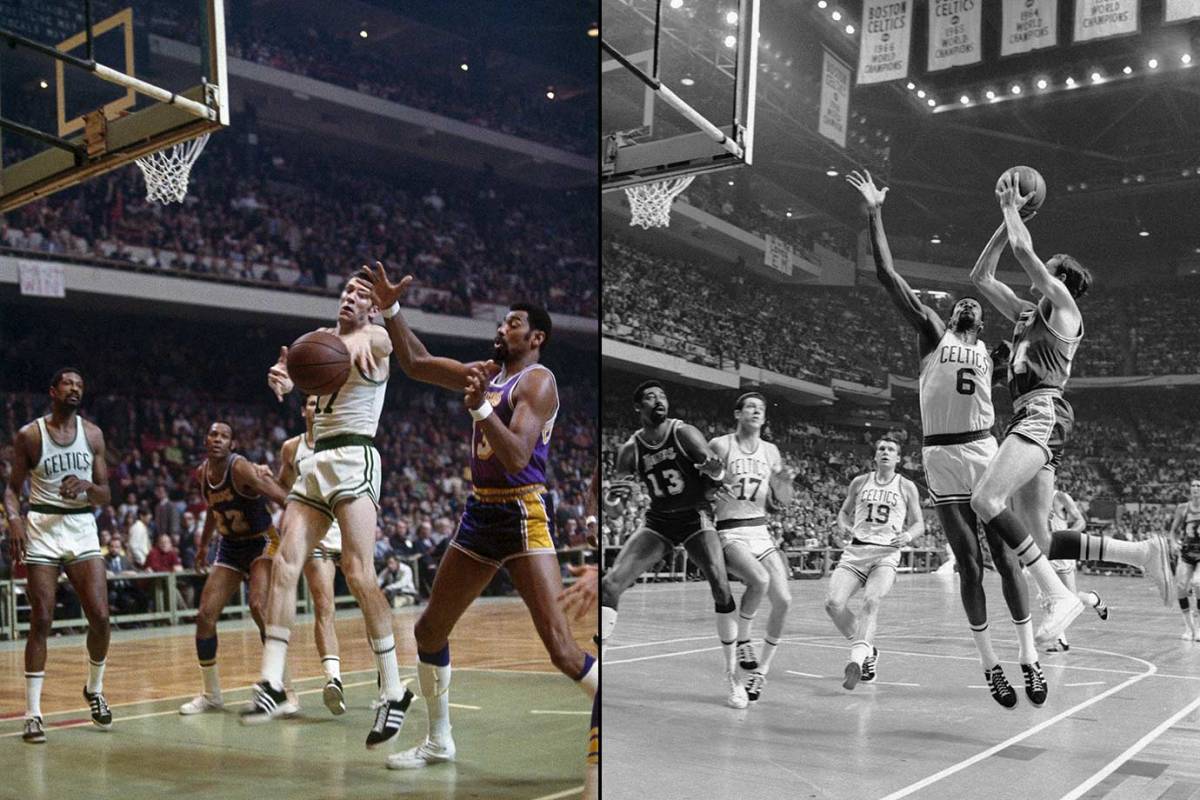
1968: Boston Celtics 4, Los Angeles Lakers 2. Boston blew a big lead in Game 5 at home but won in overtime, then closed it out on the road in Game 6 behind 40 points from John Havlicek. — 1969: Boston Celtics 4, Los Angeles Lakers 3. The Celtics’ dominance over the NBA continued, Boston winning its 11th title in a 13-year span. Jerry West won the MVP award, in a losing effort.
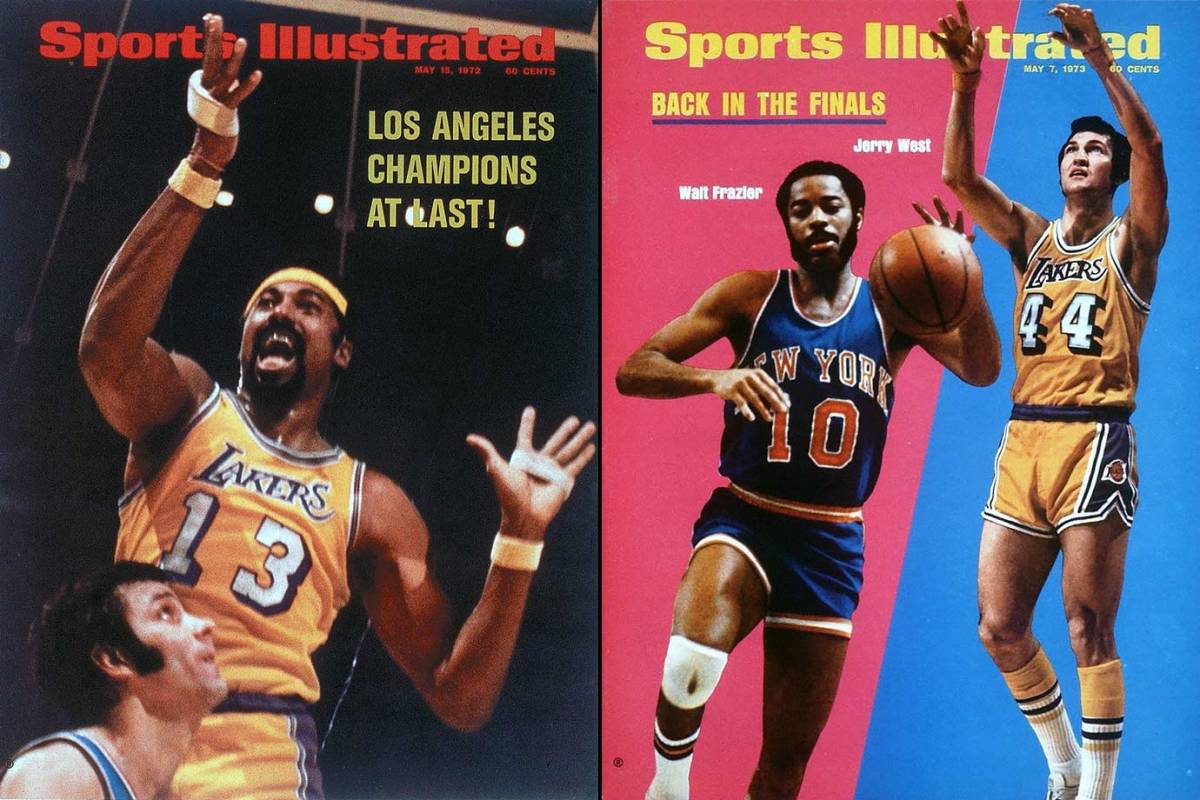
1972: Los Angeles Lakers 4, New York Knicks 1. The Knicks rolled in Game 1, and after that it was all Lakers. Wilt Chamberlain (19.4 ppg, 23.2 rpg) wins MVP honors, leading the Lakers to the win. — 1973: New York Knicks 4, Los Angeles Lakers 1. Turnabout was fair play; the Lakers grabbed a 1-0 lead and then the Knicks won out. It was Chamberlain’s last game, and the Knicks’ most-recent title.
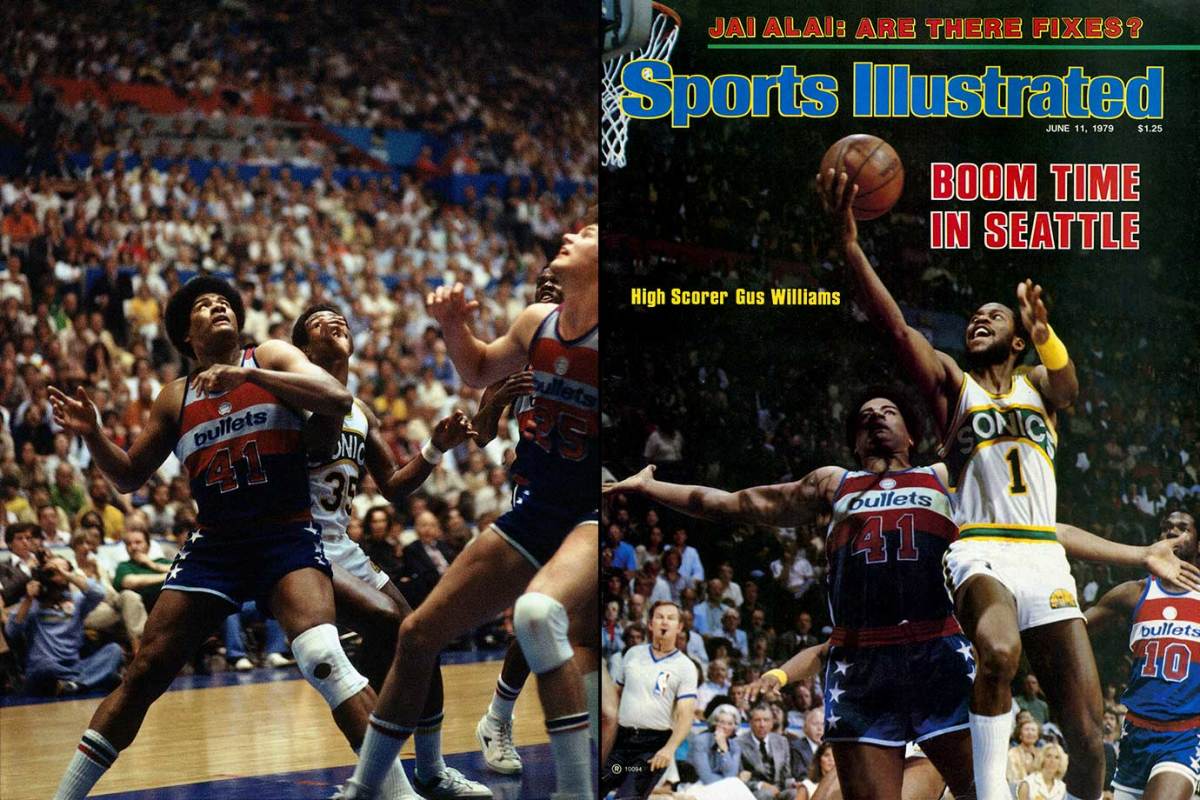
1978: Washington Bullets 4, Seattle SuperSonics 3. Seattle led 1-0, 2-1 and 3-2 — but the Bullets took Games 6 and 7. Wes Unseld was Finals MVP, averaging 9 points and nearly 12 rebounds per game. — 1979: Seattle SuperSonics 4, Washington Bullets 1. Gus Williams averaged 28.6 points, Finals MVP Dennis Johnson added 22.6 points and Seattle won the last four games of the series.
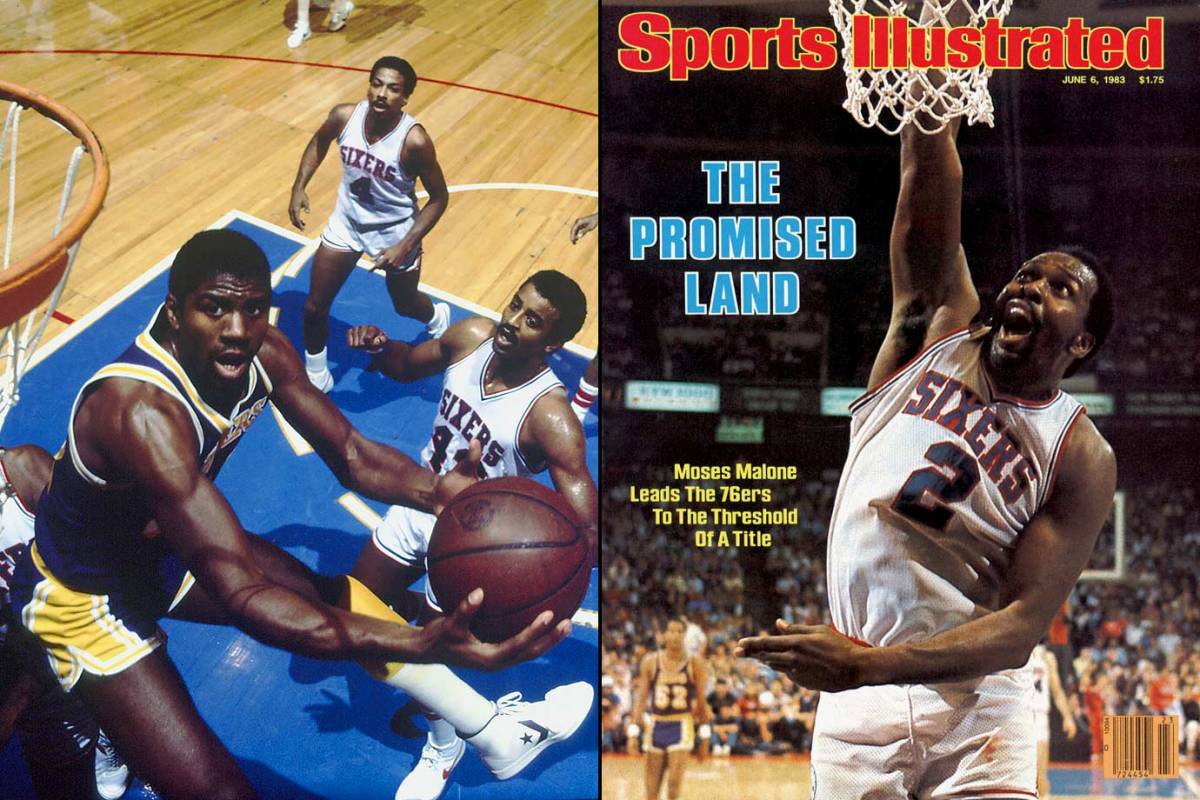
1982: Los Angeles Lakers 4, Philadelphia 76ers 2. Magic Johnson caps an MVP performance with 13 points, 13 rebounds and 13 assists in Game 6, and the Lakers win in Pat Riley’s rookie coaching season. — 1983: Philadelphia 76ers 4, Los Angeles Lakers 0. Moses Malone averaged 25.8 points and 18 rebounds, and the 76ers capped a dominant playoff run with a one-sided romp in the Finals.
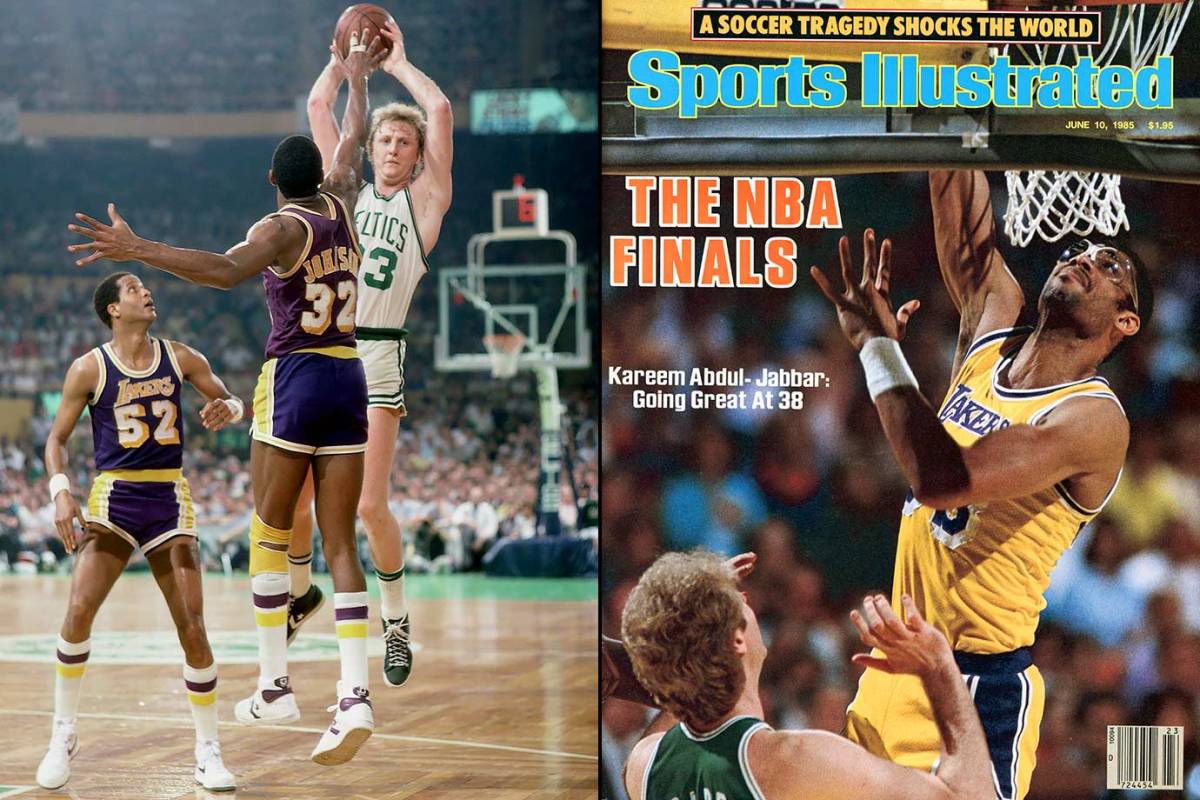
1984: Boston Celtics 4, Los Angeles Lakers 3. Cedric Maxwell’s 24 points in Game 7 and an MVP performance from Larry Bird lifted the Celtics to their 15th world title. — 1985: Los Angeles Lakers 4, Boston Celtics 2. Game 1 was the “Memorial Day Massacre,” a 148-114 Boston win. But the Lakers won four of the next five games, and Kareem Abdul-Jabbar won the MVP.
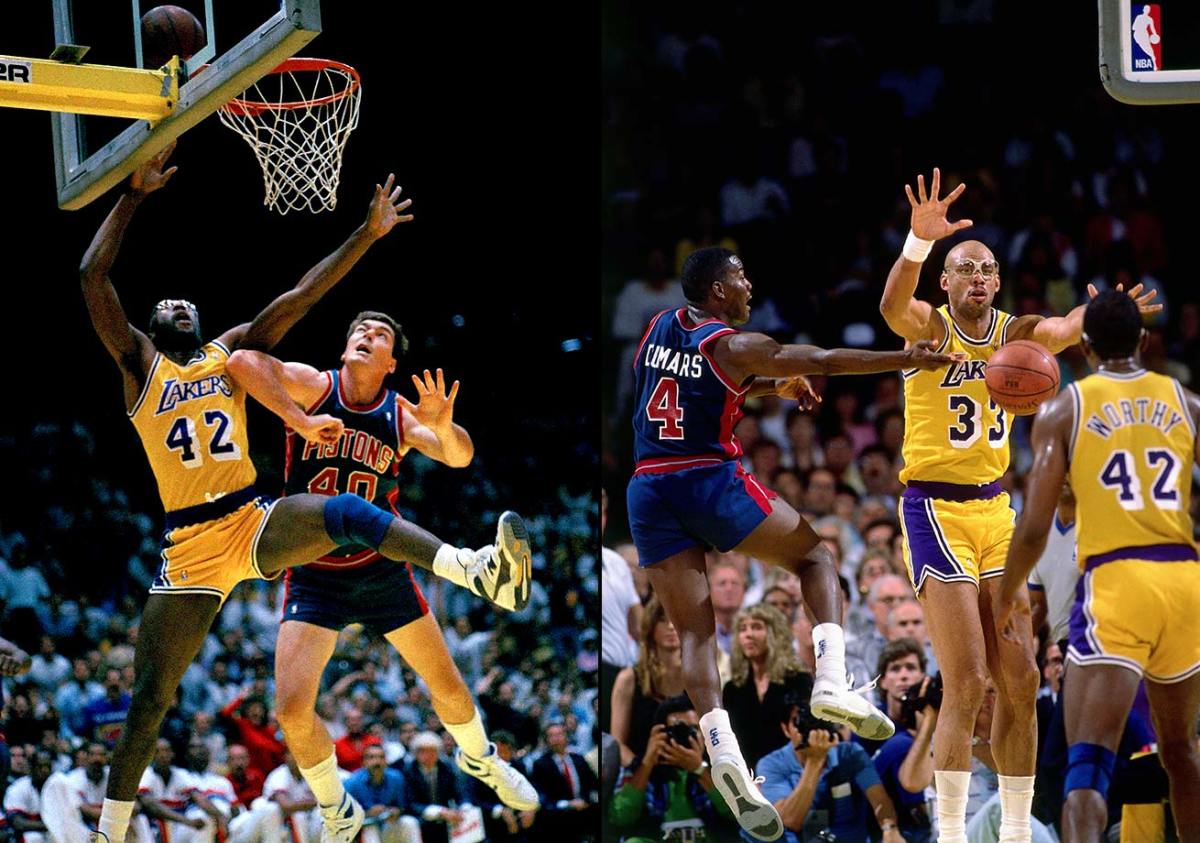
1988: Los Angeles Lakers 4, Detroit Pistons 3. The Lakers win their second straight title, taking Games 6 and 7 by a combined four points. James Worthy scored 36 points in Game 7 for the Lakers. — 1989: Detroit Pistons 4, Los Angeles Lakers 0. Detroit’s so-called “Bad Boys” proved best, sweeping to the title behind Joe Dumars’ 27.3 points per game.
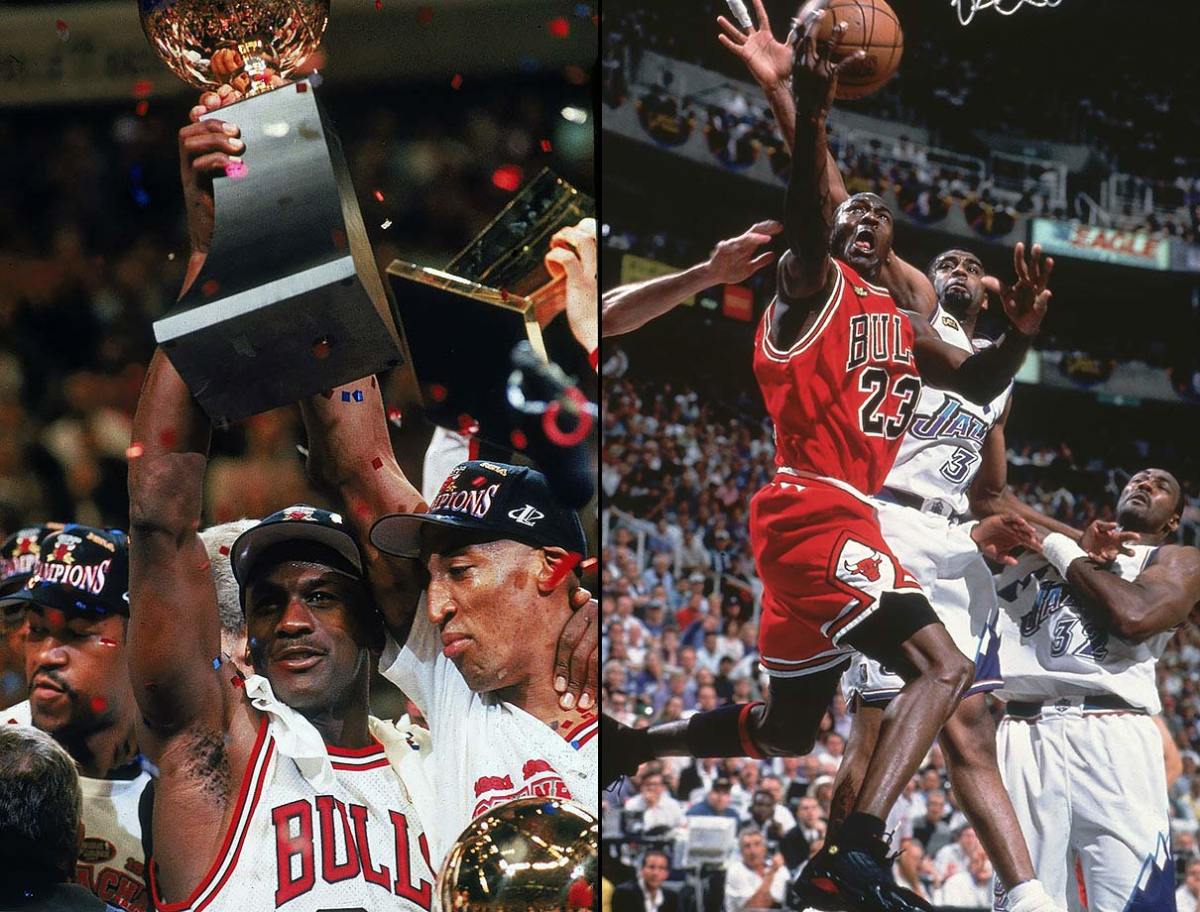
1997: Chicago Bulls 4, Utah Jazz 2. Michael Jordan wins MVP honors, he and Scottie Pippen average 52 points and the Bulls hold off Karl Malone, John Stockton and the Jazz. — 1998: Chicago Bulls 4, Utah Jazz 2. Jordan’s sixth and final championship was capped by a 45-point effort, punctuated by the go-ahead jumper in the final seconds of Game 6.
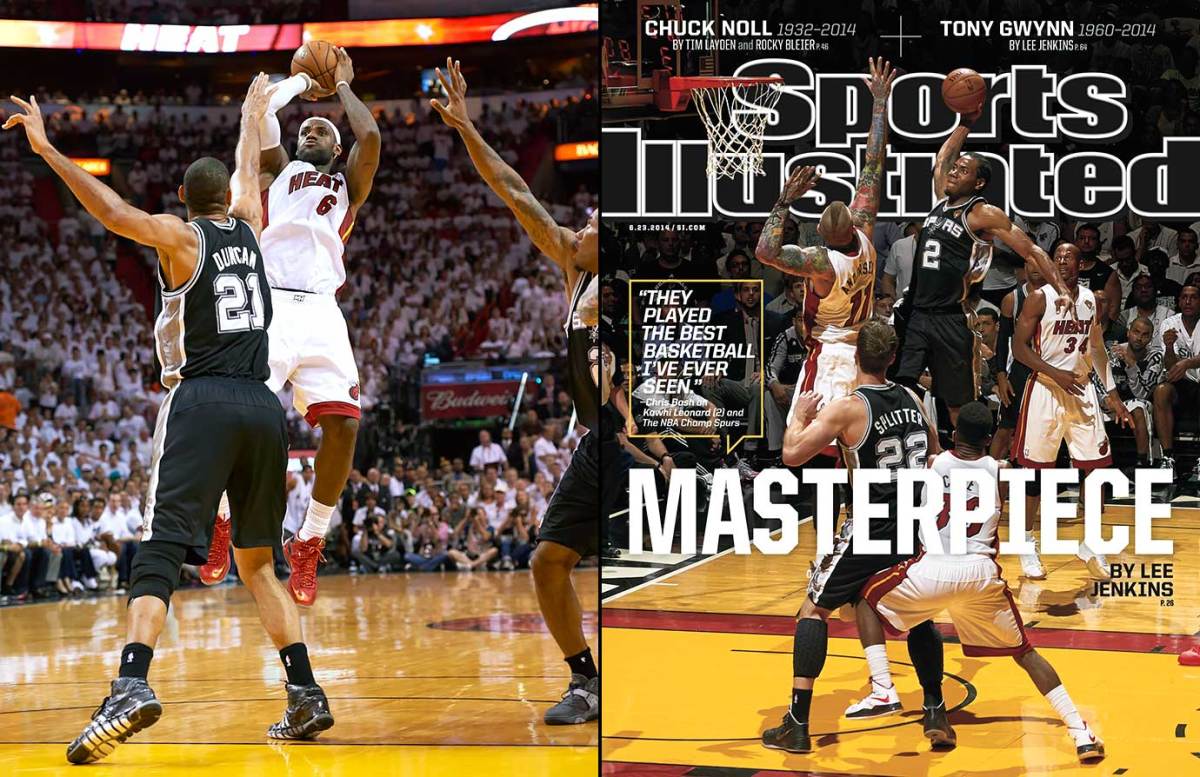
2013: Miami Heat 4, San Antonio Spurs 3. Ray Allen’s 3-pointer with 5.2 seconds left in Game 6 saves Miami, then LeBron James takes over late in Game 7 as the Heat go back-to-back. — 2014: San Antonio Spurs 4, Miami Heat 1. The Spurs split the first two games at home, then got two big wins in Miami and finished it off at San Antonio in Game 5 for their fifth title.
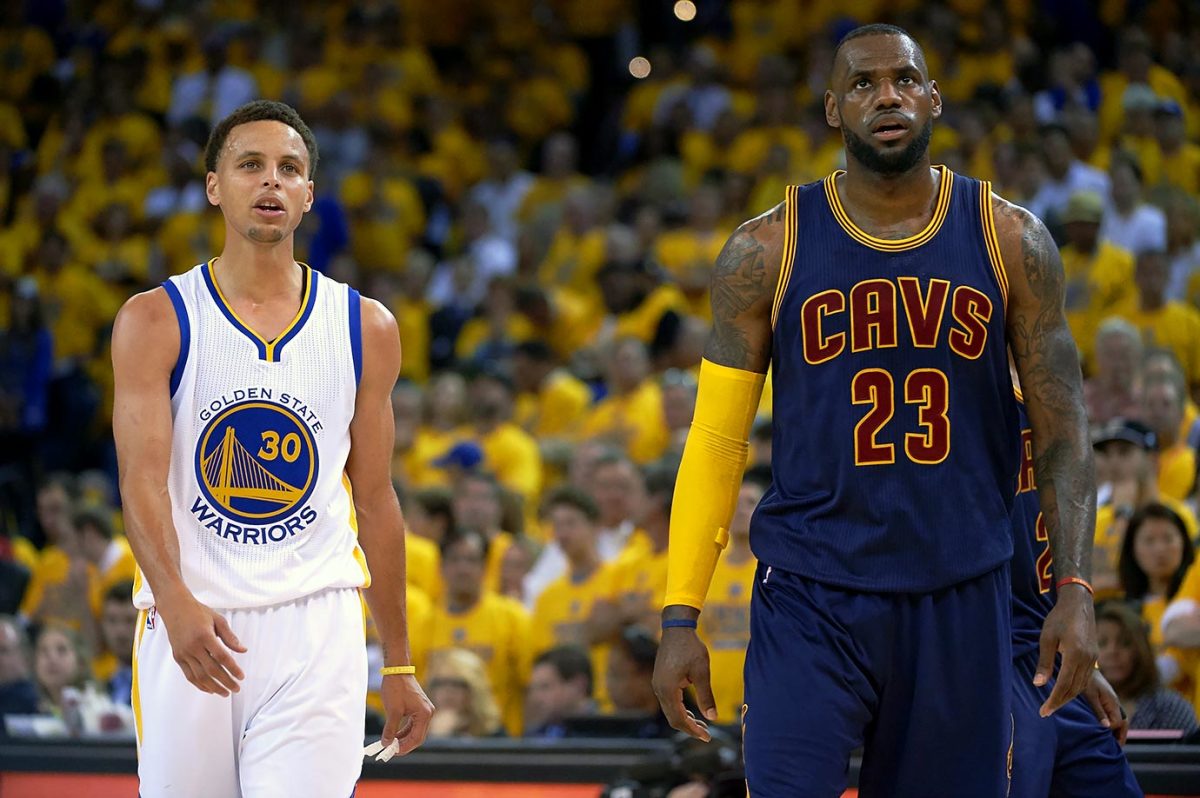
2015: Golden State Warriors 6, Cleveland Cavaliers 2. Revived by Stephen Curry, their fresh-faced shooting superstar, and bonded by first-year coach Steve Kerr who made them believe, the Warriors ended a 40-year NBA championship drought by defeating LeBron James and the undermanned Cavaliers. — 2016: TBD
Andre Iguodala, potential starter
The Warriors didn’t throw many deliberate double-teams at James in the 2015 Finals, but they applied pressure in their own way. Iguodala, one of the best denial defenders in the league, made LeBron work for every catch and then held his ground after claiming sound defensive position. The rest of Golden State’s defenders took a step inward and extended their arms—showing James a wall to the weak side that simultaneously shrank the court and deterred long passes. One of the most dominant players in the league was reduced, in part by his team’s injuries, to iso-post inefficiency.
Stephen Curry vs. LeBron James: How do Warriors and Cavs stars stack up?
James won’t be used in quite the same way now that Irving and Love are healthy again, though Iguodala remains Golden State’s top choice for contesting his post-ups and drives. Considering that Iguodala’s minutes will largely be tethered to LeBron’s, it would make sense for the Warriors to kick around the possibility of starting him at small forward—just as they did against Kevin Durant in Game 7 of the Western Conference finals. Barnes, who doesn’t move quite well enough to keep up with James, would be out of his depth in the opening minutes. Even Green didn’t fare well in the one-on-one matchup last time around, proof positive that LeBron can work over many of the best, most versatile defenders in the league.
Iguodala remains a rare exception. It’s possible that Kerr might bring him off the bench to start the series as a way to artificially depress his minutes. Otherwise it can be difficult to get Iguodala out of the game at all, particularly when his primary assignment is a high-usage creator who can turn a game in a matter of minutes. That danger is real, though it exists in equal measure at the beginning of every game and in any instance when Iguodala isn’t on the floor to fend off LeBron’s drives. Starting Iguodala might be the easiest way to maximize the alignment of their rotations, while also moving Barnes to the bench to help handle…
The Kevin Love-Channing Frye space odyssey
Never is Cleveland’s offense more fluid than when both of its bigs can stretch the floor. LeBron has buckled defenses throughout his career by making crisp passes from inside a swarm of opponents. Irving is so valuable because he can slice through consecutive layers of defense to finish at the basket. Remove those degrees of difficulty and the Cavs max out their scoring potential. Open space is rarely more than a pass away—facilitated by Frye’s knockdown shooting and Love’s pick-and-pop game.
• MORE NBA: Steph vs. LeBron: How the NBA Finals stars stack up
Golden State will need to be mindful of these lineups in the same way that opponents must batten down the hatches when Green slides over to center. In limited minutes throughout these playoffs, Cleveland has scored 121.7 points per 100 possessions with Love and Frye on the floor together, per NBA.com—a significant improvement on what was already the best offense of the postseason on balance. Their pairing leaves Bogut with no one to guard, Speights in way over his head, and Anderson Varejao out of his comfort zone. Ezeli might at least be able to scurry between contesting Frye and maintaining his other defensive responsibilities, though the best antidote is the most obvious one: Green and Barnes as the Warriors’ functional, flexible bigs.
Their footspeed alone would be a big help in the scramble of containing drives while minding shooters at every other position. Both Green and Barnes are quite switchable, too, which can negate the value of floor-spacing bigs if an offense takes too long to initiate or doesn’t execute its counters. Most important: Playing Barnes and Green opposite Love and Frye forces Cleveland’s bigs into the same fundamental binds. Whether they survive them will depend in part on…
100 Best NBA Finals Photos
2016
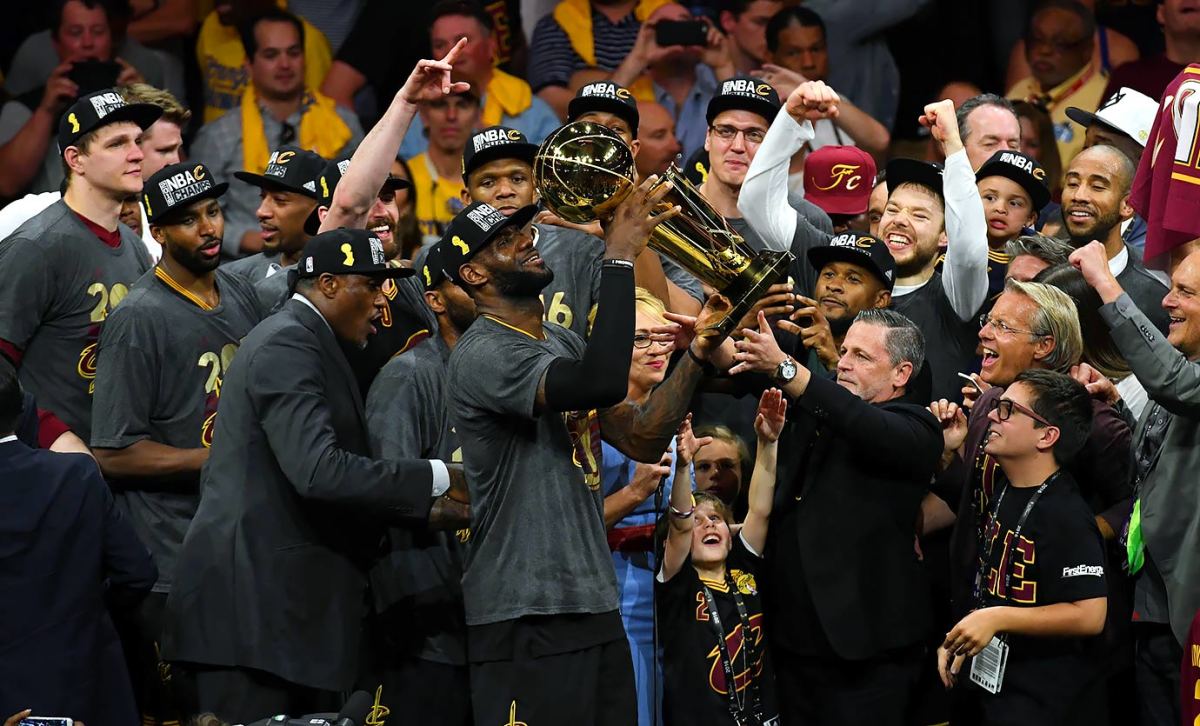
LeBron James holds up the shiny gold trophy in what might be his sweetest championship yet, the one he is so proudly bringing home to his native northeast Ohio just as he promised to do when he returned to the Cavaliers two summers earlier.
2015
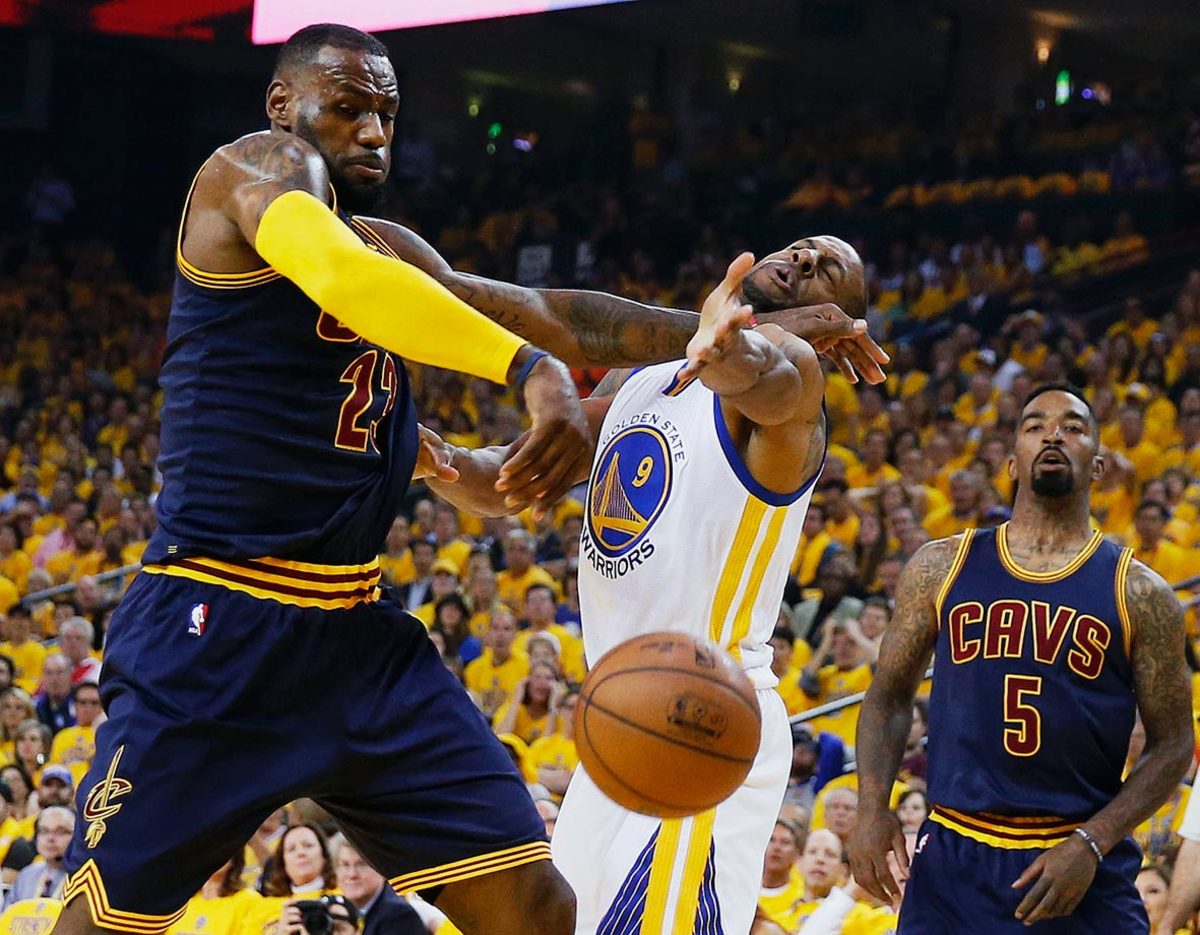
LeBron James loses the ball as he tries to fend off Andre Iguodala in Game 1 between the Warriors and Cavaliers. Golden State won the game and the series 4-2. Iguodala became the first player to win the Finals MVP award without having started every game in the series. He was tasked with guarding LeBron, who made only 38.1 percent of his shots when Iguodala was in the game.
2015
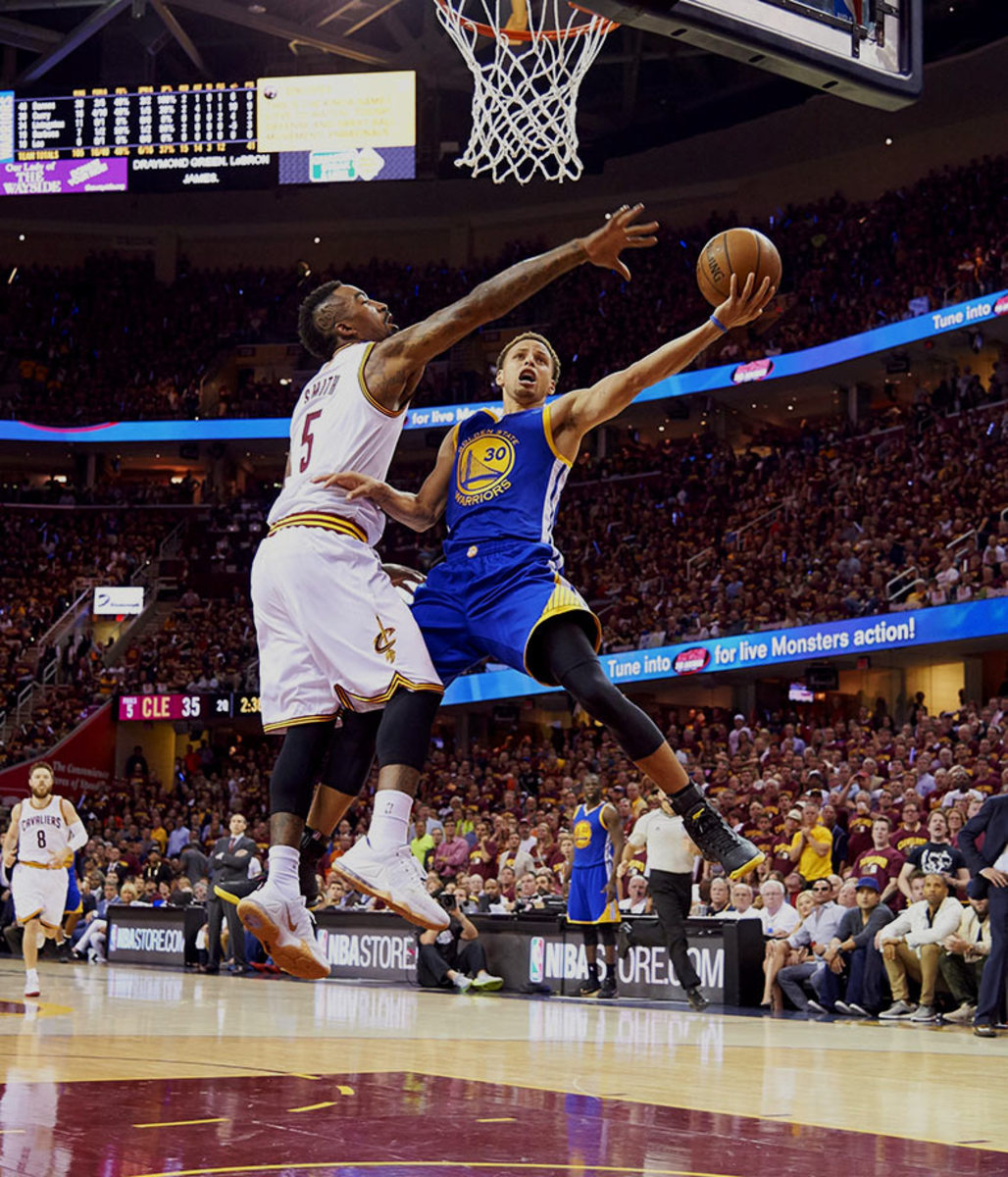
Steph Curry goes to the left hand against J.R. Smith to score two of his 25 points in Game 6. The Warriors defeated the Cavs 105-97 to clinch the franchise's first NBA title since 1975.
2014
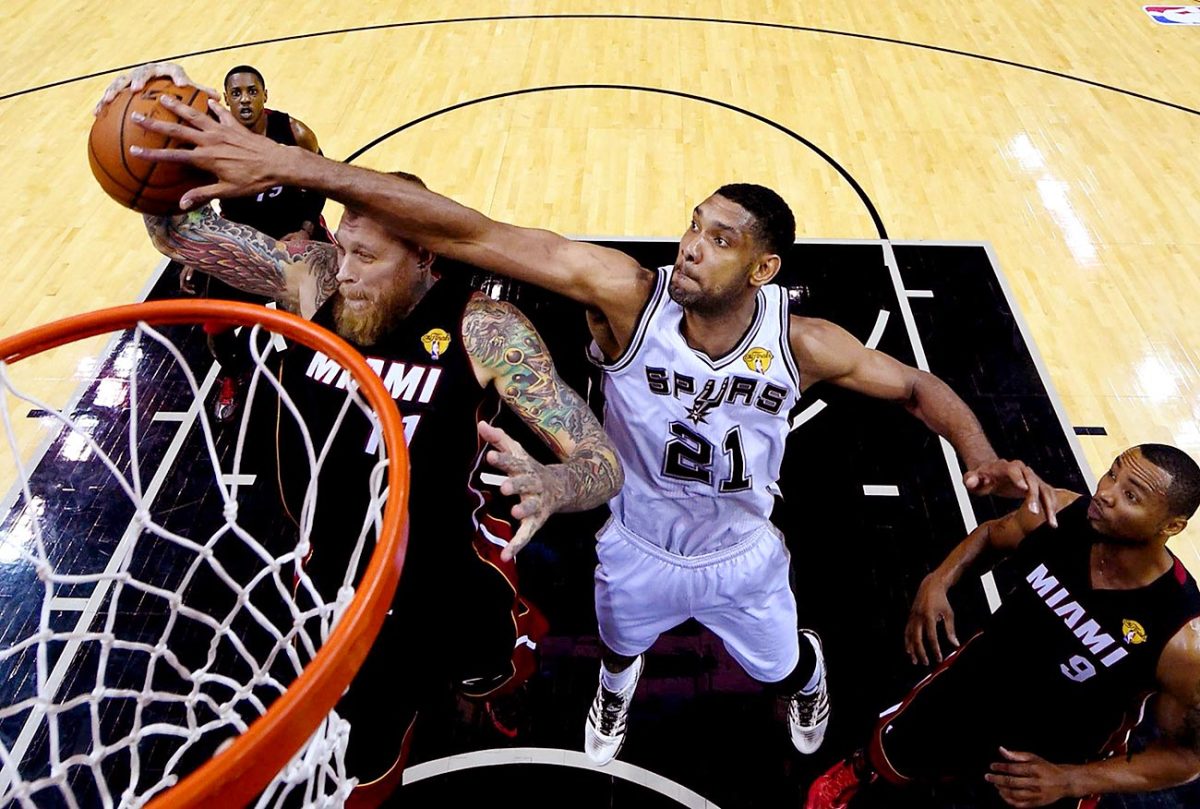
A year after an excruciating loss to the Miami Heat in the NBA Finals, Tim Duncan and the Spurs got their revenge, winning the title in five games.
2013
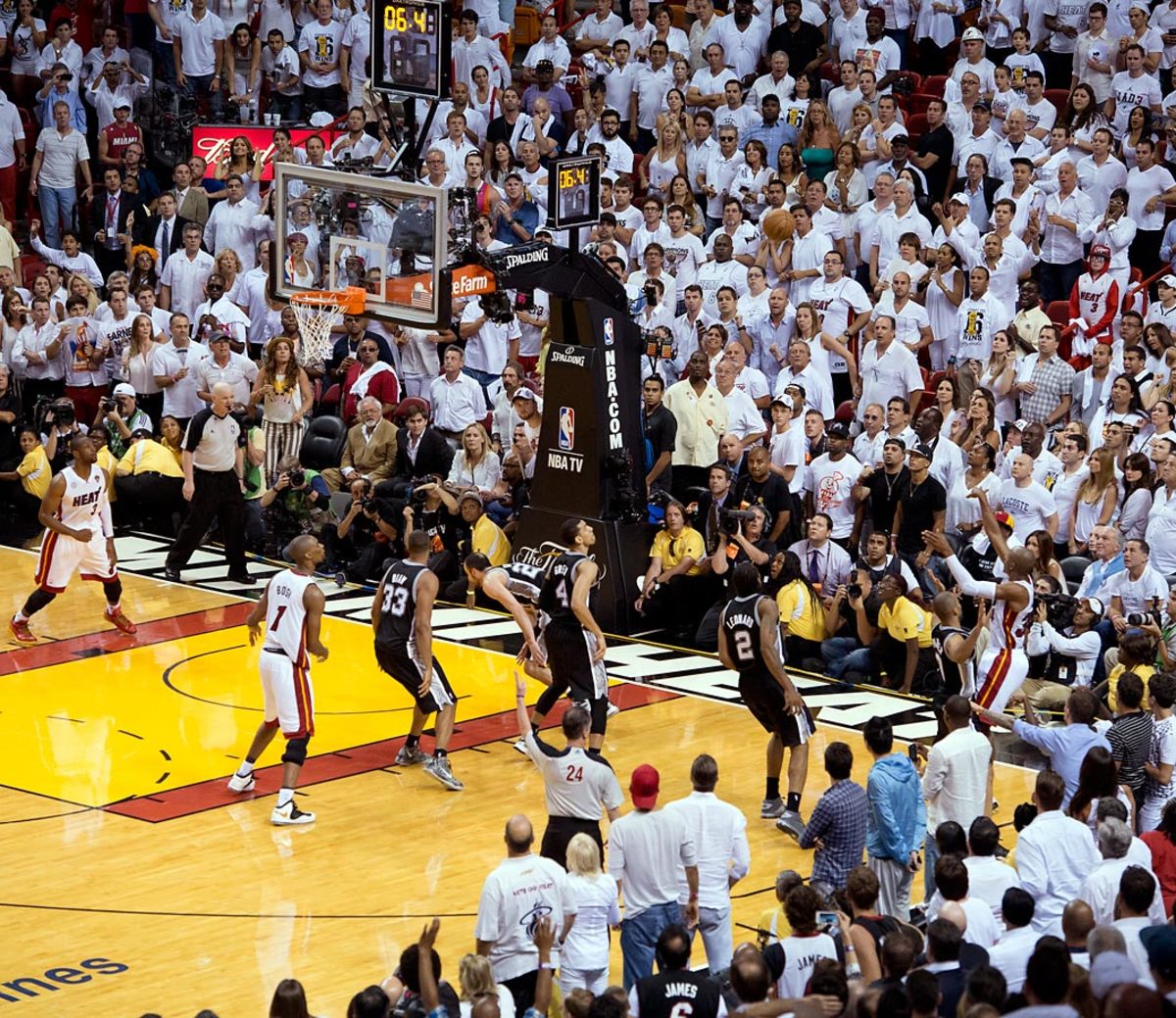
Ray Allen lets loose a series-changing three over Tony Parker in Game 6. With Miami down 3-2 in the series, it was the veteran Allen who sent the game to overtime and an eventual Heat victory. With a huge momentum boost, Miami went on to win the series.
2013
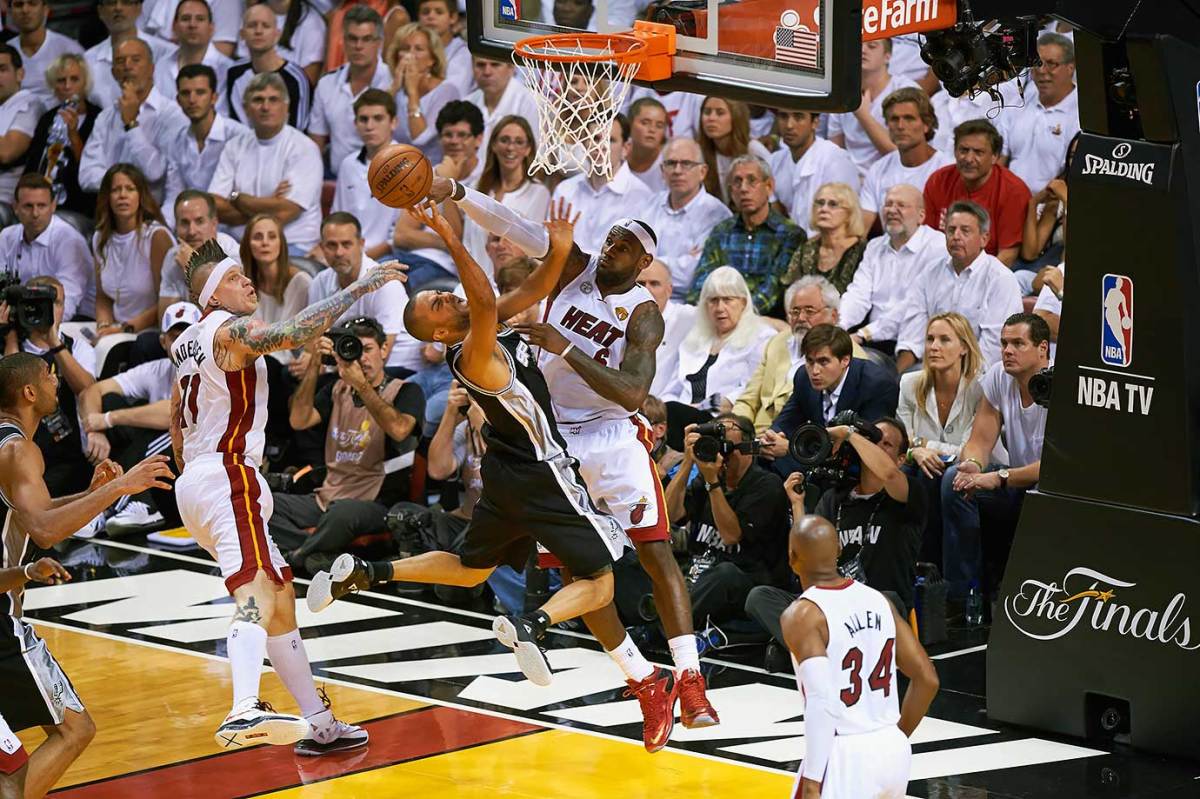
LeBron James led Miami to the finals for a third straight year and to a second consecutive title, duking it out with the Spurs for seven games. James won his second Finals MVP award with another series of stellar showings.
2012
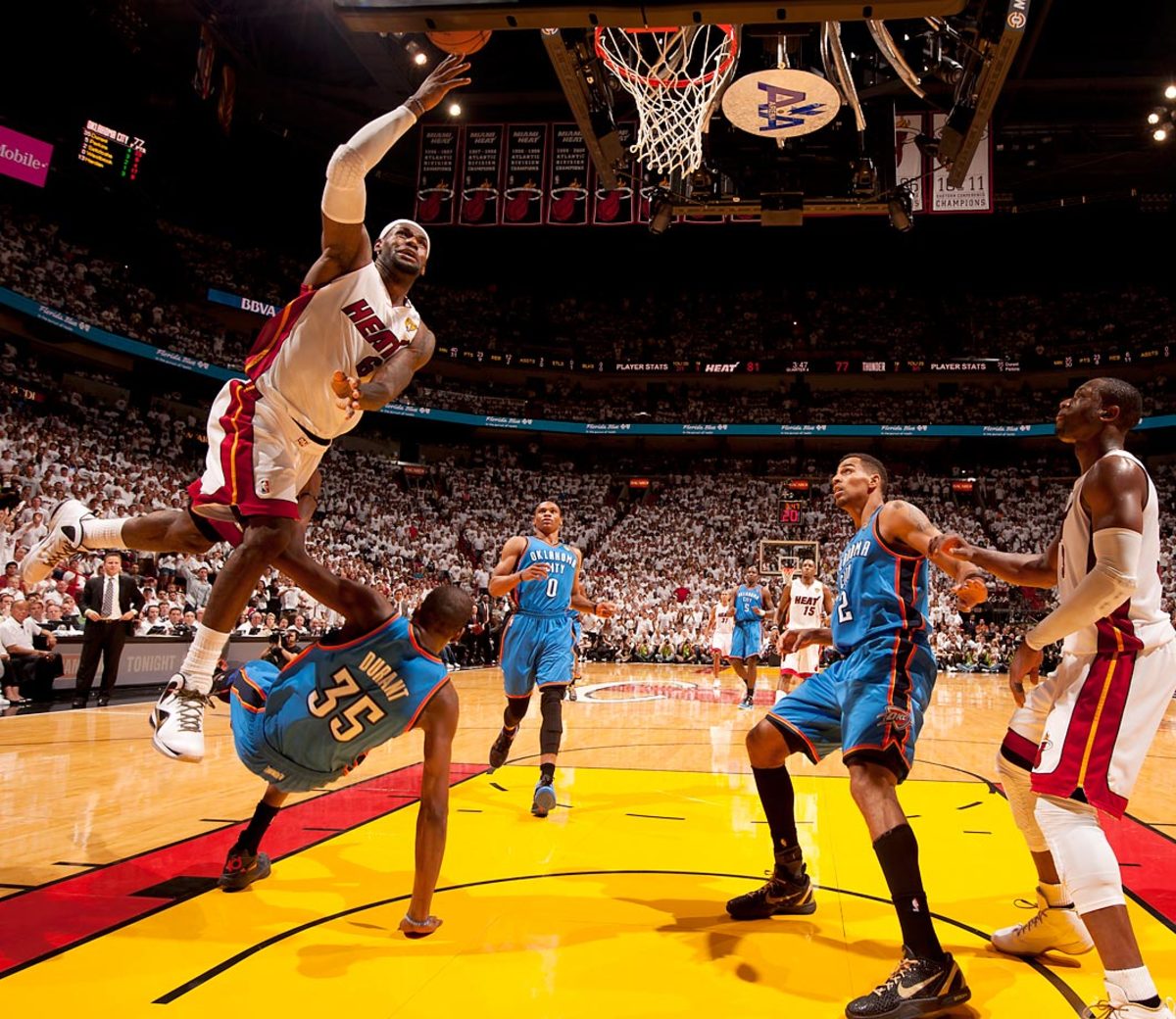
LeBron James soars over Kevin Durant in Game 3. James got the championship monkey off his back in a big way, averaging 28.6 points, 10.2 rebounds and 7.4 assists in the series.
2012
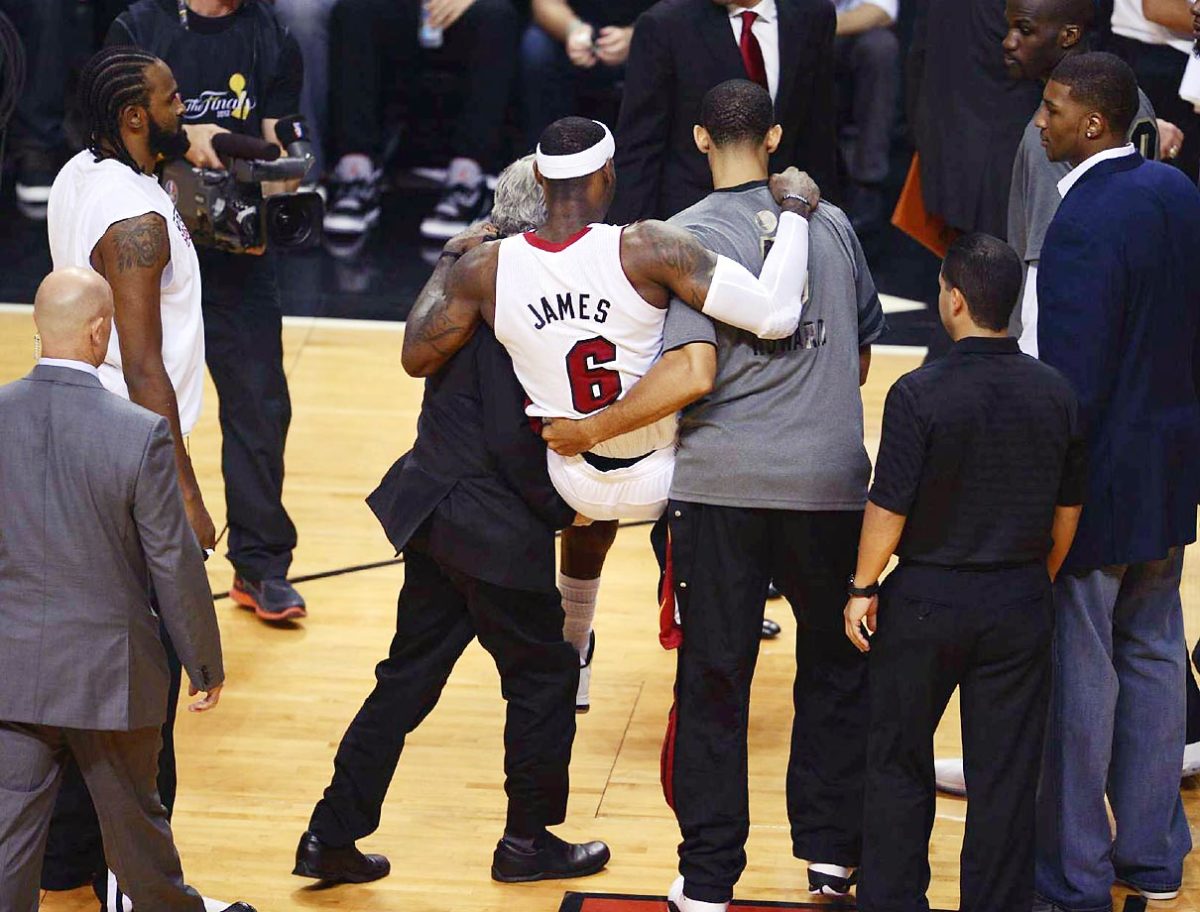
LeBron James battled cramps in Game 4 and was unable to finish out a 104-98 Heat victory. He still had 26 points, nine rebounds and 12 assists.
2011
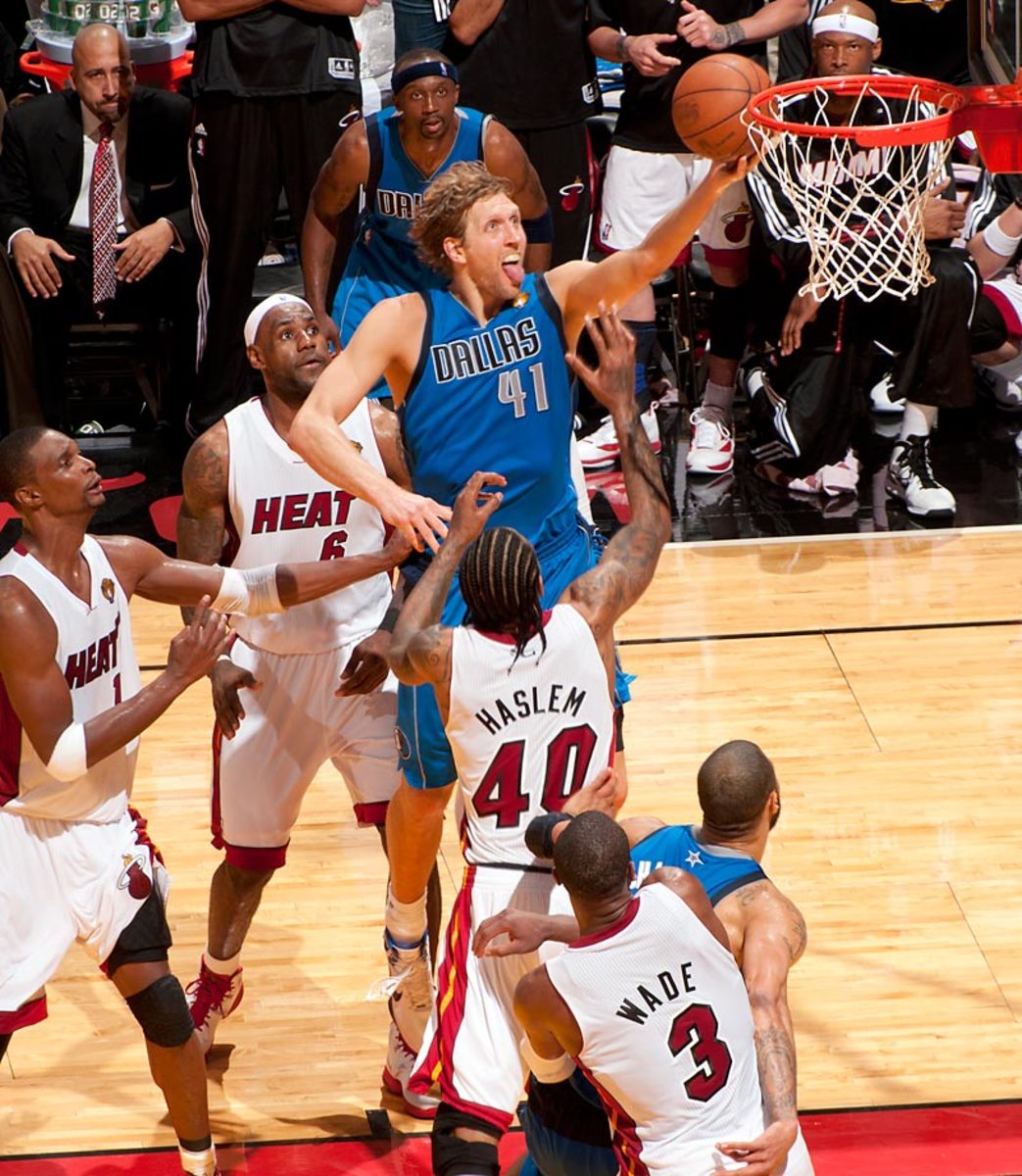
Dirk Nowitzki avoids traffic to drop in the game-winner for Dallas in Game 2. Nowitzki's clutch shot capped a furious 15-point fourth-quarter Mavs comeback. Dallas would knock off favored Miami and the "Big Three" of LeBron James, Dwyane Wade and Chris Bosh in six games in a rematch of the 2006 Finals.
2010
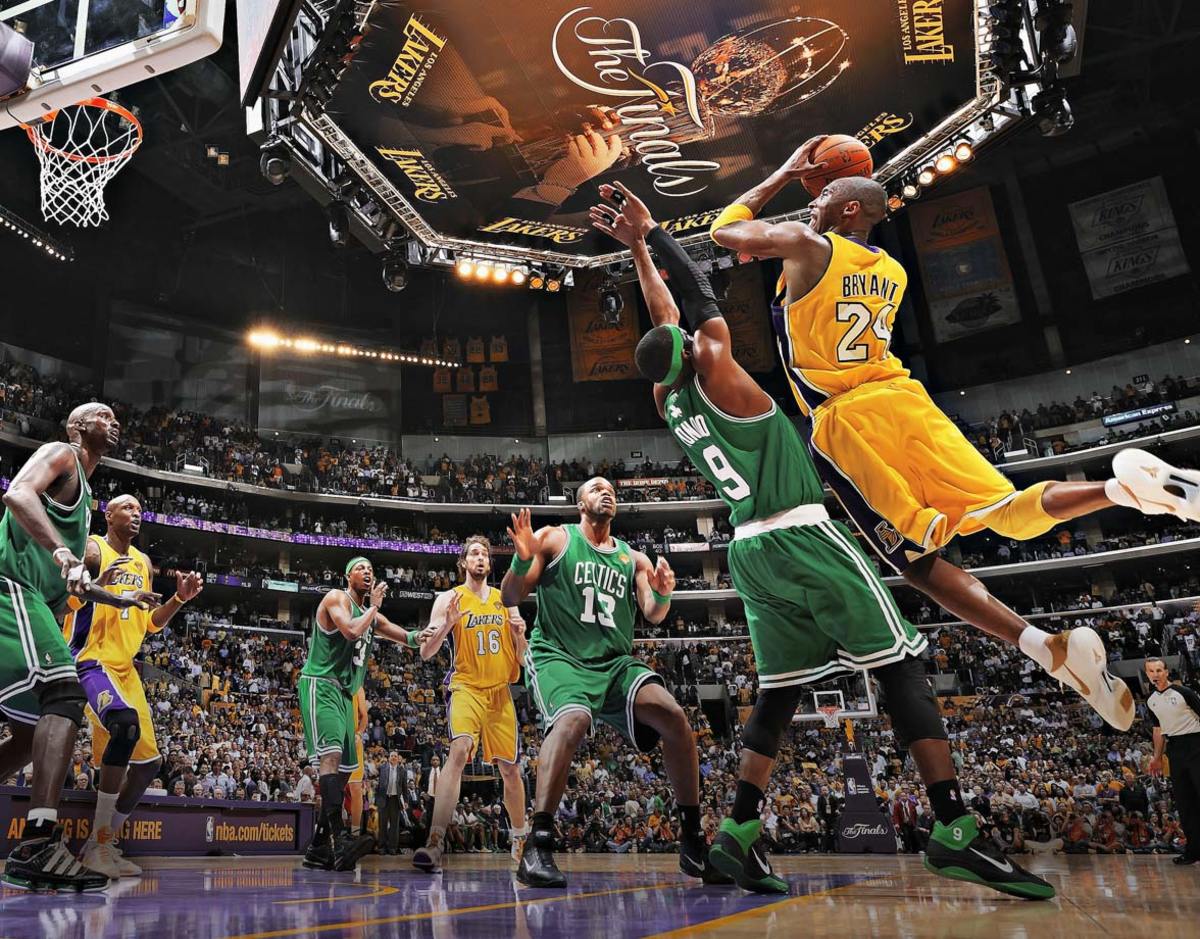
Kobe Bryant looks to shoot over Rajon Rondo in Game 6 between the Lakers and Celtics. Kobe averaged 29 points per game in the series, en route to his second consecutive Finals MVP award.
2010
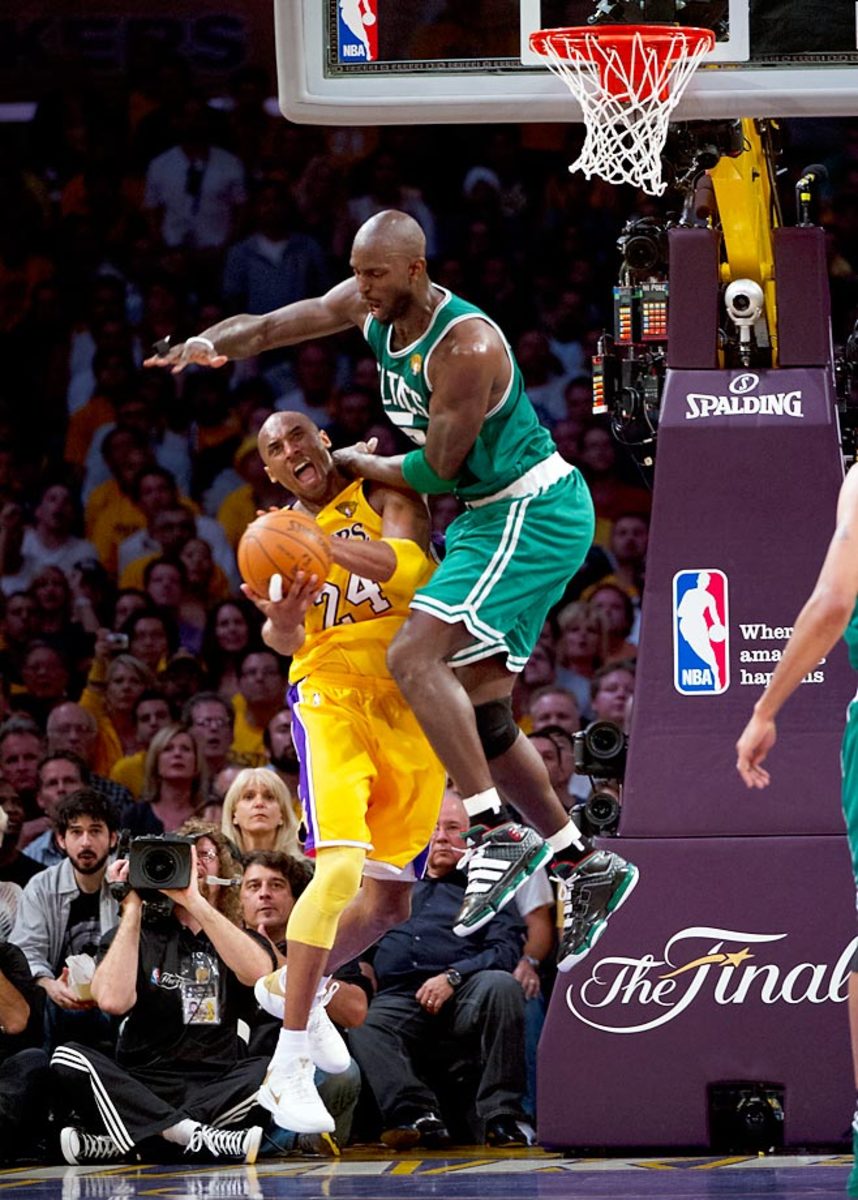
Kevin Garnett bodies a driving Kobe Bryant in a tight Game 7. The Celtics-Lakers rivalry was renewed in a back-and-forth series that saw Los Angeles come out on top for a second straight title.
2010
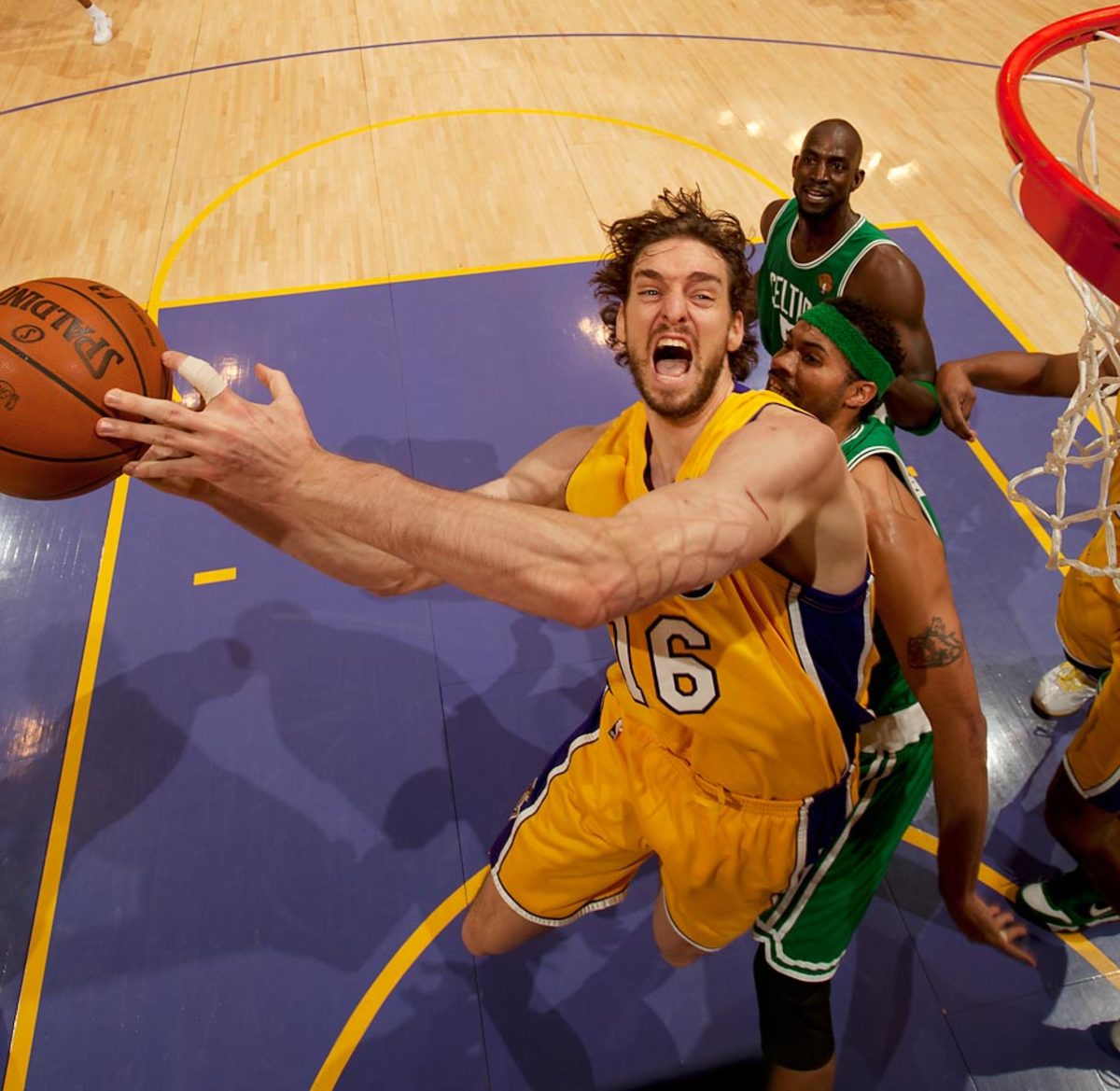
Pau Gasol owned the paint in Game 7 with 19 points and 18 rebounds to push the Lakers to an 83-79 win.
2009
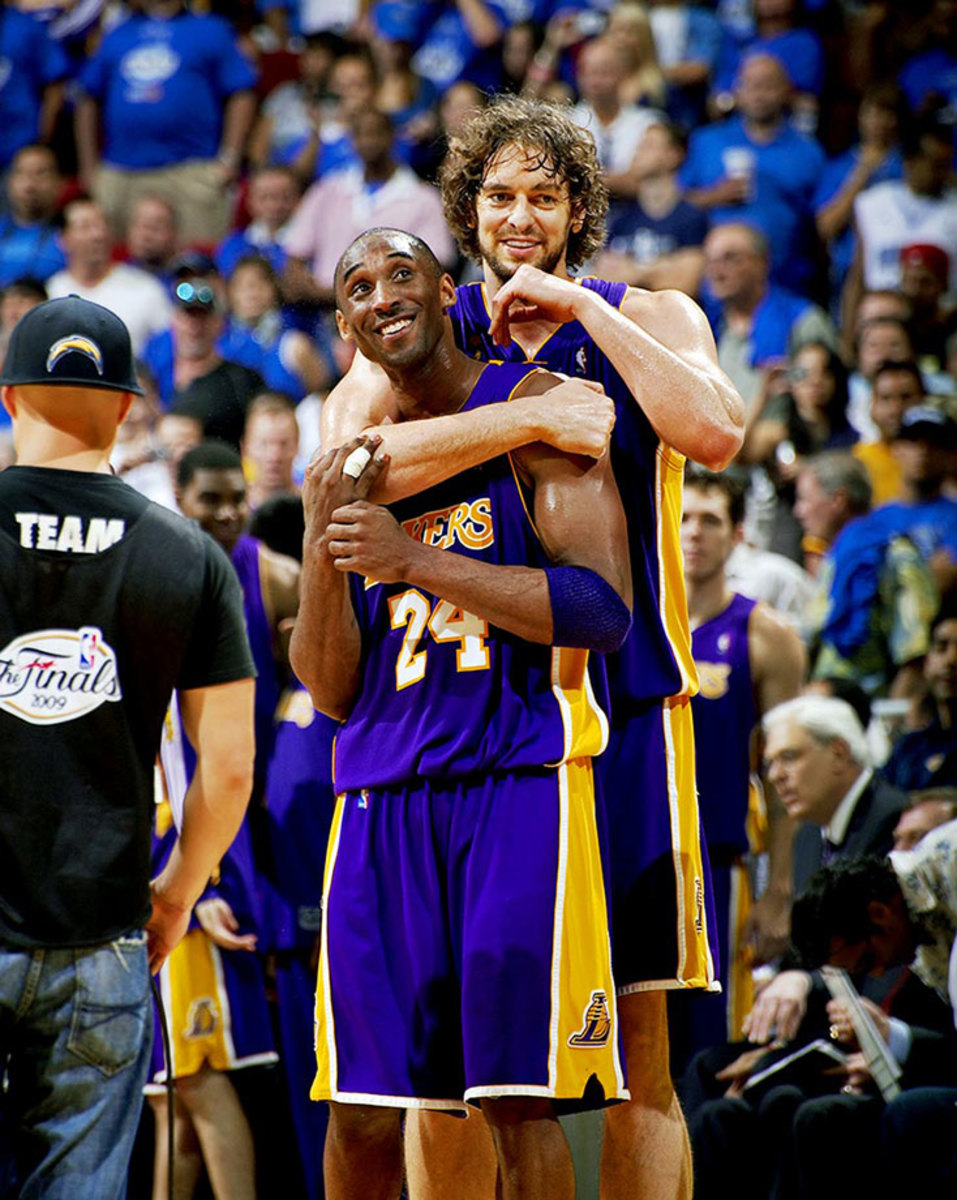
Pau Gasol hugs Kobe Bryant near the end of a series-clinching Game 5. The duo was crucial to L.A.'s five-game victory over Orlando, with Bryant named Finals MVP and winning his first title out of Shaquille O'Neal's shadow.
2008
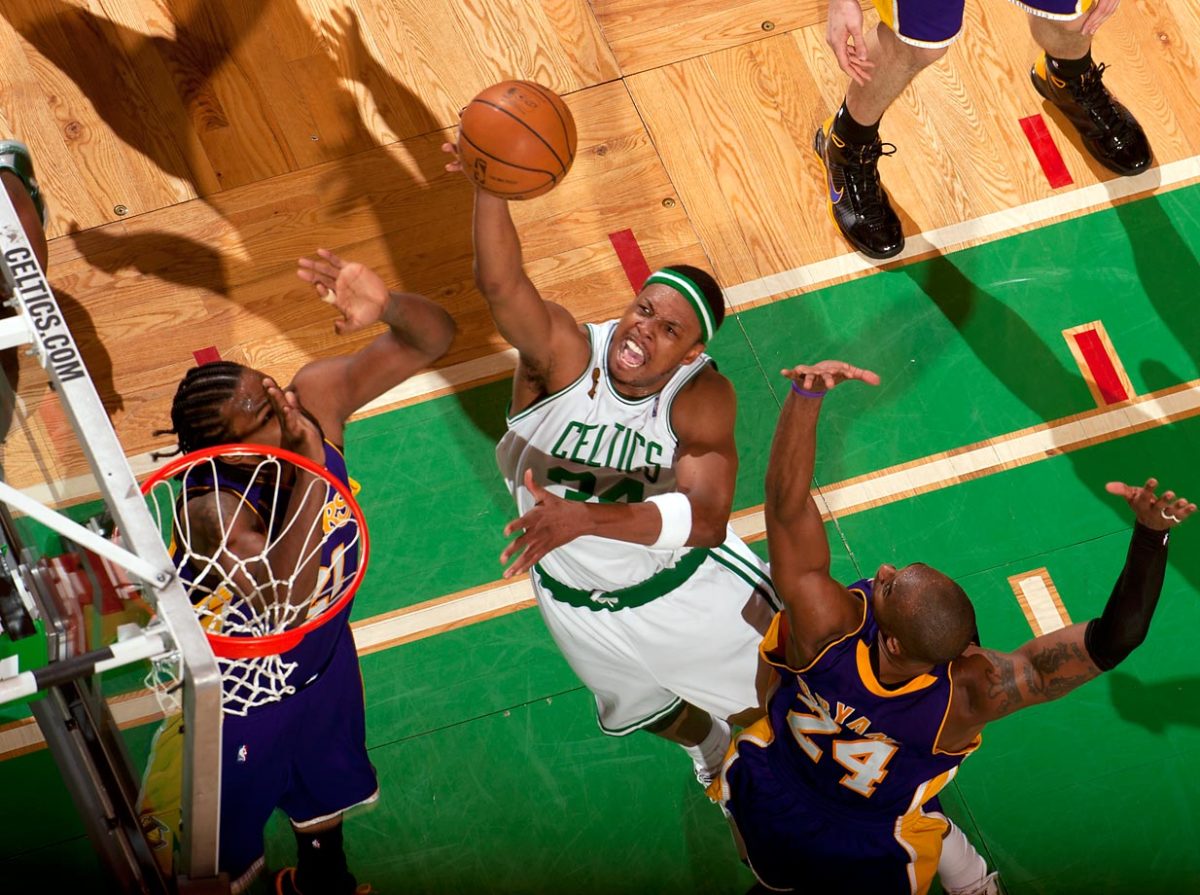
Averaging nearly 22 points per game, Finals MVP Paul Pierce paired with offseason acquisitions Kevin Garnett and Ray Allen to return the Celtics to their championship ways against the rival Lakers. The win marked the first title for each of the three stars.
2007
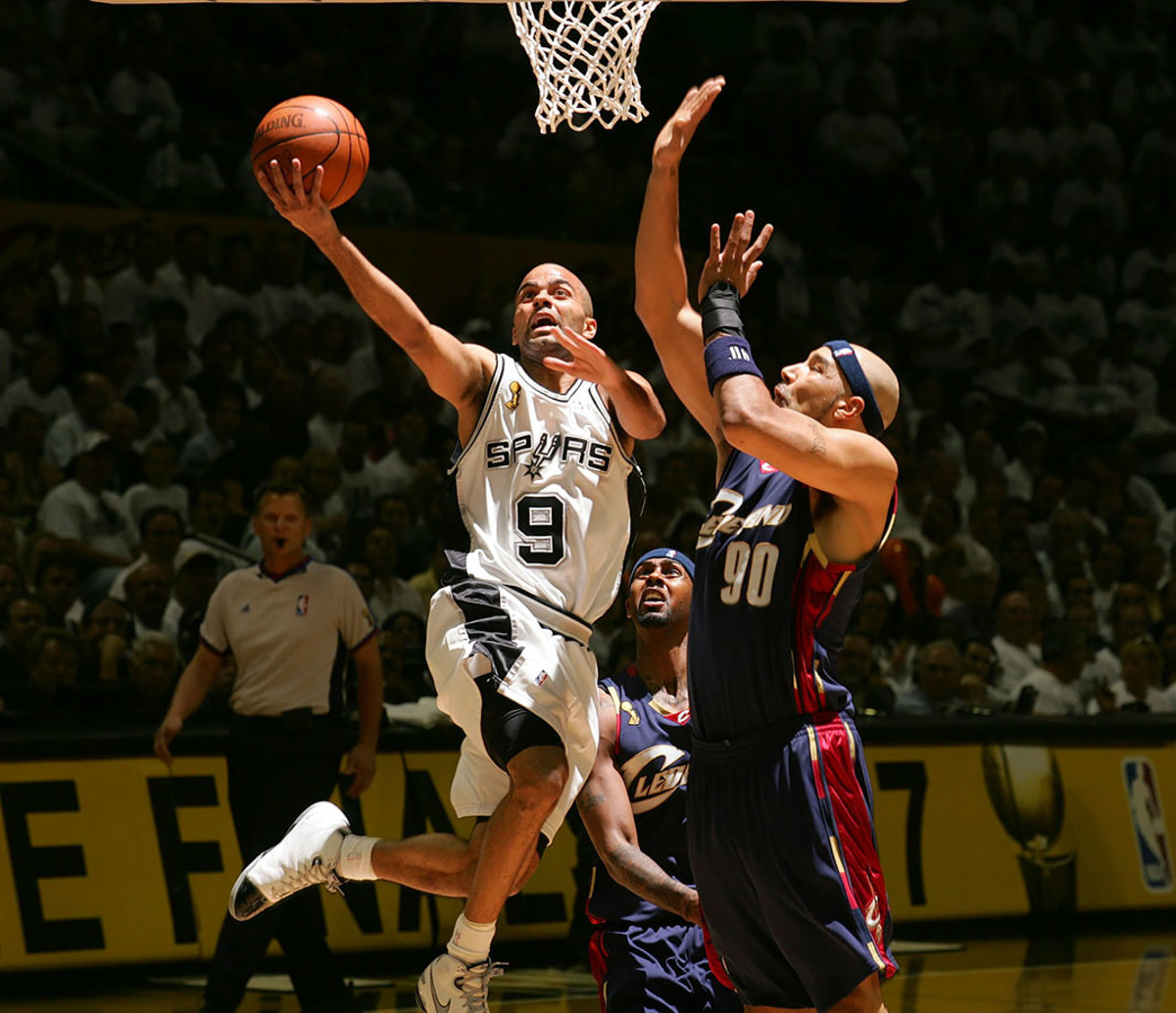
San Antonio's Tony Parker was named Most Valuable Player of the series, averaging 24.5 points per game in the sweep.
2007
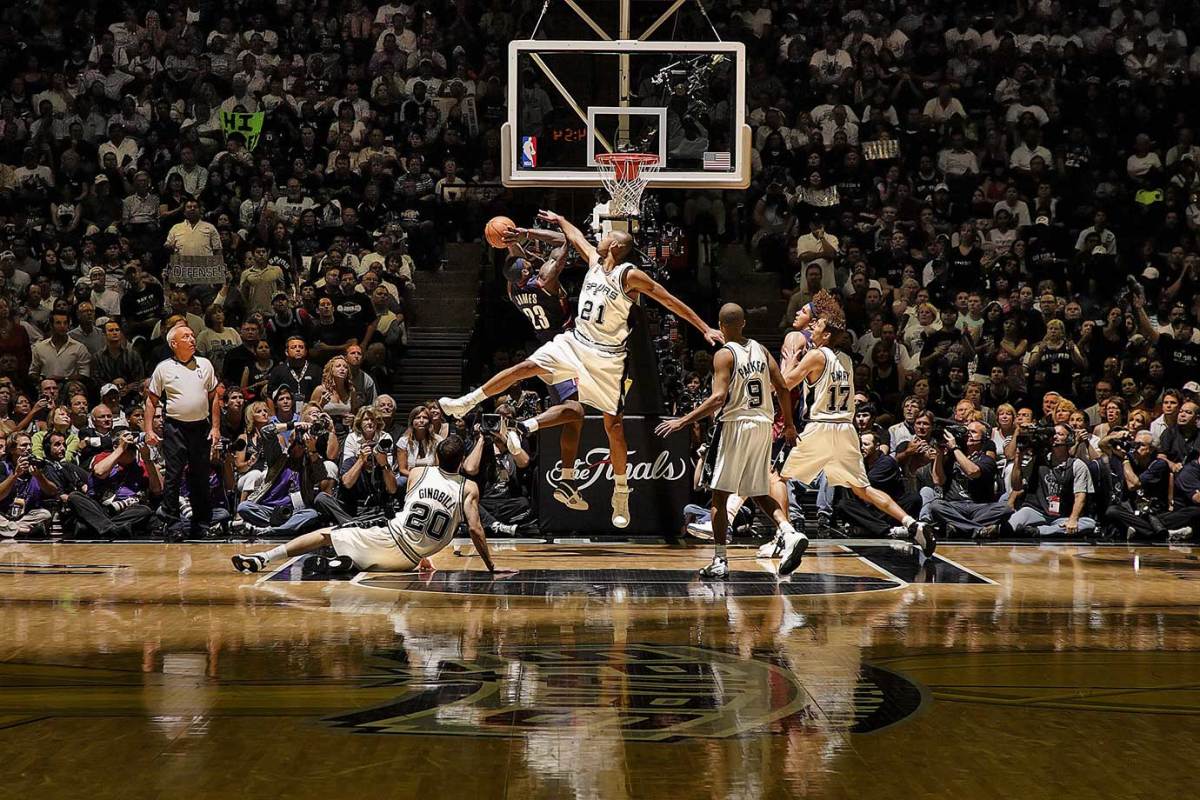
Tim Duncan and the Spurs spoiled LeBron James' first Finals, limiting him to 35.6% shooting and efficiently sweeping the series.
2006
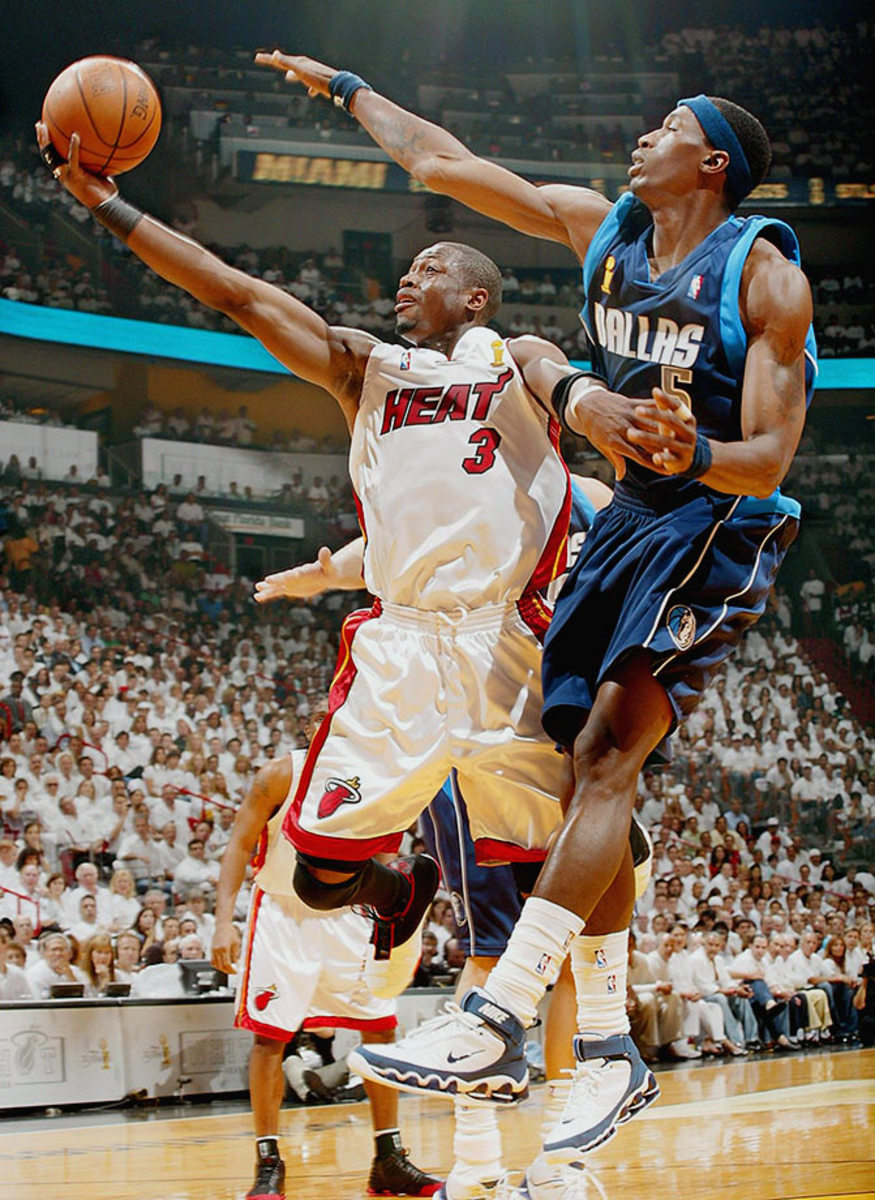
Dwyane Wade, at just 24 years old, catalyzed the Heat past Dallas in six, memorably scoring 42 points and leading a comeback from a 13-point deficit with six minutes left in Game 3. The series marked Wade's arrival as a superstar, as he averaged nearly 35 points and eight rebounds per game to lead Miami to its first title.
2005
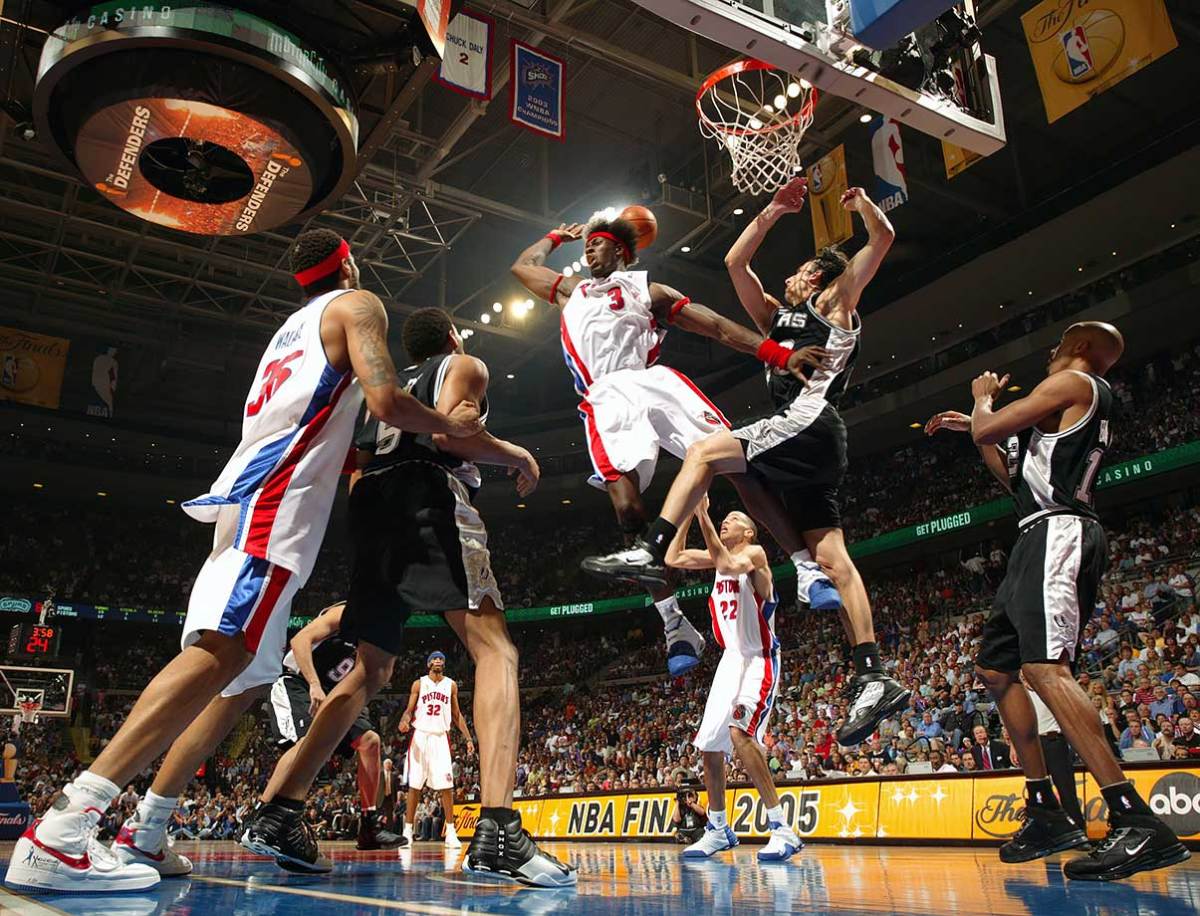
Ben Wallace and Manu Ginobili battle for a loose ball in Game 5 between the Pistons and Spurs. The past two NBA champs traded blows in a tough series that went seven games, with San Antonio coming out on top.
2005
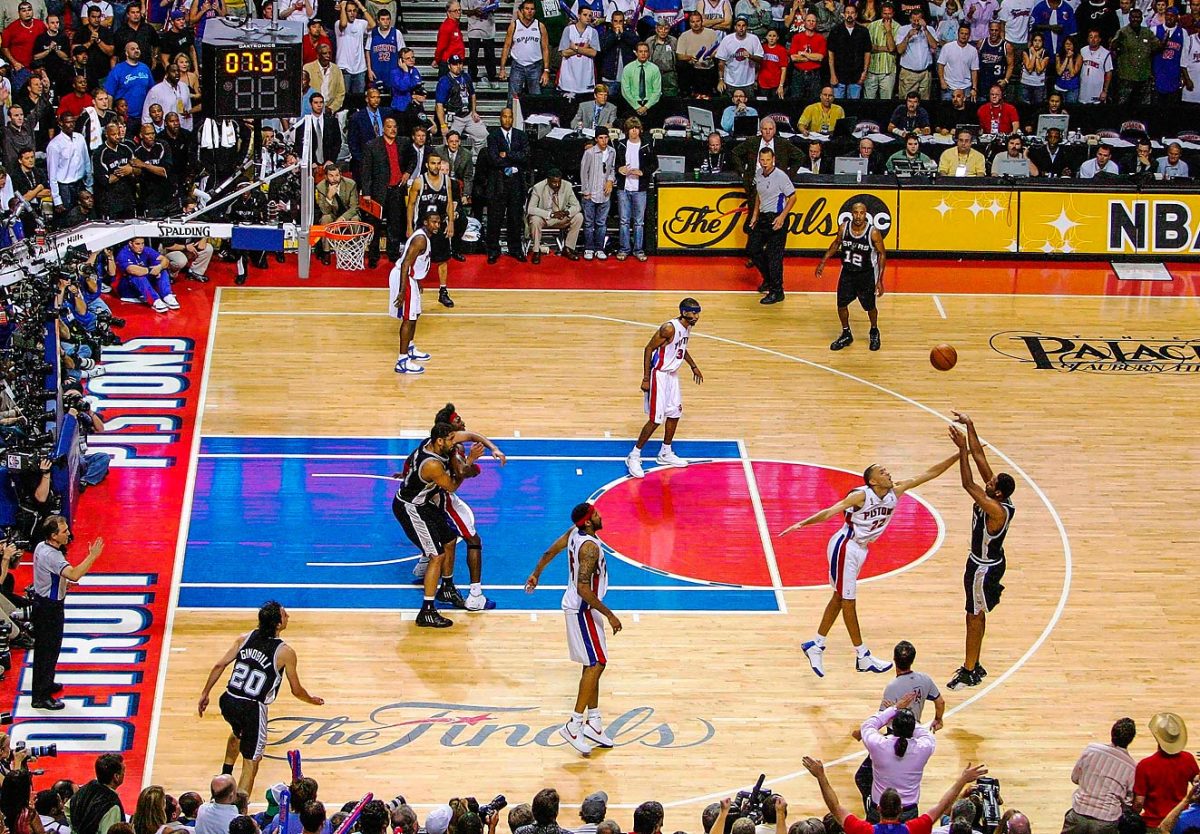
Robert Horry, better known as "Big Shot Rob," buries the three to win Game 5 for San Antonio.
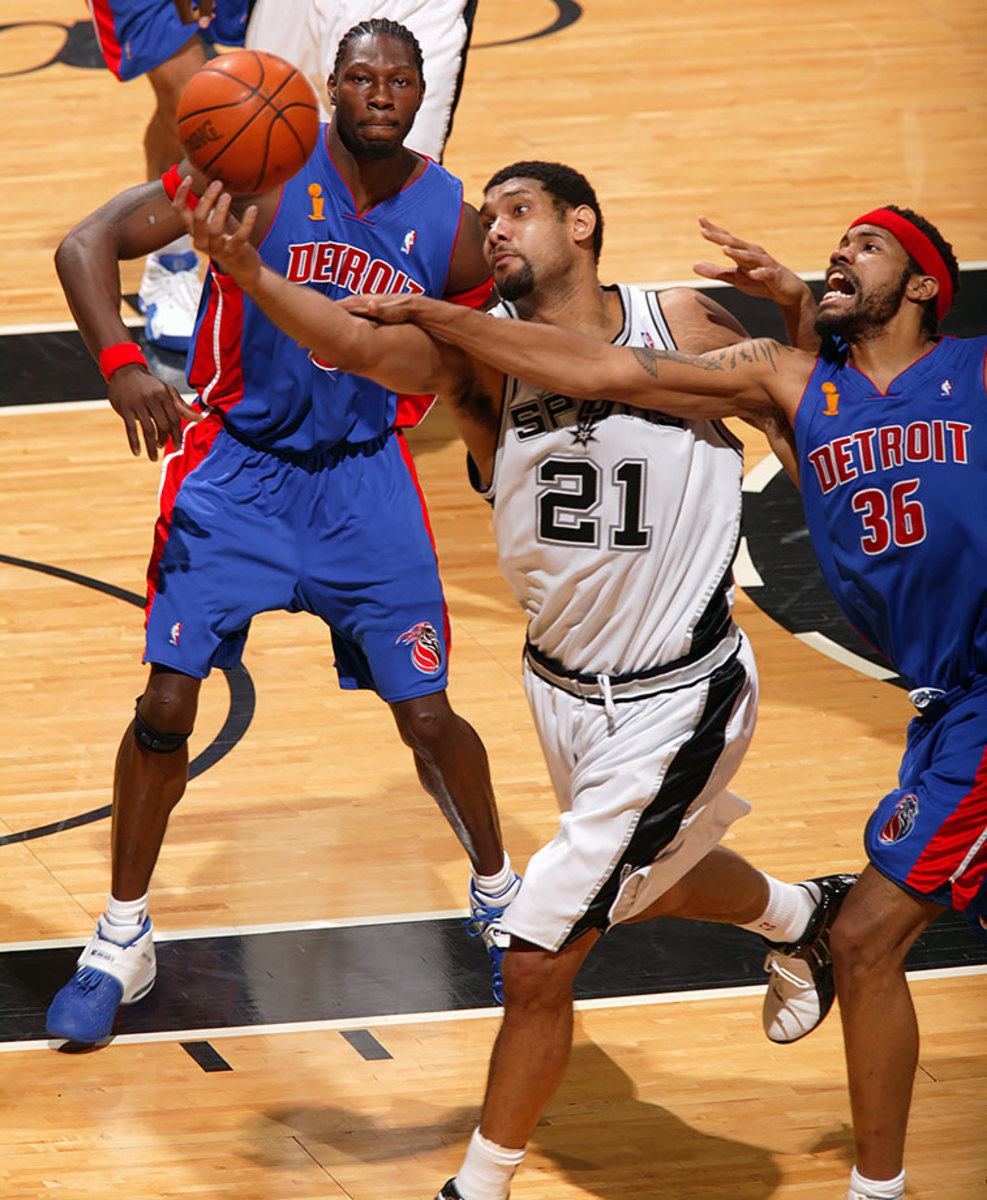
Tim Duncan drives to basket against Rasheed Wallace in Game 7 between the Spurs and Pistons. Duncan scored a game-high 25 points and 11 rebounds as he led San Antonio to their third title and won his third Finals MVP award.
2004
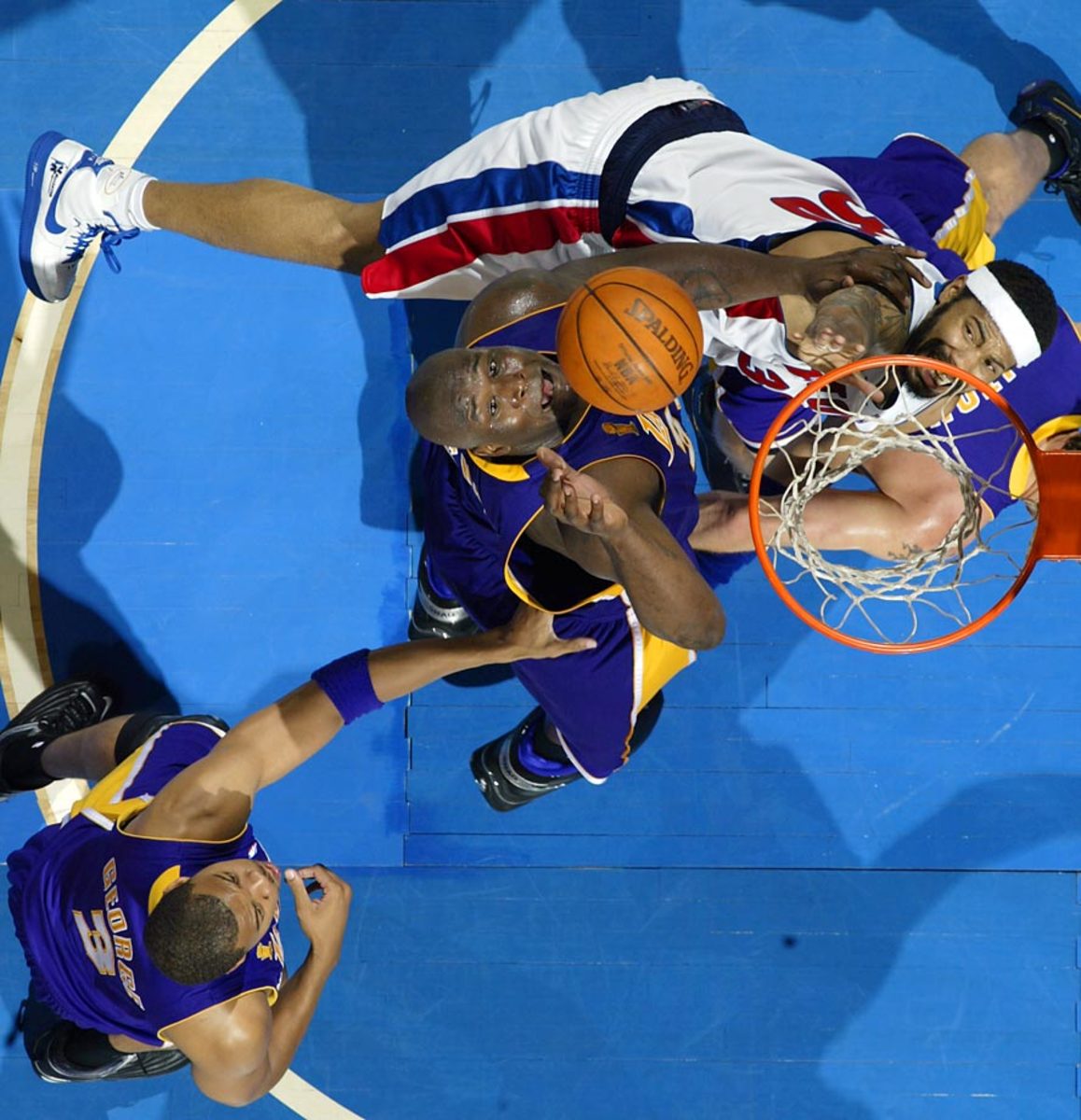
Shaquille O'Neal of the Lakers and Rasheed Wallace of the Pistons grapple for a rebound. Detroit impressively dispatched L.A.'s O'Neal-Kobe Bryant tandem in five games.
2004
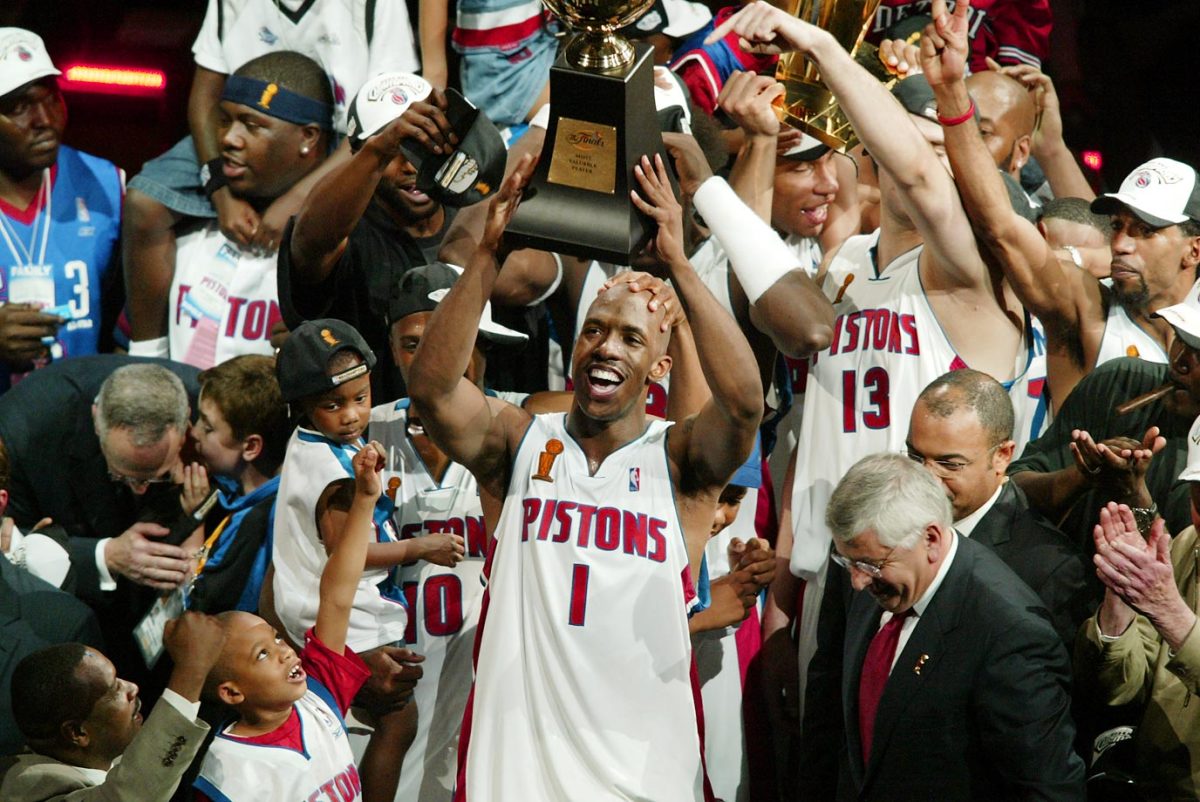
Chauncey Billups hoists the trophy as the Pistons celebrate their championship. With a penchant for making shots in critical moments, Billups was named Finals MVP.
2003
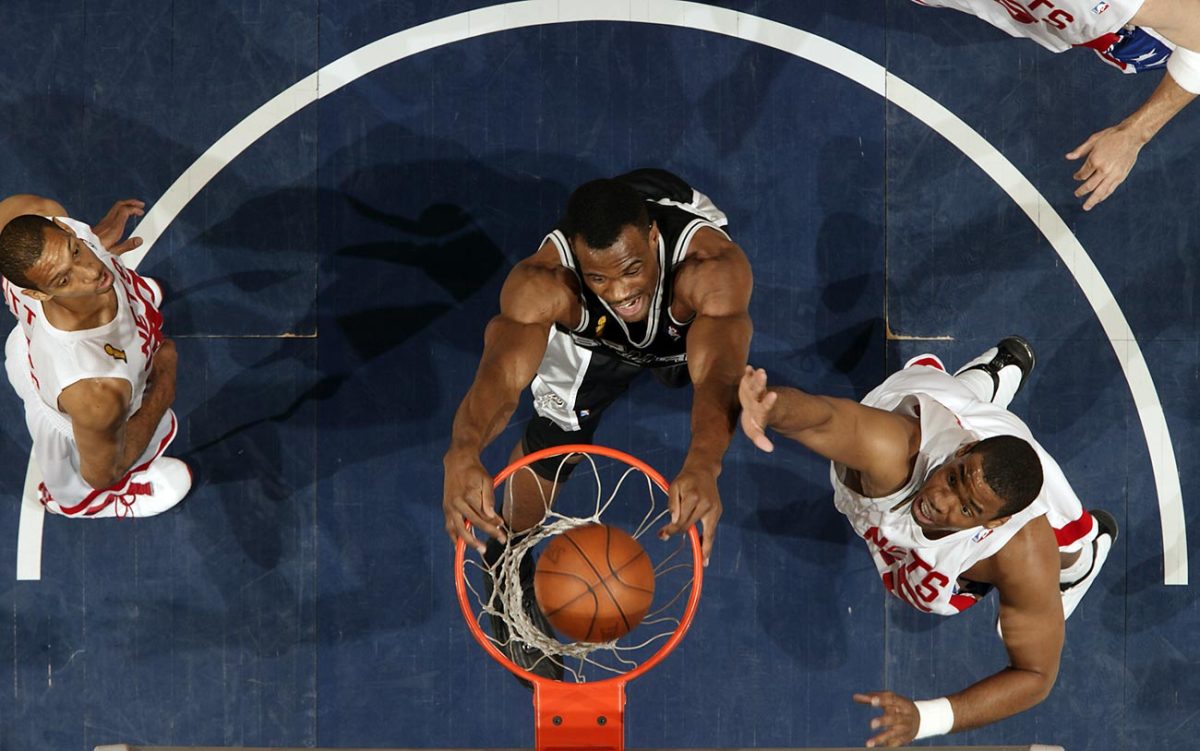
David Robinson of the Spurs dunks on Jason Collins of the Nets in Game 5. San Antonio took the series in six games, with Robinson teaming up with the core of Tim Duncan, Tony Parker and Manu Ginobili winning their first title together.
2003
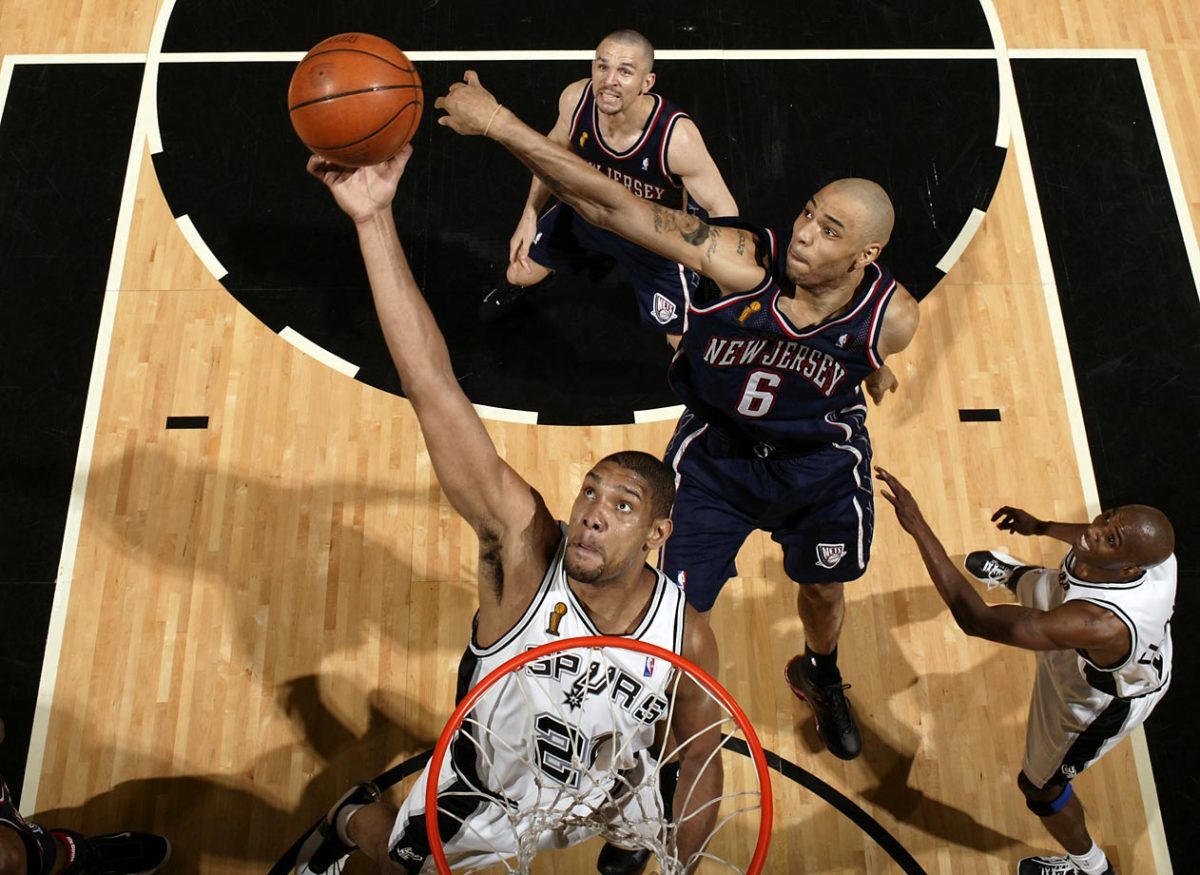
Finals MVP Tim Duncan came up huge for San Antonio in the Game 6 series-clincher with 21 points, 20 boards, 10 assists and eight blocks.
2002
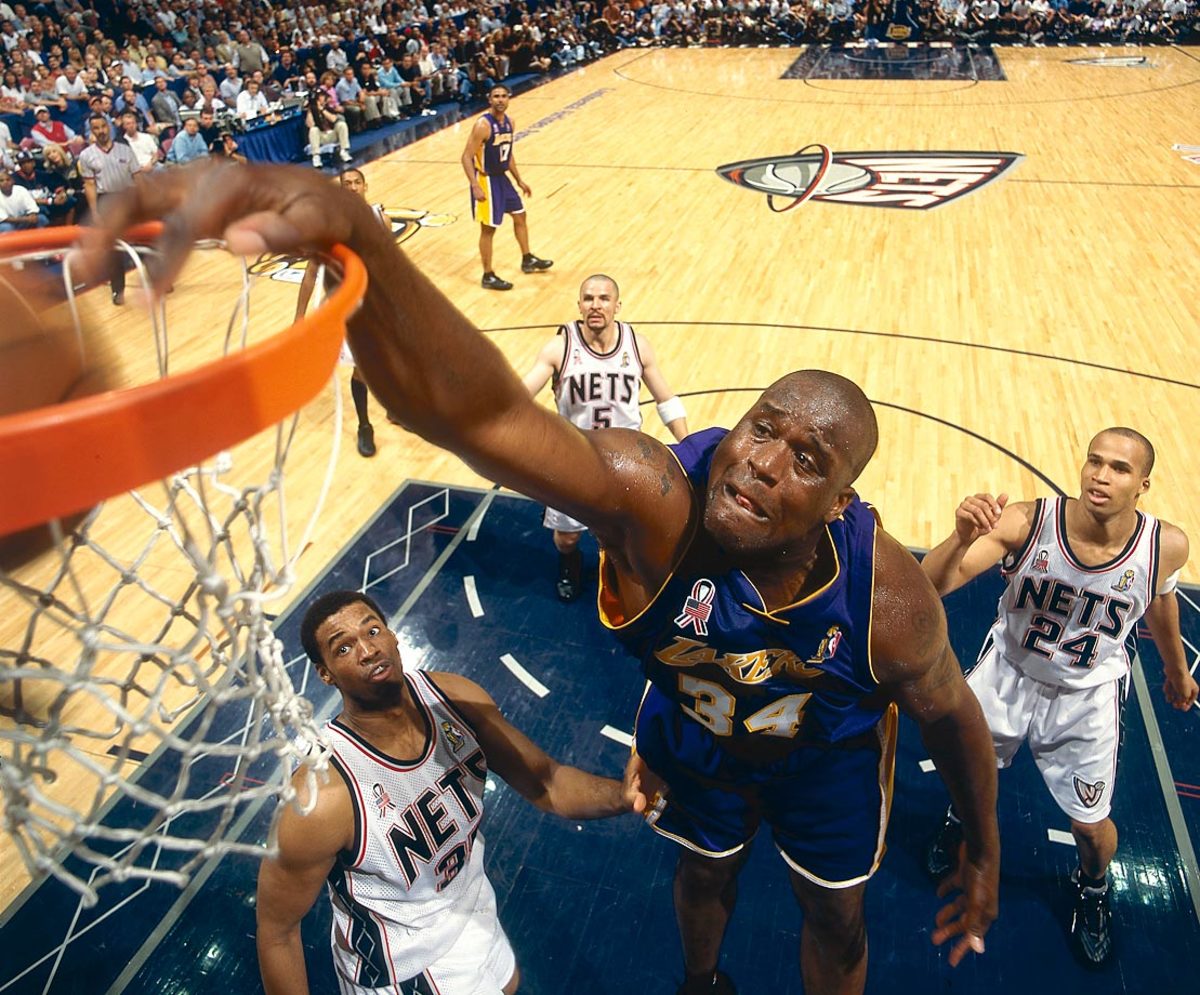
Shaquille O'Neal and the Lakers blew away the Jason Kidd-led Nets in a four-game sweep. O'Neal averaged more than 36 points per game as L.A. took home a third straight title.
2001
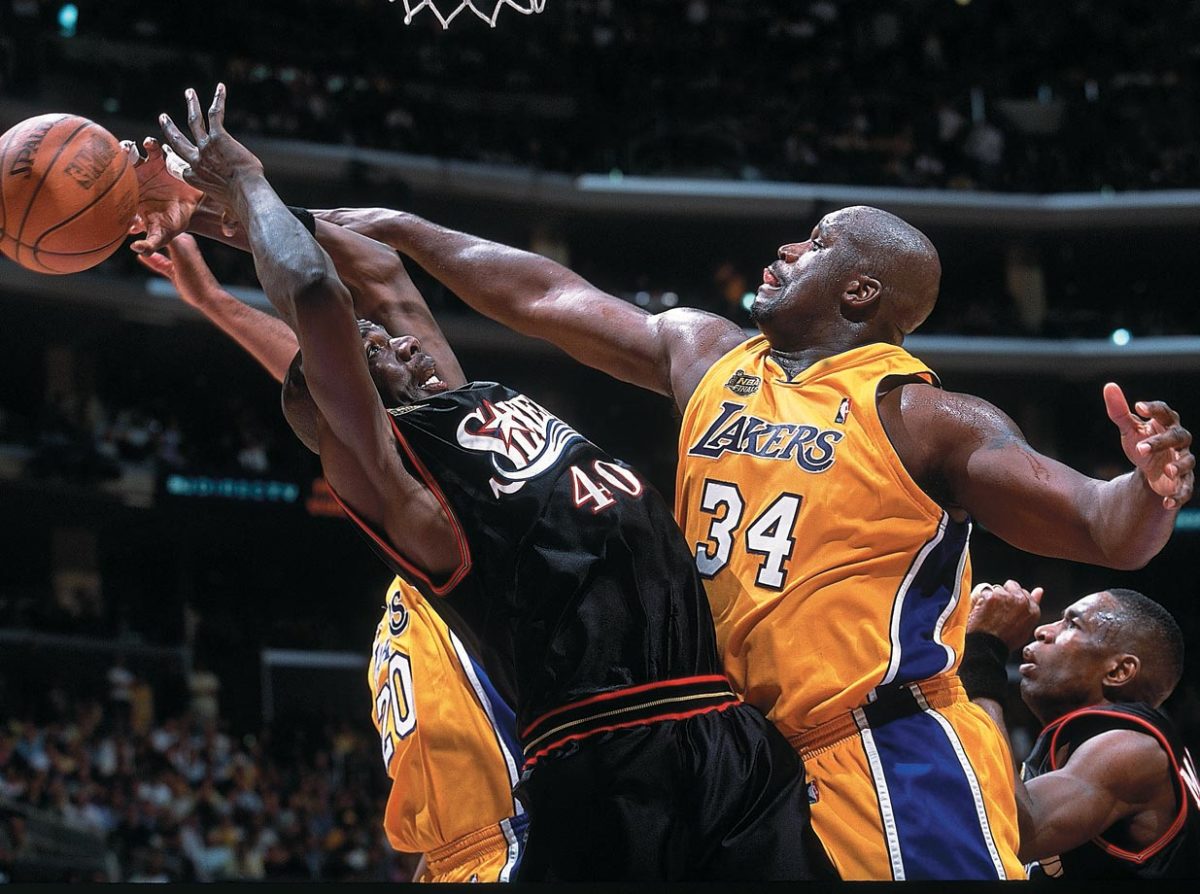
Shaquille O'Neal was simply too much for Philadelphia to handle in the series, winning his second straight Finals MVP honors and contributing a near quadruple-double in Game 2 with 28 points, 20 rebounds, nine assists and eight blocks.
2001
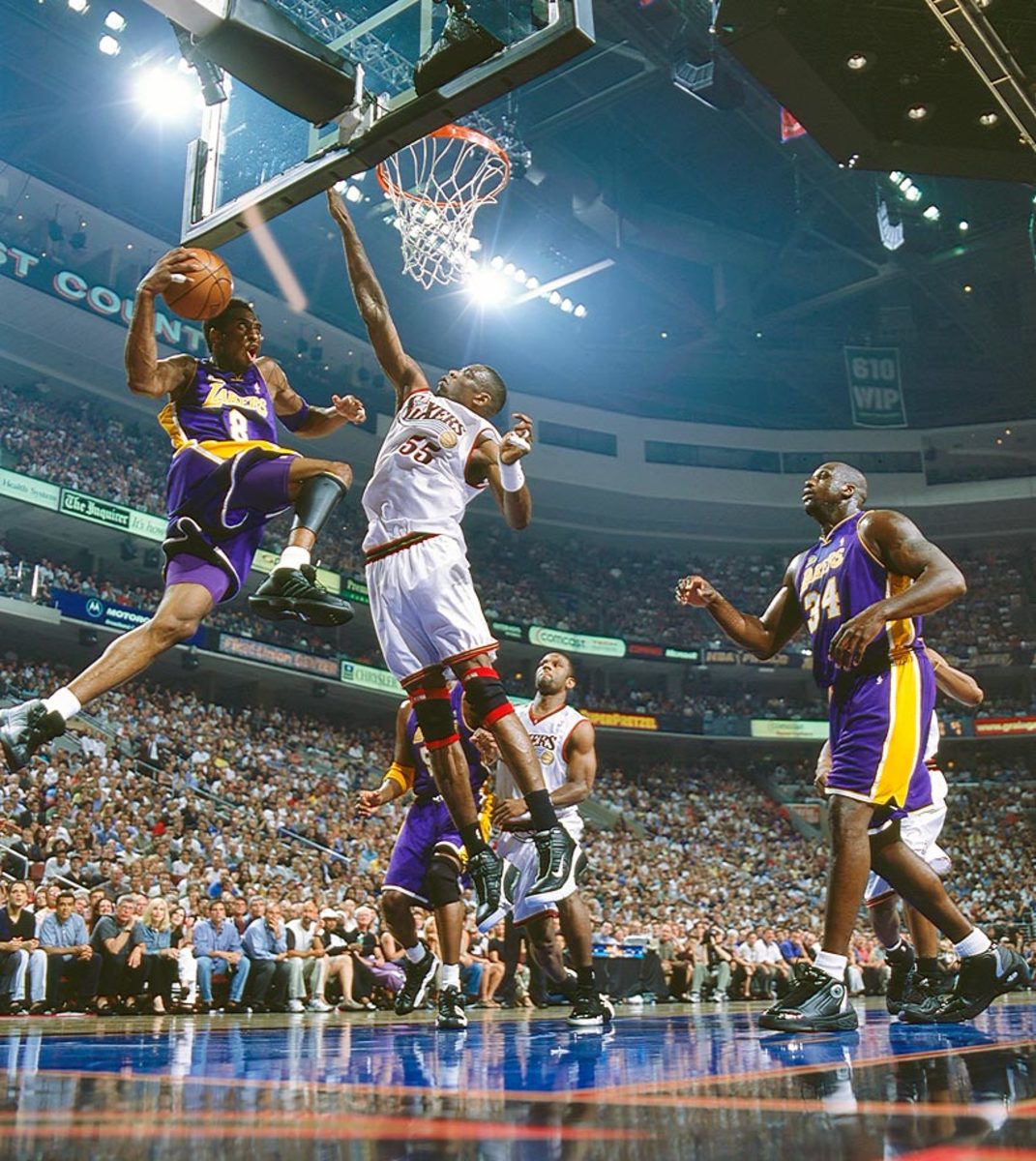
Kobe Bryant of the Lakers avoids 76ers center Dikembe Mutombo in Game 4. Though still overshadowed by Shaquille O'Neal, the 22-year-old Bryant continued to shine in his own right, averaging nearly 25 points for the series.
2001
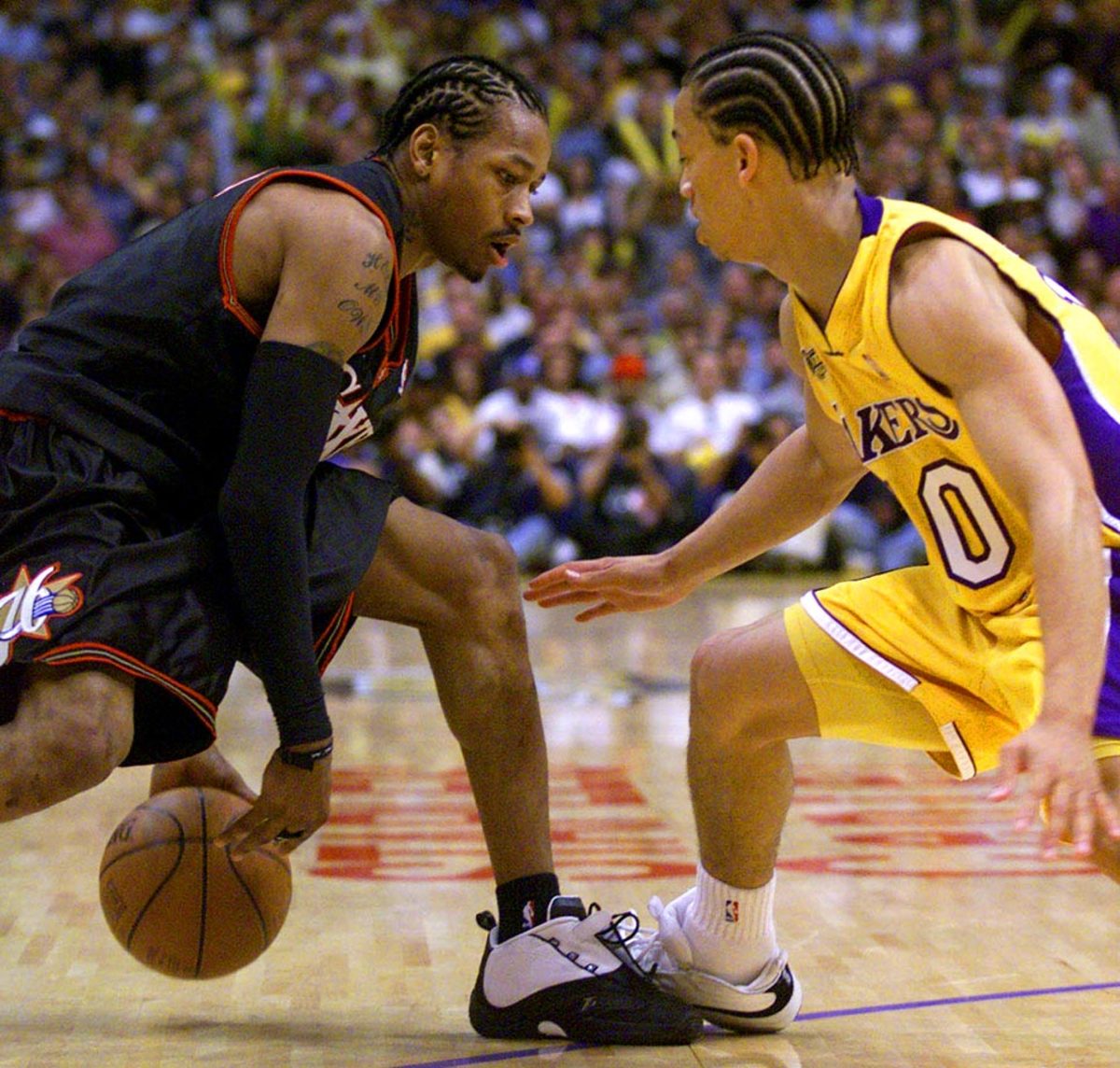
Sixers guard Allen Iverson dribbles the ball against Tyronn Lue of the Lakers during Game 1. Bolstered by the dynamic Iverson's 48 points, Philadelphia pulled off an upset, 107-101.
2000
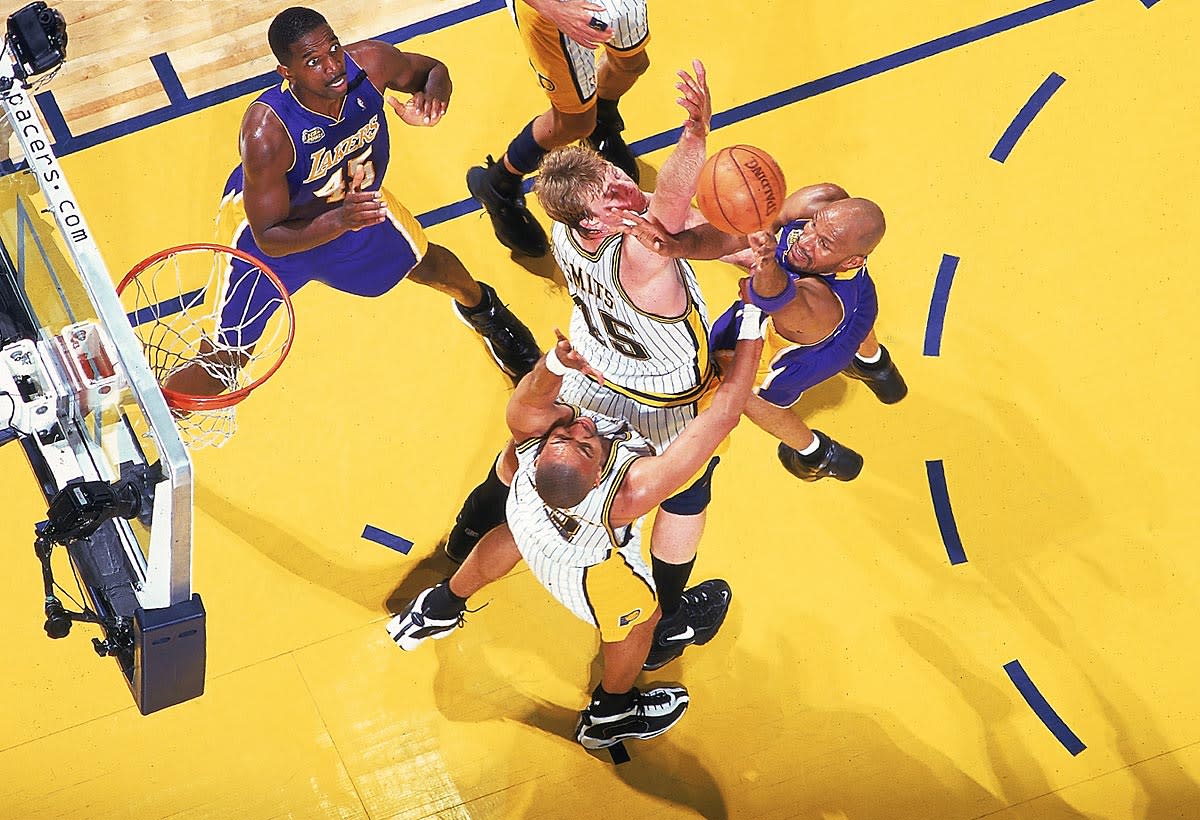
Ron Harper of the Lakers shoots over Pacers center Rik Smits in Game 4.
2000
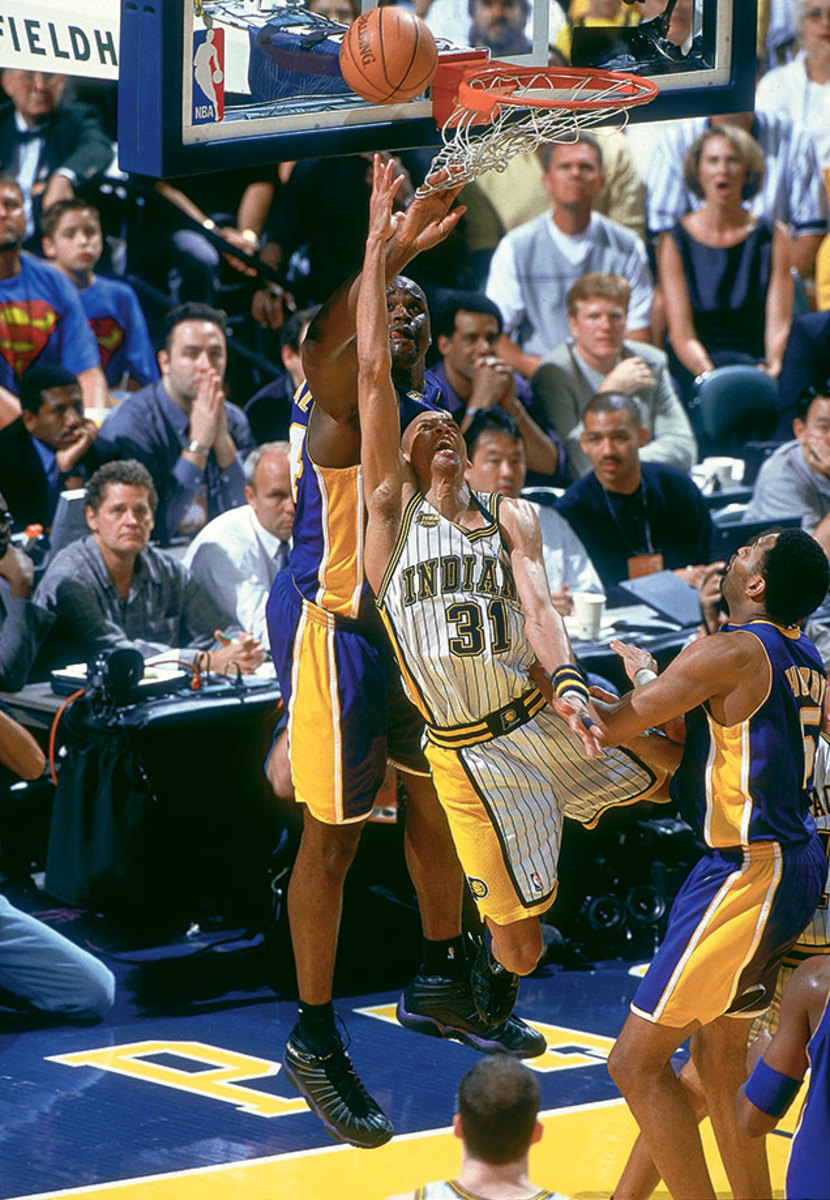
Reggie Miller averaged more than 24 points per game, but couldn't shoot Indiana past Shaq and the Lakers in what would be the only Finals appearance of his career.
2000
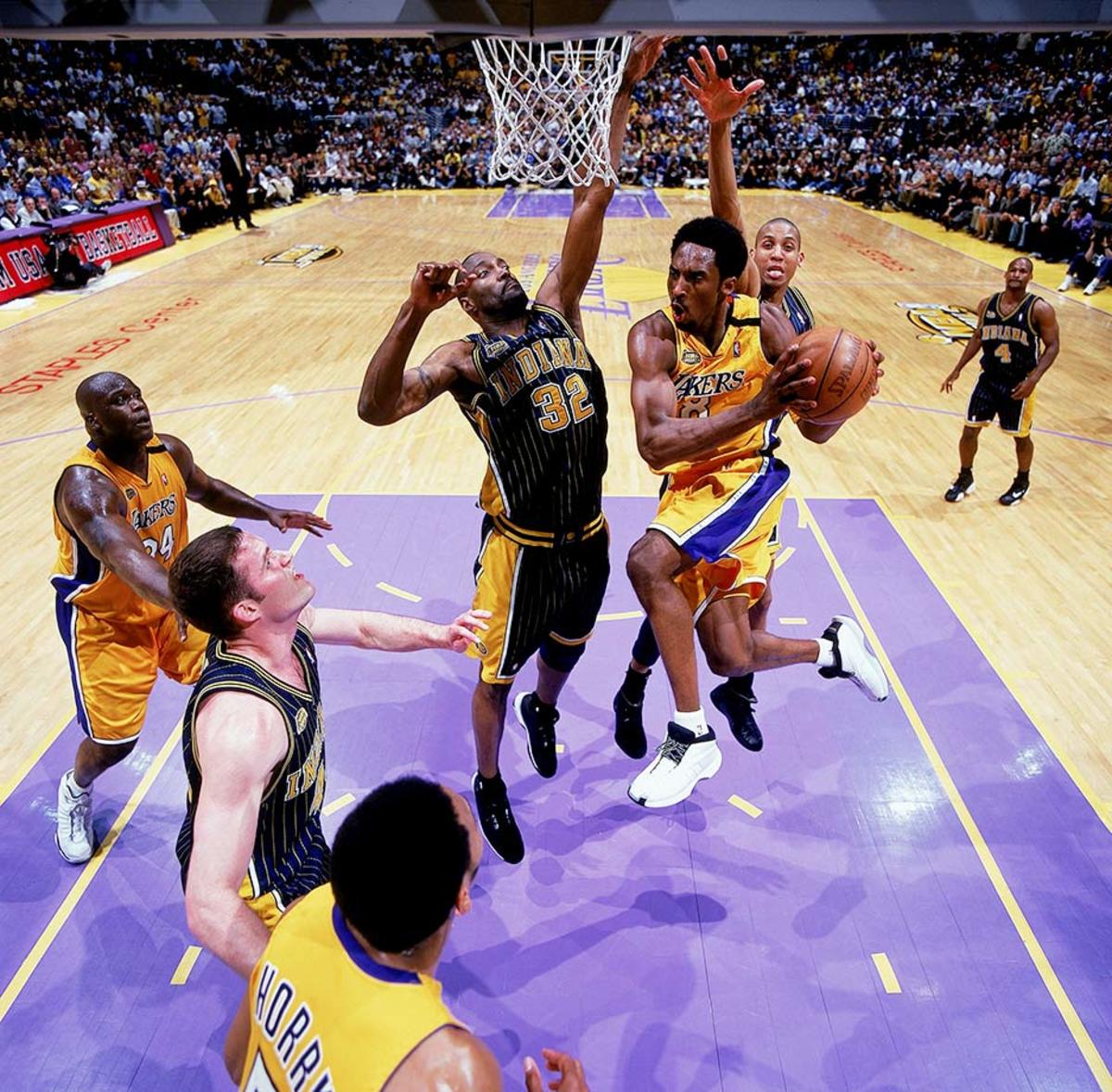
Kobe Bryant drives to the basket against Dale Davis and Reggie Miller in Game 6 between the Lakers and Pacers.
2000
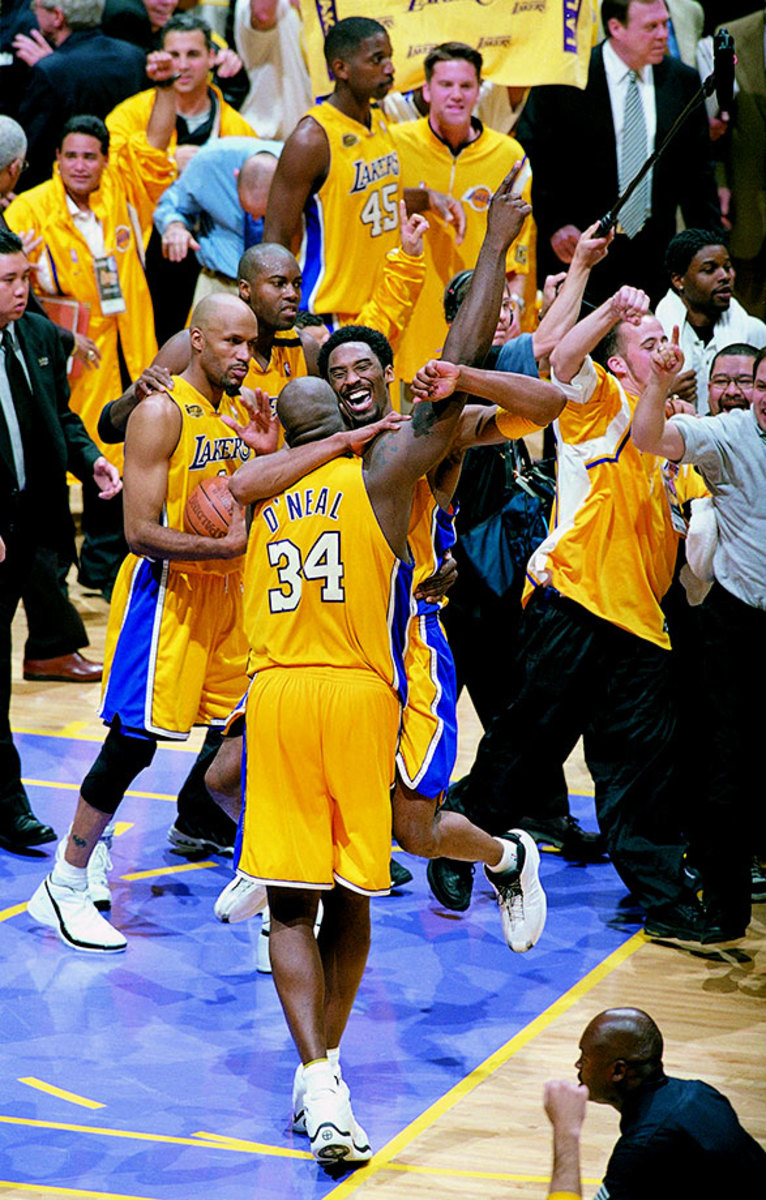
Shaq and Kobe celebrate after winning Game 6 against the Pacers for the championship.
1999
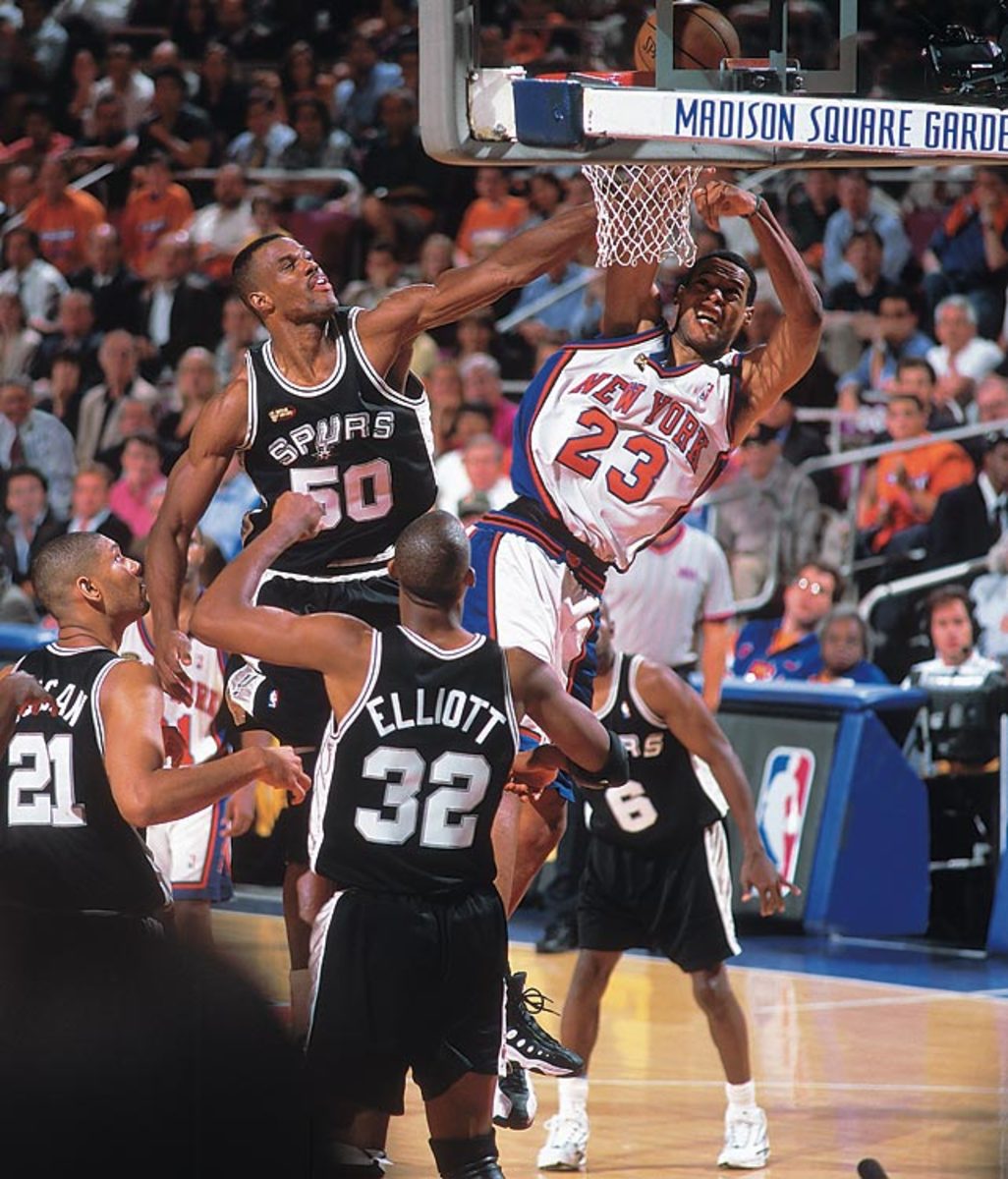
Spurs center David Robinson blocks Marcus Camby of the Knicks in Game 4. San Antonio, led by Robinson and a young Tim Duncan, took up the mantle post-Jordan and defeated the Knicks in five games for its first title.
1999
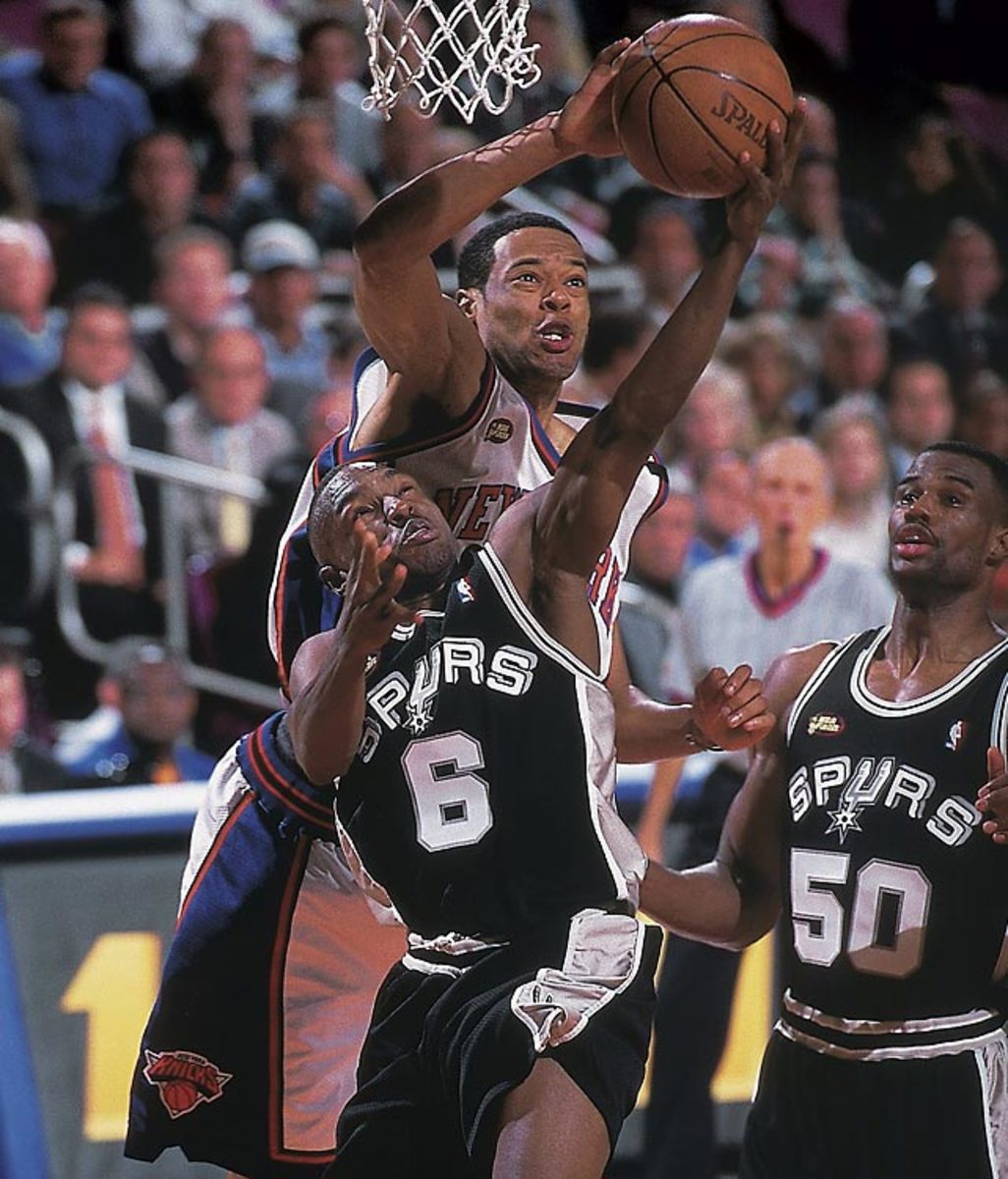
Marcus Camby of the Knicks blocks Spurs guard Avery Johnson in Game 3. Johnson would have the last laugh, hitting a last-minute shot to close out New York in Game 5.
1998
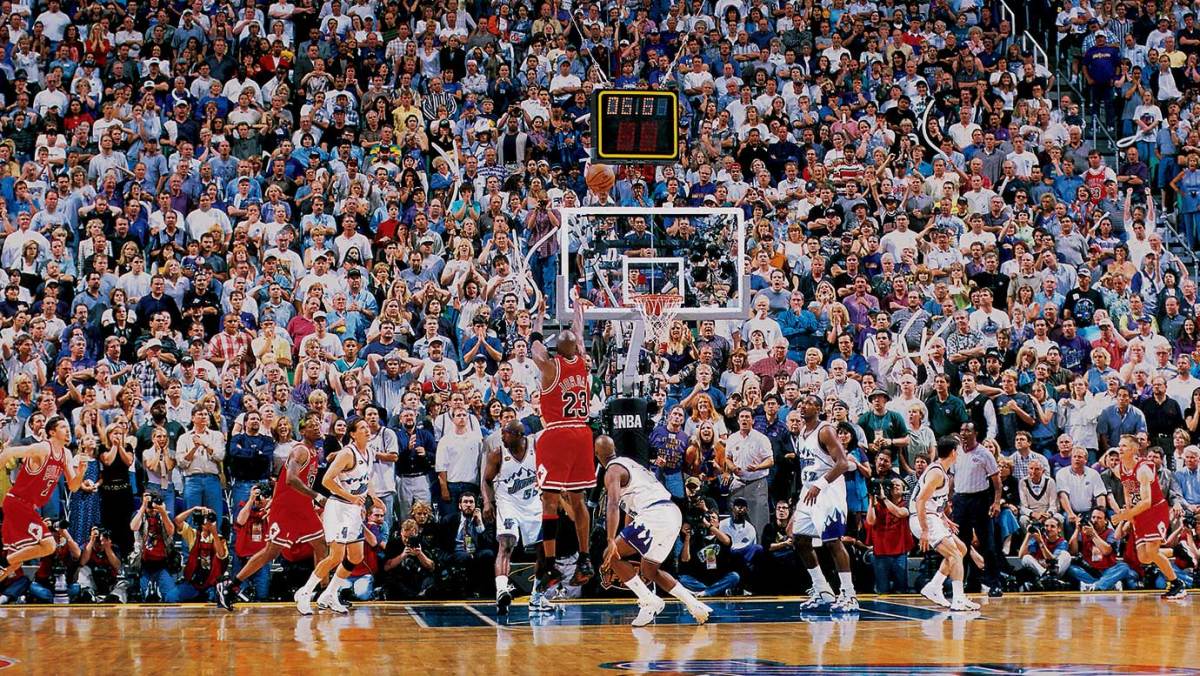
Michael Jordan drains the game-winning jumper over Bryon Russell of the Utah Jazz in Game 6. It would be MJ's last shot as a Bull, but not his last in the NBA — he unretired, of course, in 2001.
1997
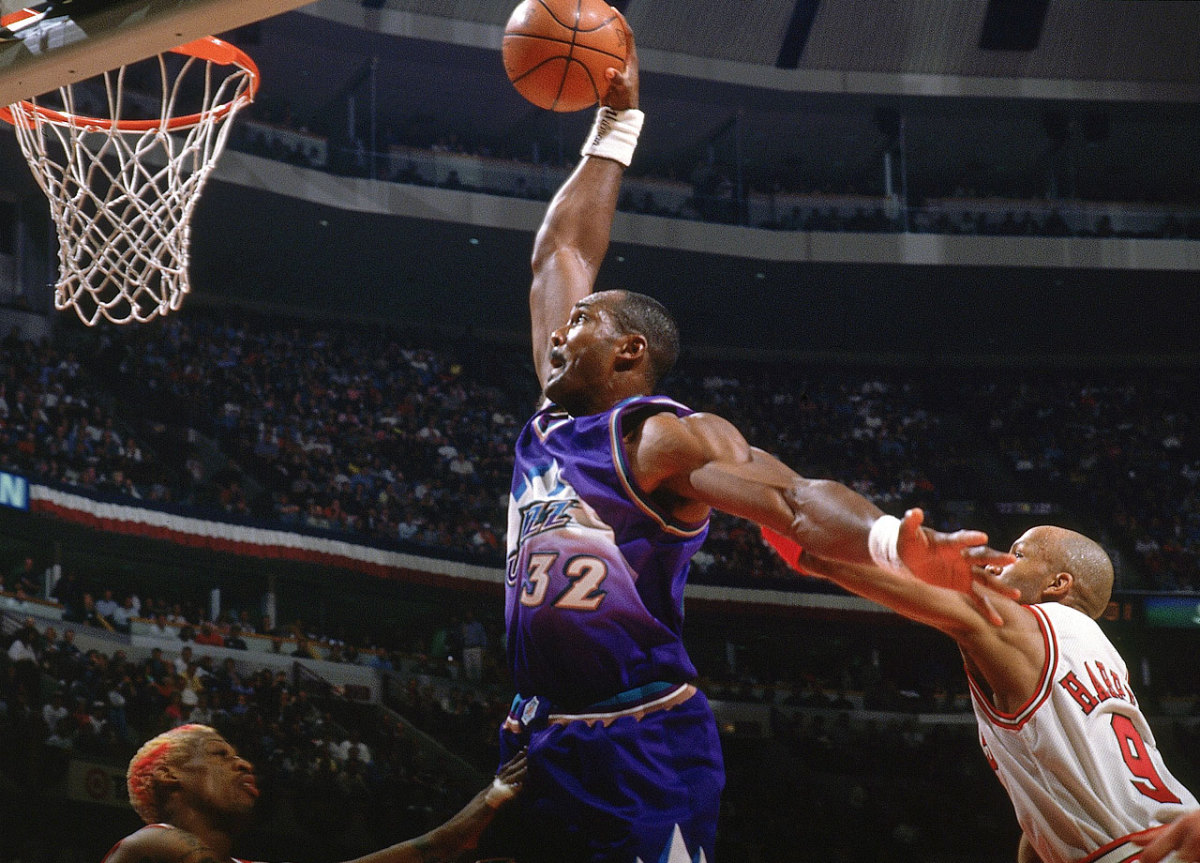
Karl Malone of the Jazz dunks over Dennis Rodman and Ron Harper of the Bulls in Game 1. Malone and point guard John Stockton posed a challenge to the Bulls with their efficiency, but Michael Jordan and company found ways to win yet again.
1997
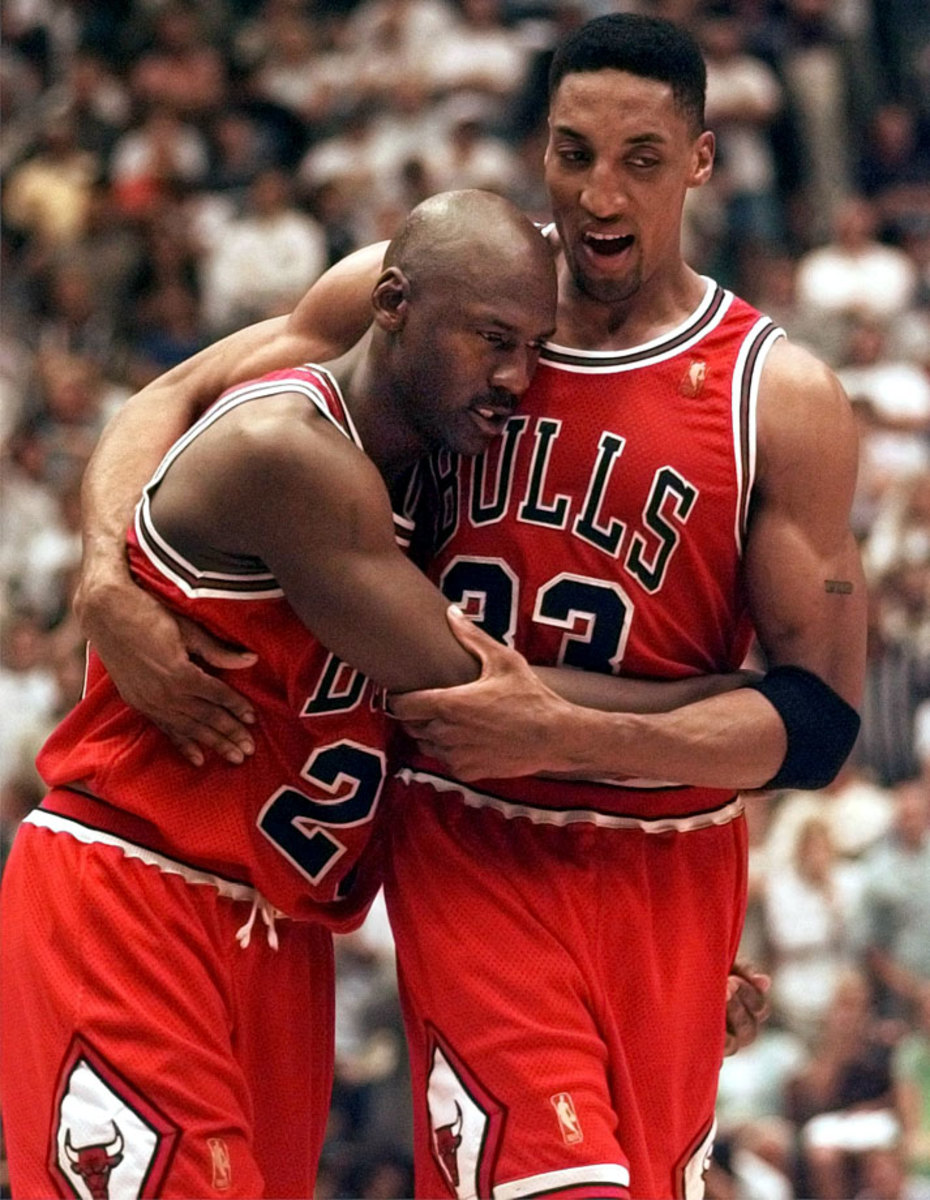
Game 5, which came to be known as "The Flu Game," saw Michael Jordan compete through severe illness to come up big for Chicago. Jordan brought the Bulls back from a 16-point deficit, improbably scoring 38 points in a 90-88 win after spending much of the past 24 hours confined to his hotel bed. At the end of the game, Jordan collapsed into Scottie Pippen's arms in what became an iconic moment.
1997
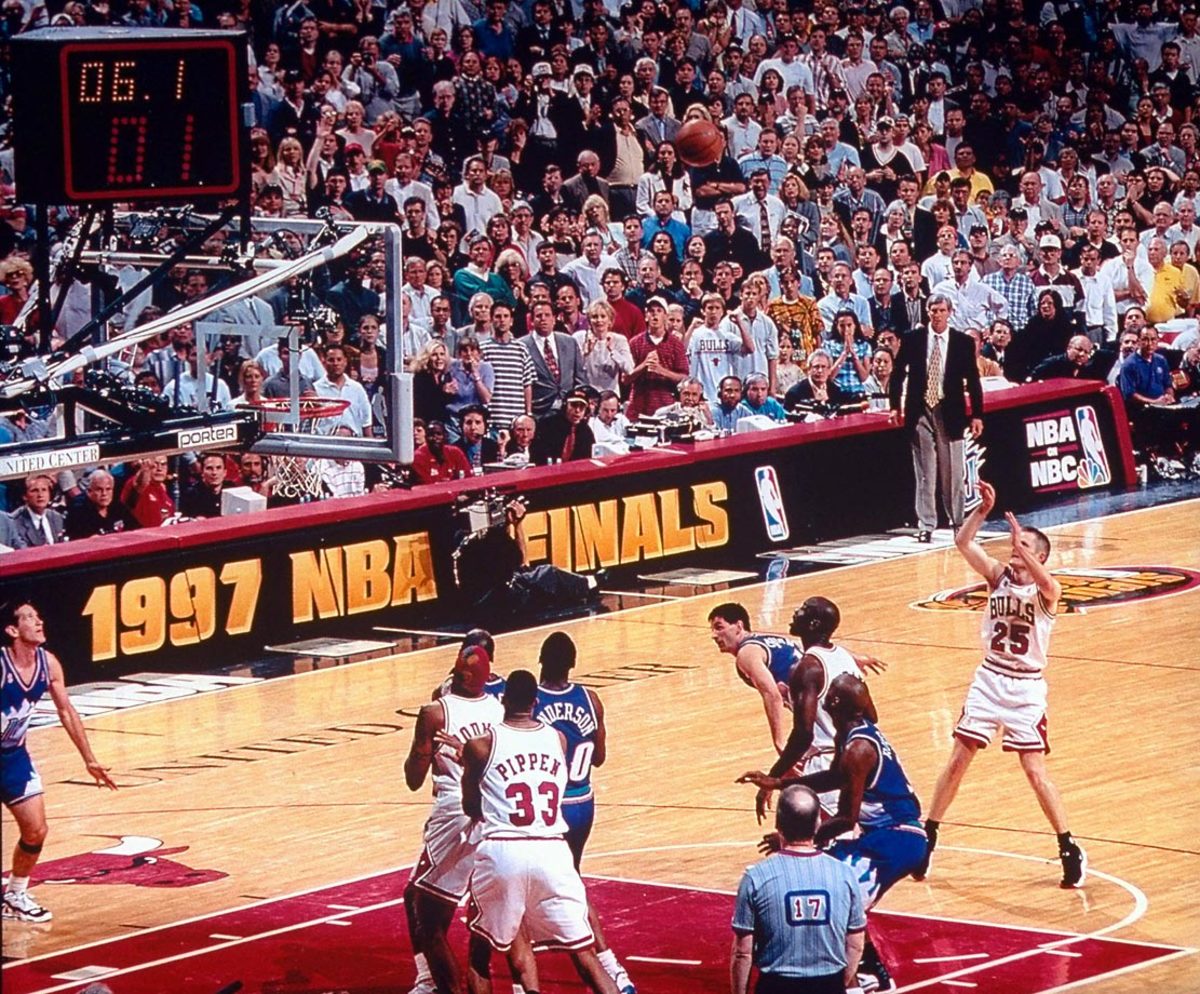
In Game 6, it wasn't Jordan or Pippen (though they combined for 62 points) but rather Bulls guard Steve Kerr who sealed Chicago's fifth title, with a 17-footer.
1996
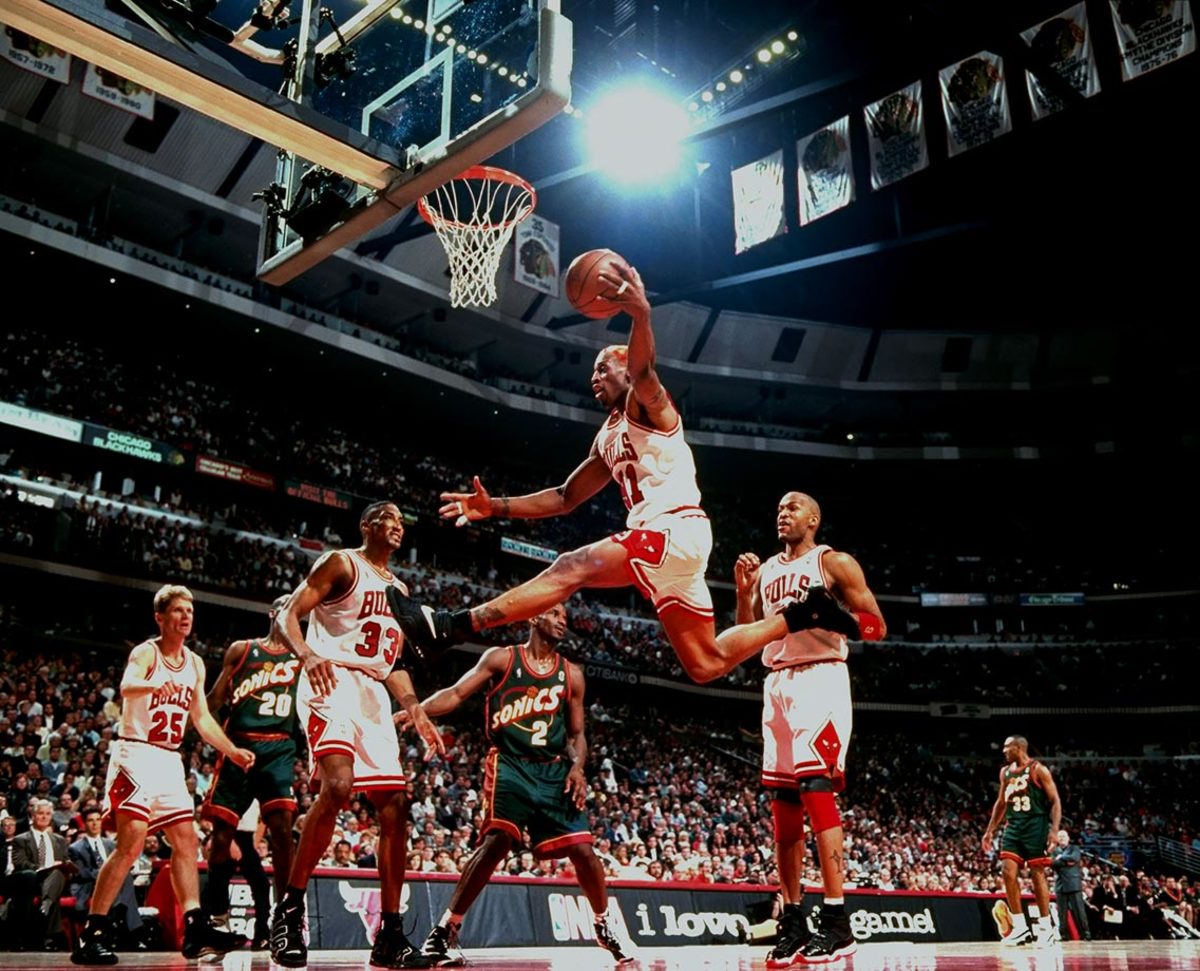
Dennis Rodman grabs a rebound against the Sonics in Game 1. Rodman averaged nearly 14 boards per game in the playoffs for the Bulls, who acquired the power forward from San Antonio before the season.
1996
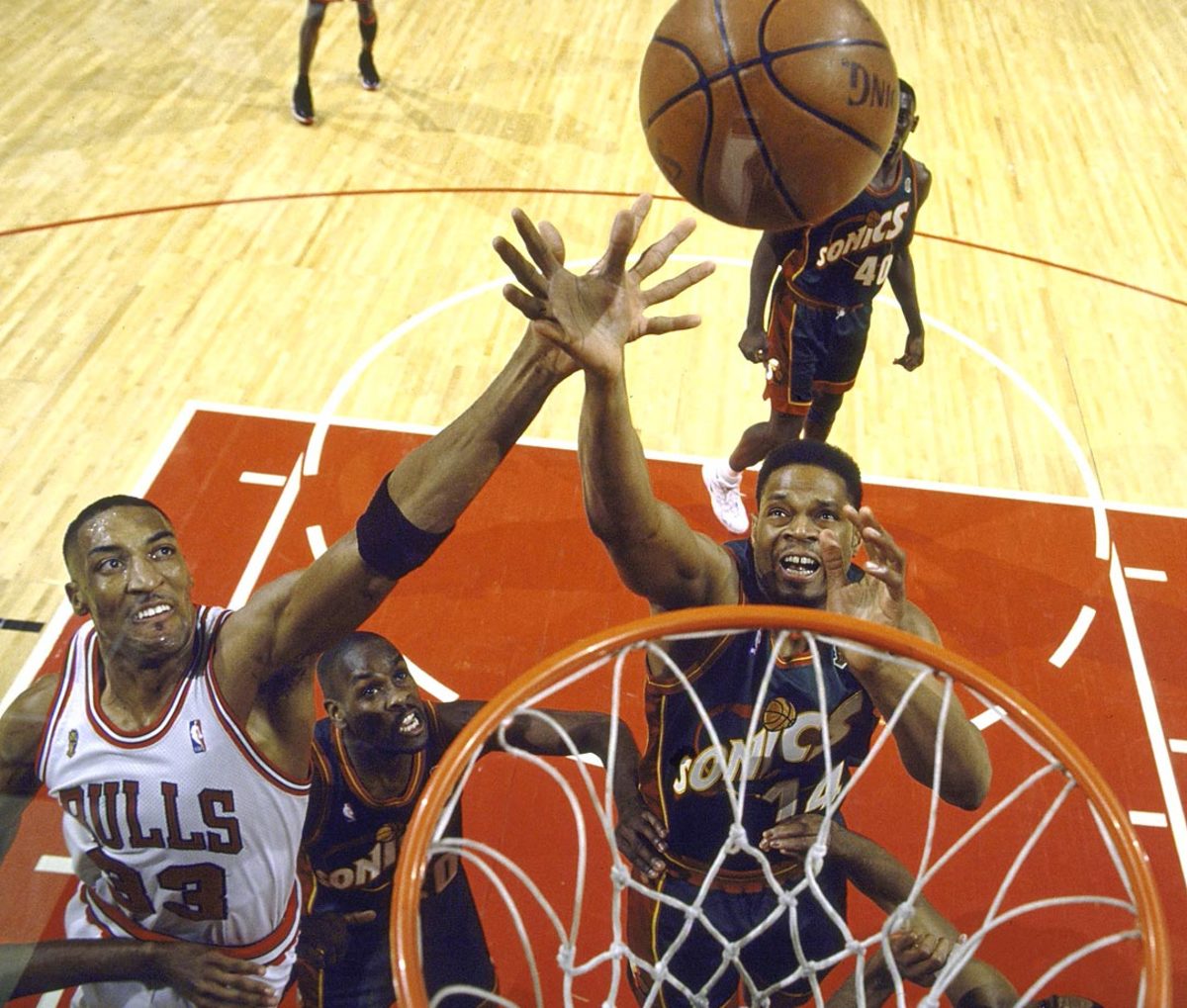
Scottie Pippen of the Bulls and Sam Perkins of the Sonics battle for a rebound. Pippen led Chicago in assists on the series, and the Bulls took their fourth championship, emboldened by Jordan's return from a two-year retirement.
1995
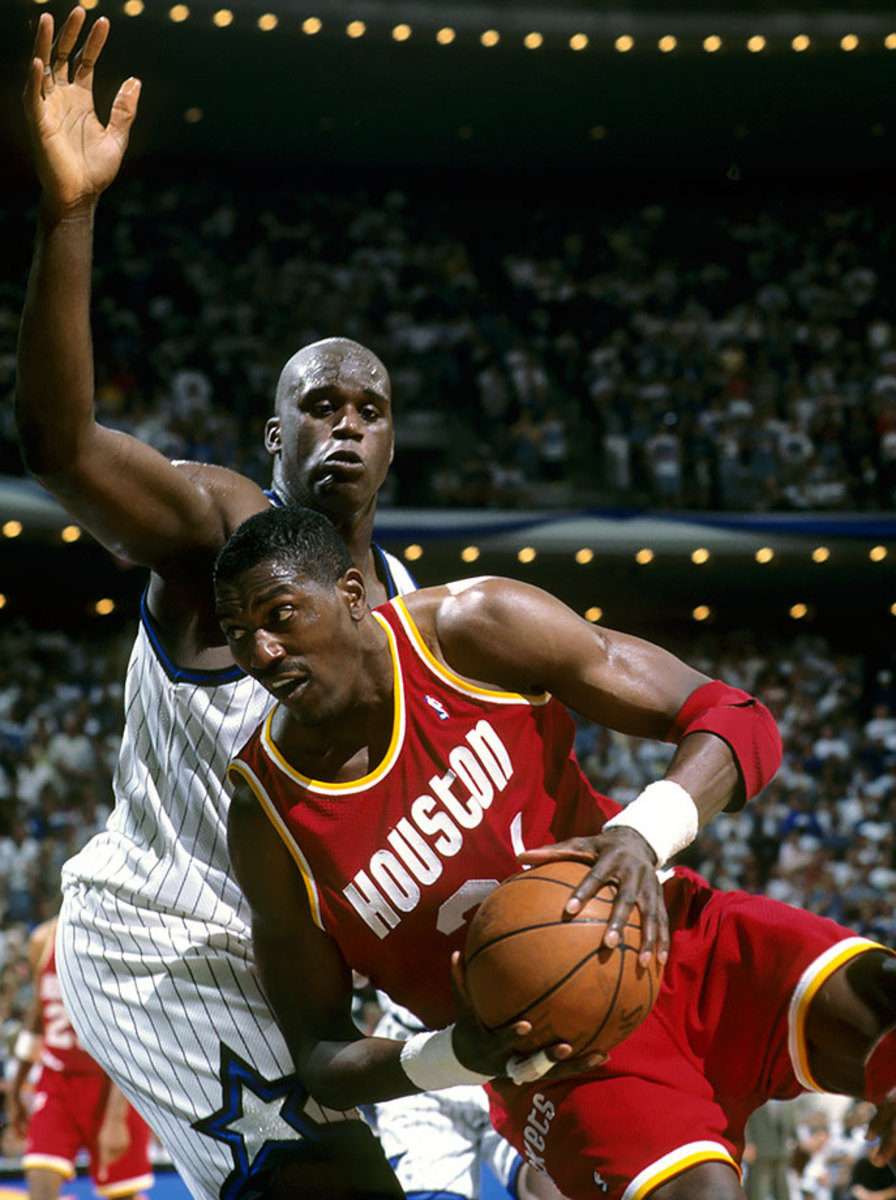
Hakeem Olajuwon averaged nearly 33 points on the series to bolster the Rockets to a second straight title in a four-game sweep.
1995
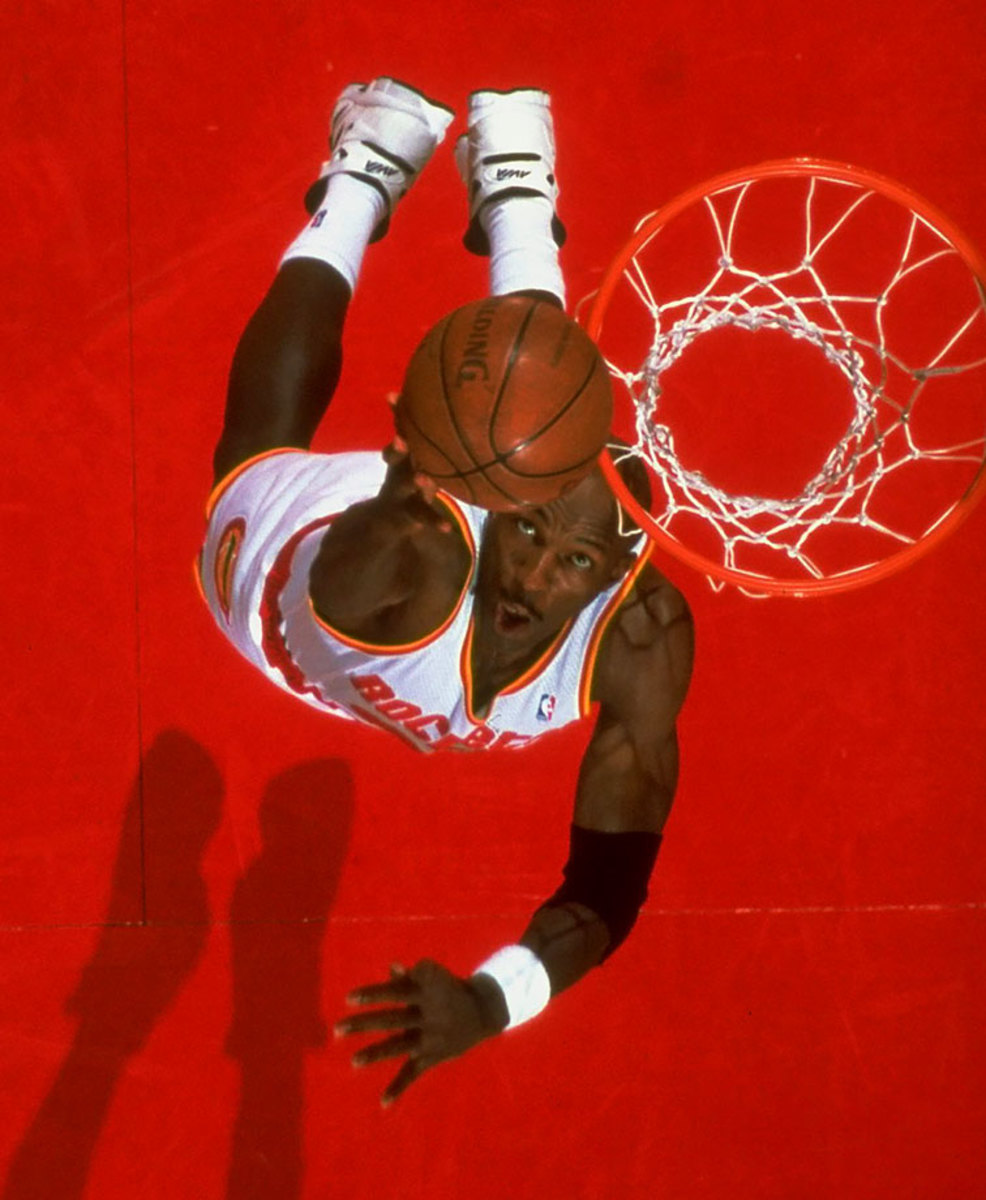
Clyde Drexler scored 25 points in a Game 3 win that all but sealed the series.
1994
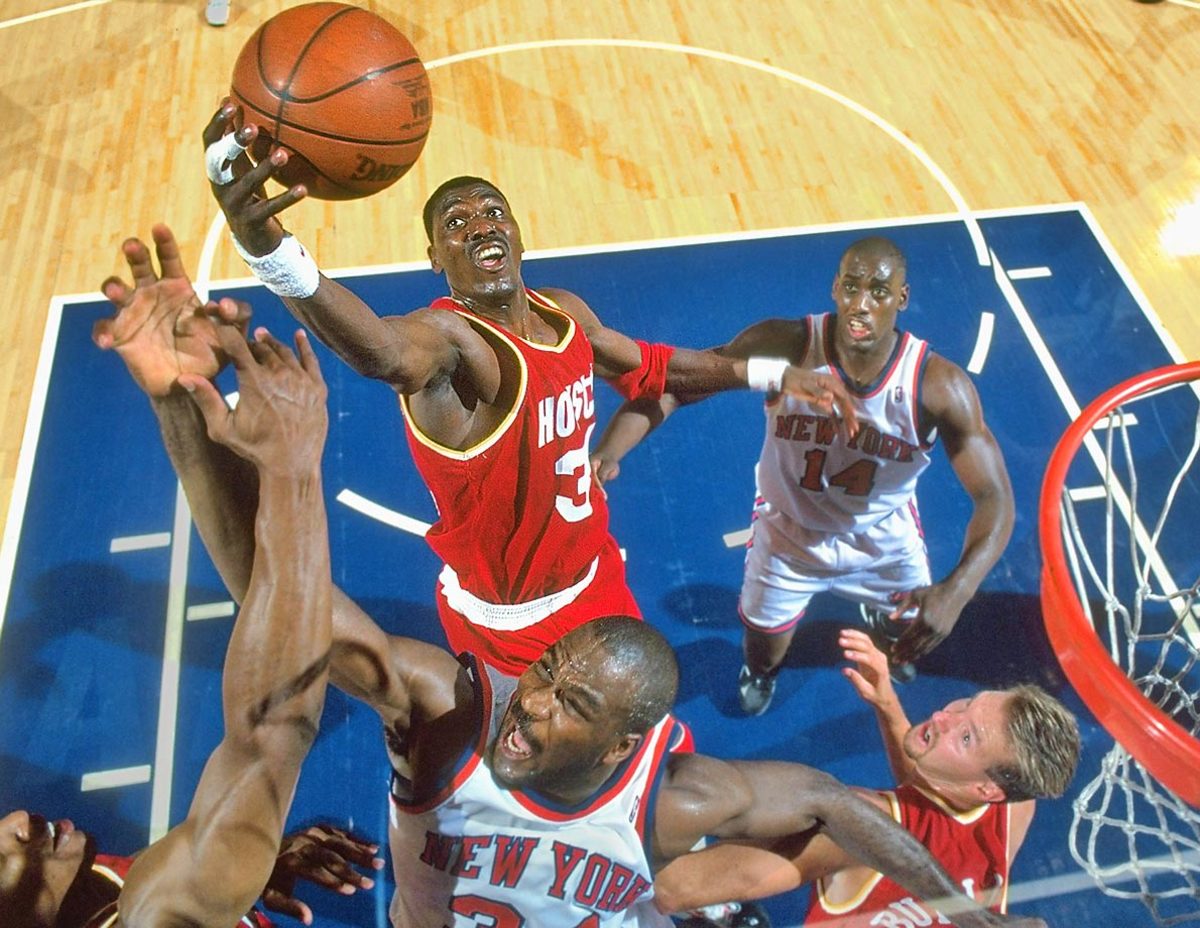
Hakeem Olajuwon was named Finals MVP, averaging nearly 33 points for the series to bolster the Rockets to their first title, in a four-game sweep.
1994
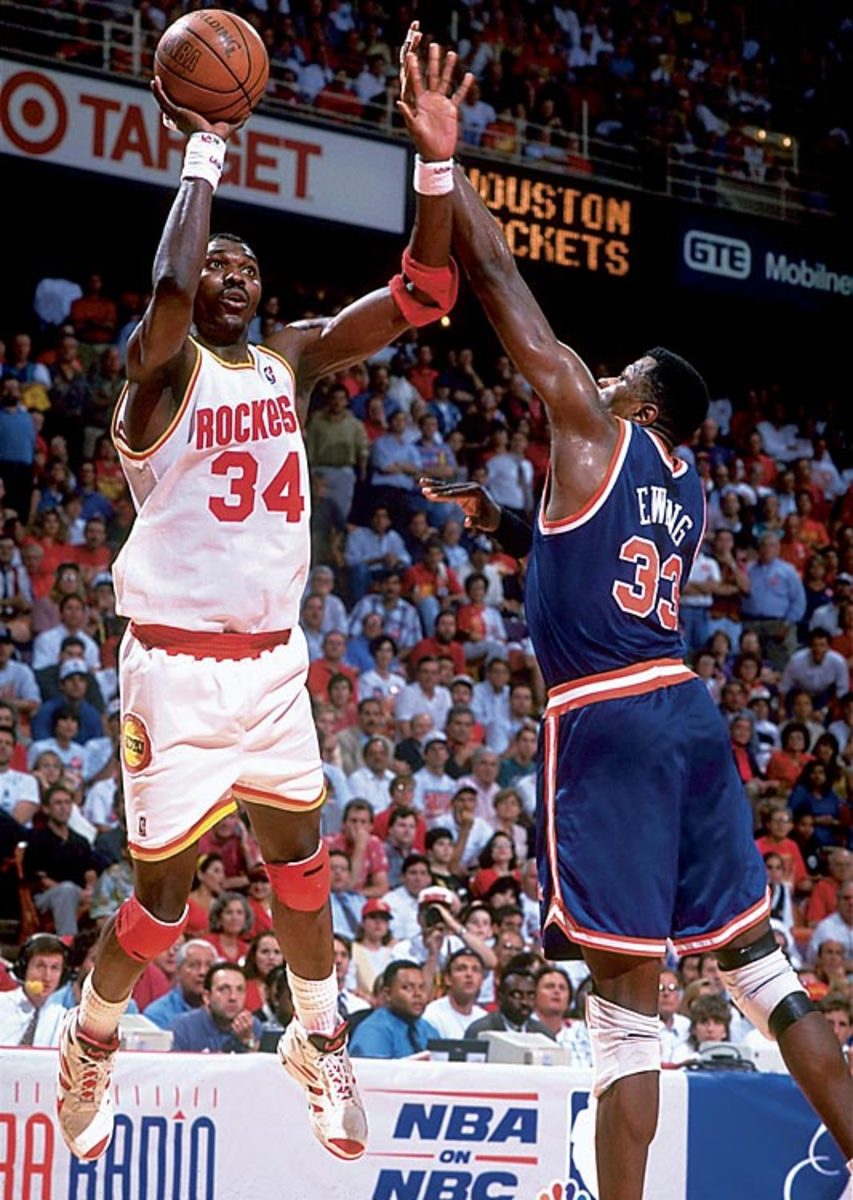
Star centers Hakeem Olajuwon of the Rockets and Patrick Ewing of the Knicks duked it out in 1994 in a series that went seven games.
1994
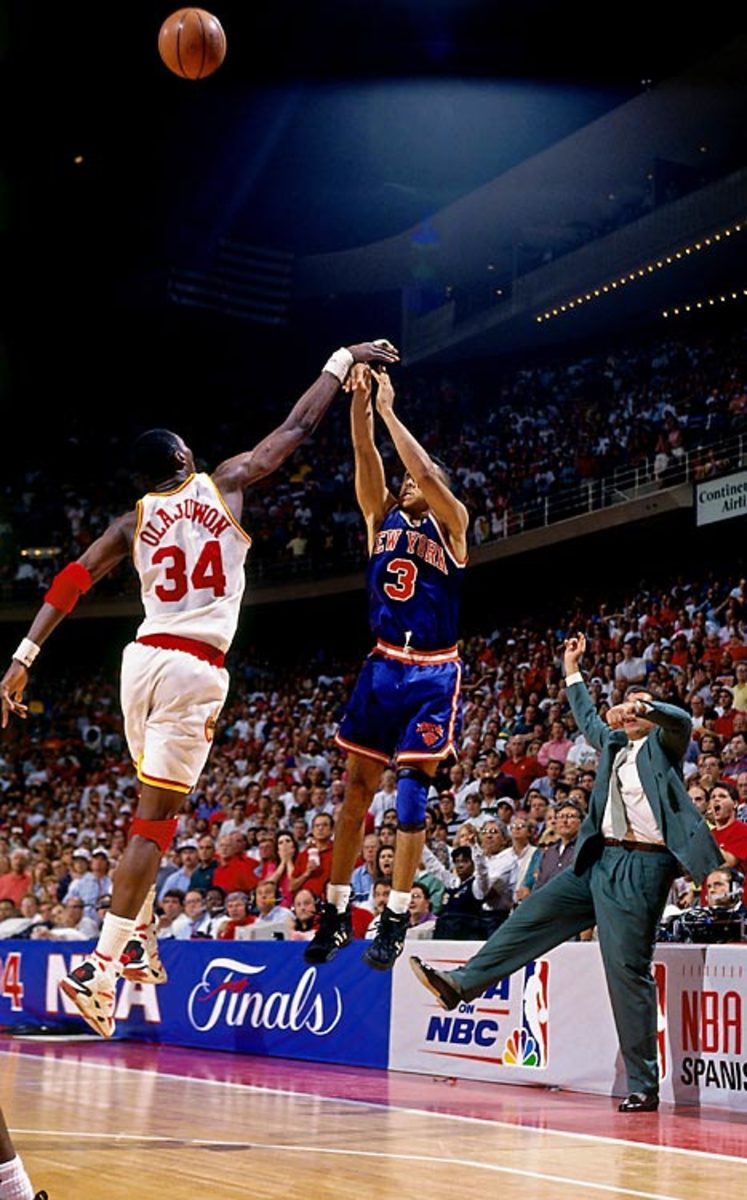
In Game 6, Olajuwon blocked a potential game-winning three by Knicks guard John Starks to secure the win and send the series to a final game.
1993
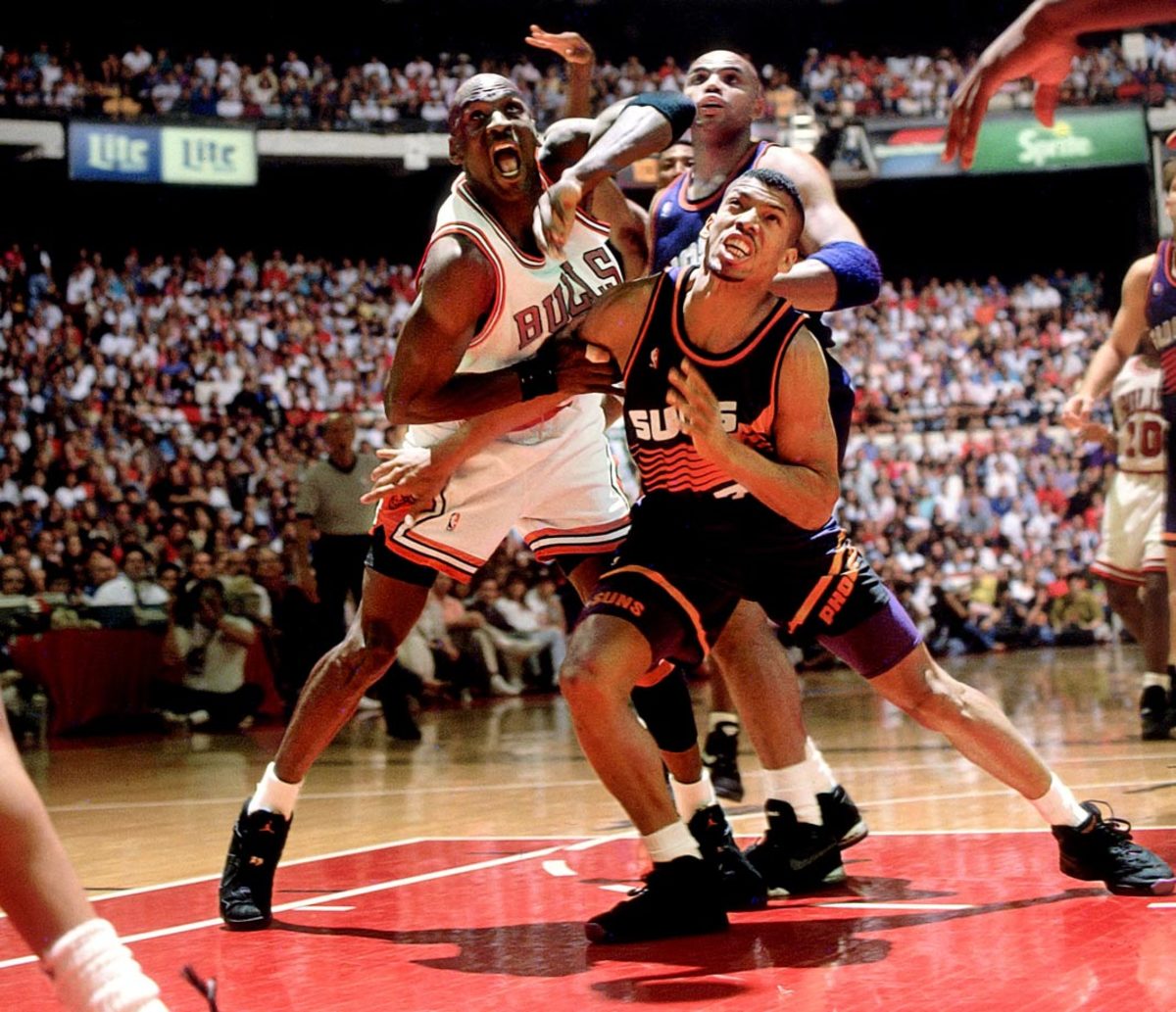
Michael Jordan battles Suns guard Kevin Johnson beneath the hoop.
1993
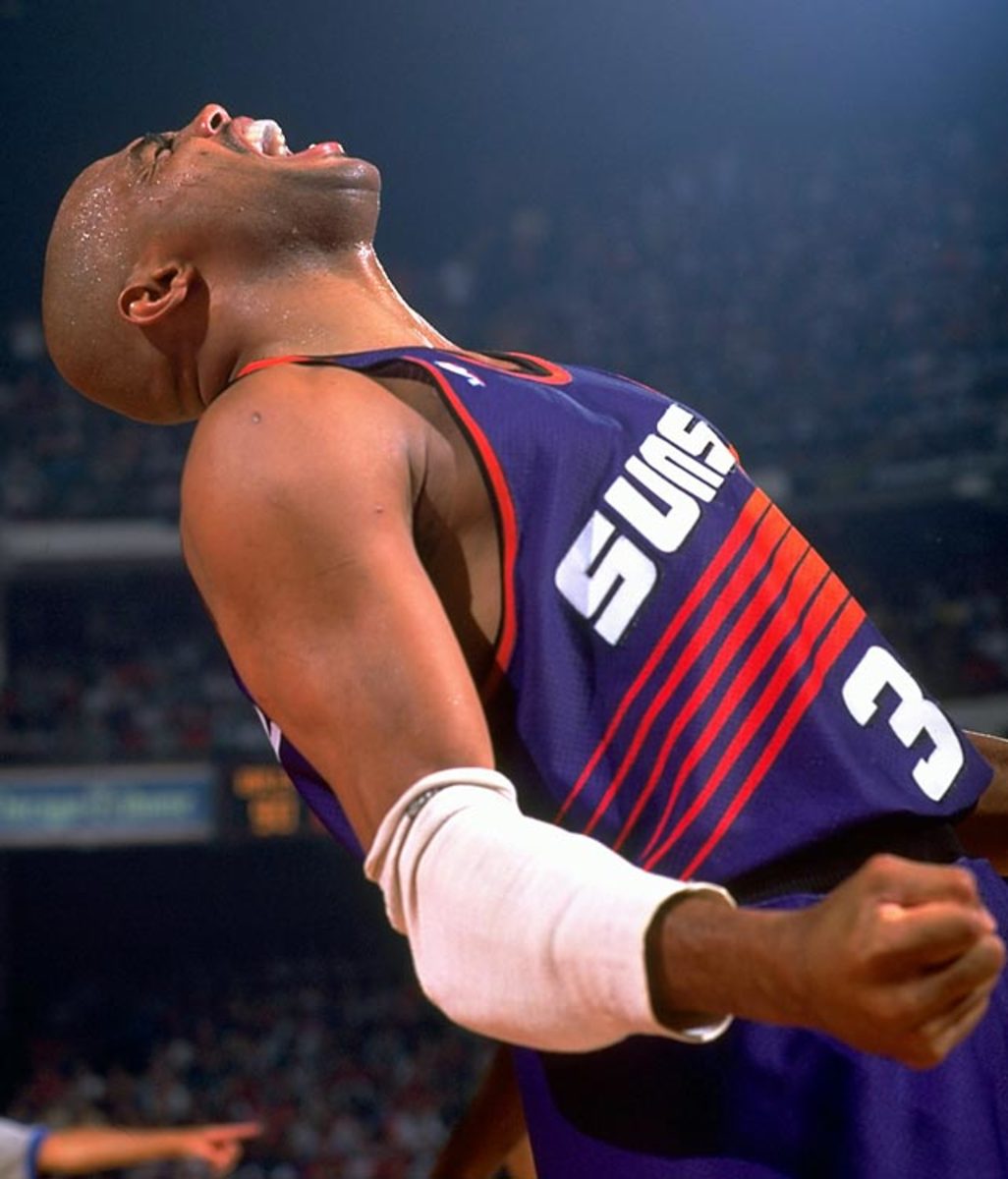
Suns star Charles Barkley celebrates Phoenix's Game 5 win. Though "Sir Charles" averaged 27.3 points and 13 rebounds, it wasn't enough to lift the Suns past Chicago. Years later, he would admit the series made him realize Jordan was the superior player.
1993
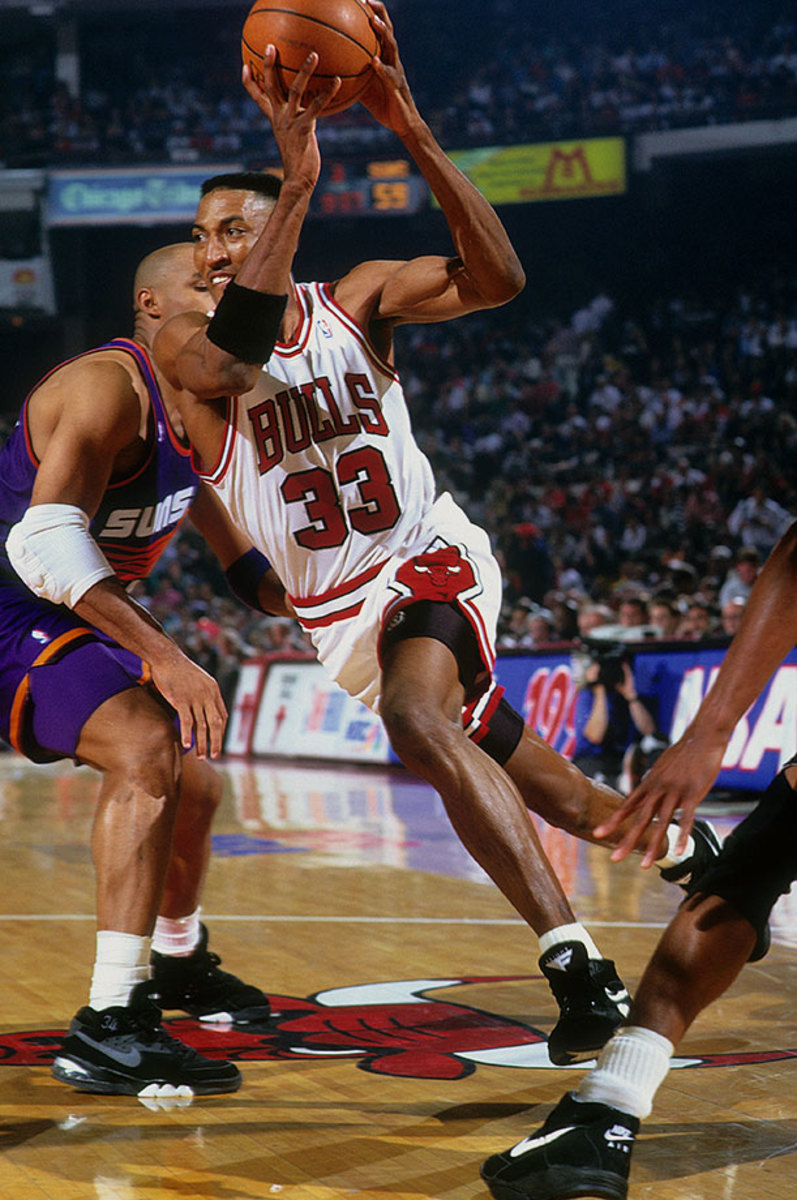
Scottie Pippen of the Bulls drives to the basket against the Suns. Pippen averaged 21.2 points, 9.2 rebounds and 7.7 assists in the series.
1992
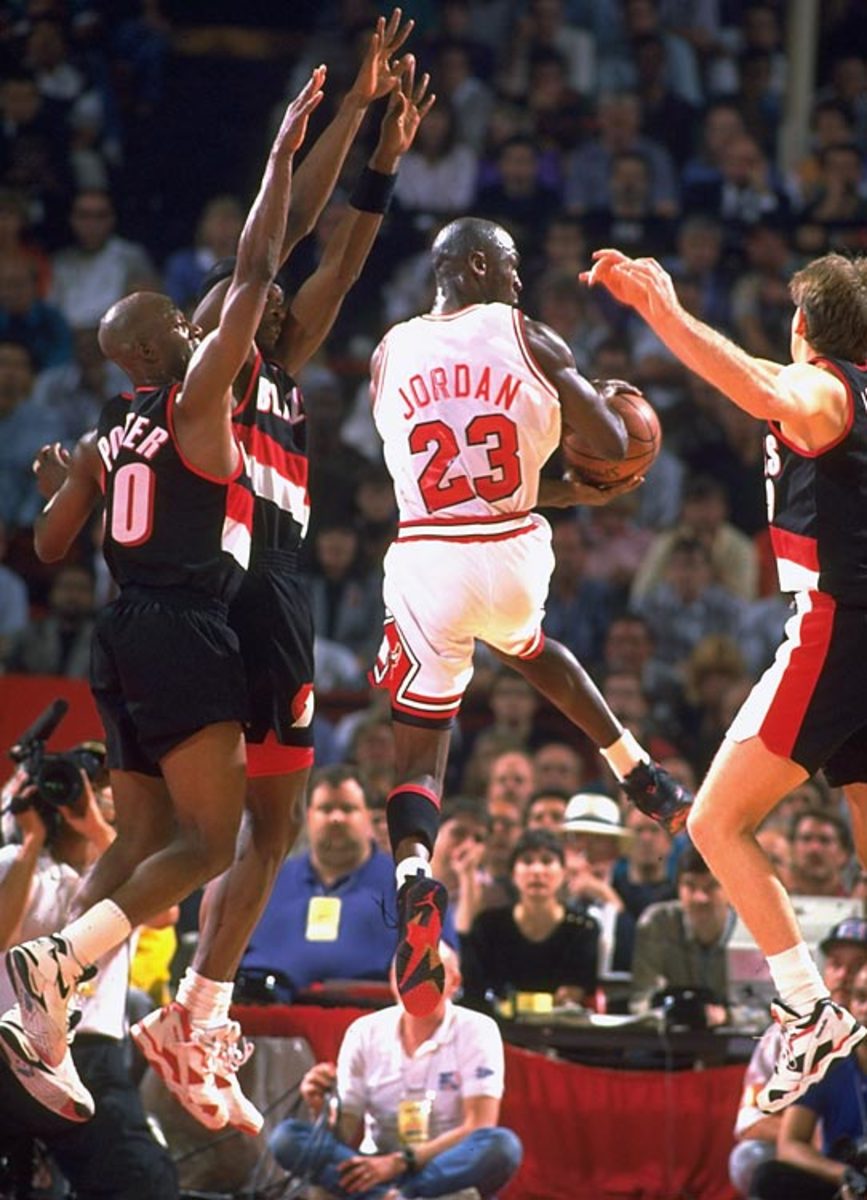
Michael Jordan and the Bulls appeared in their second Finals to face Clyde Drexler and the Portland Trail Blazers. The debate about who was better between MJ and Clyde was effectively silenced as Jordan hit six first-half threes in Game 1, famously shrugging at the broadcast table after hitting the sixth one. Jordan's dominance set the tone for the series.
1991
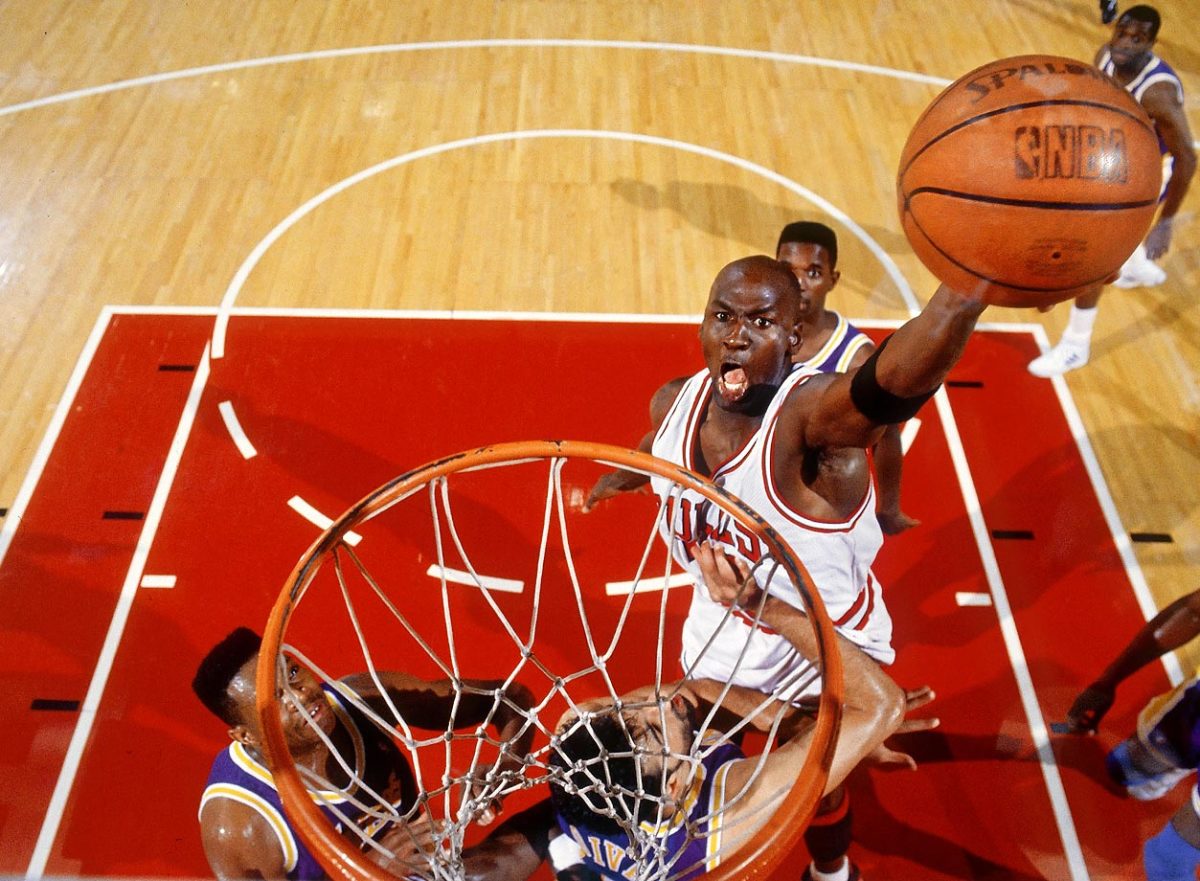
Michael Jordan skies for a dunk over Lakers center Vlade Divac in Game 2, a 107-86 Chicago win. Jordan scored 33 points on 15-of-18 shooting, including his famous hand-switching layup to lead the Bulls.
1991
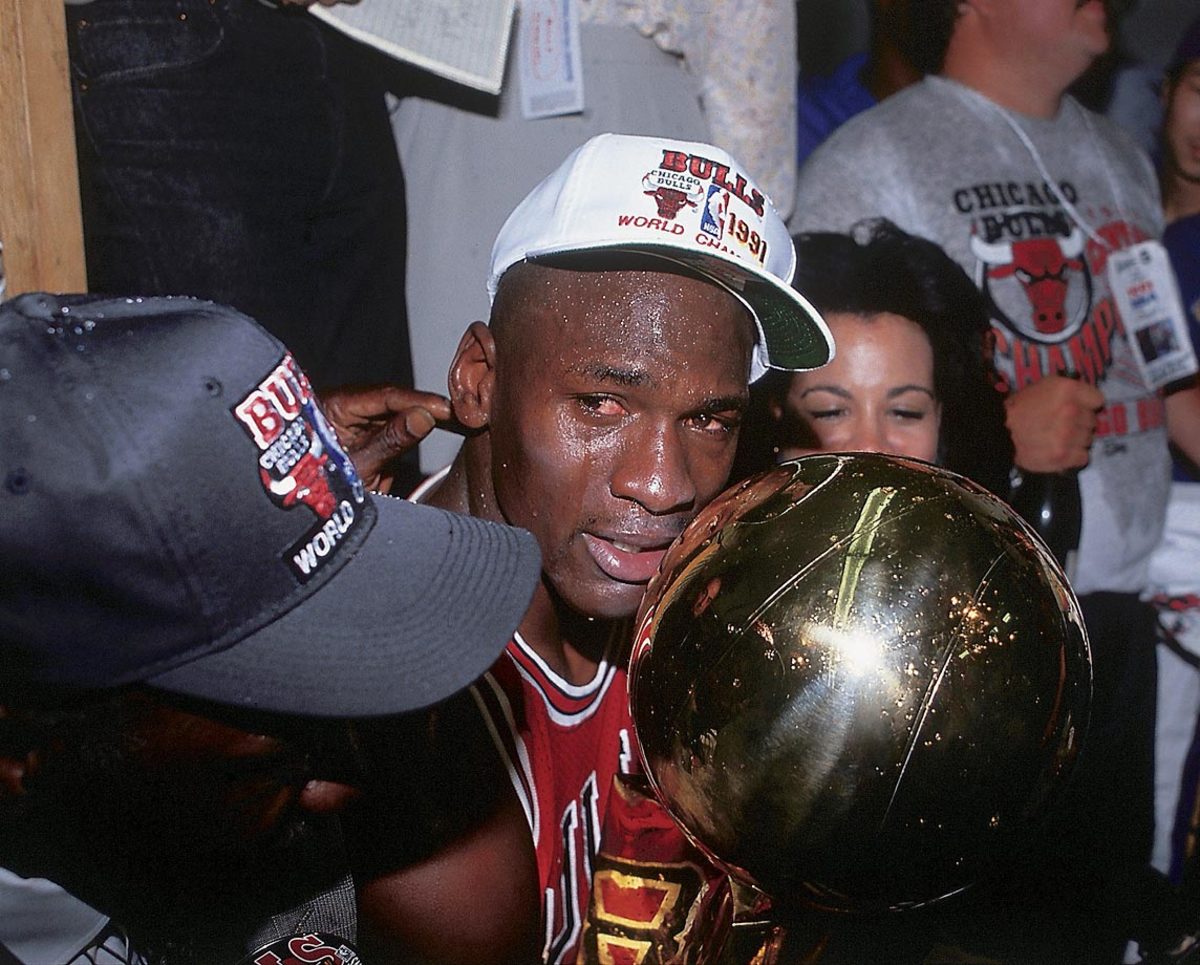
With his parents at his side, Michael Jordan holds the Chicago Bulls' first-ever championship trophy after defeating the Los Angeles Lakers in five games.
1990
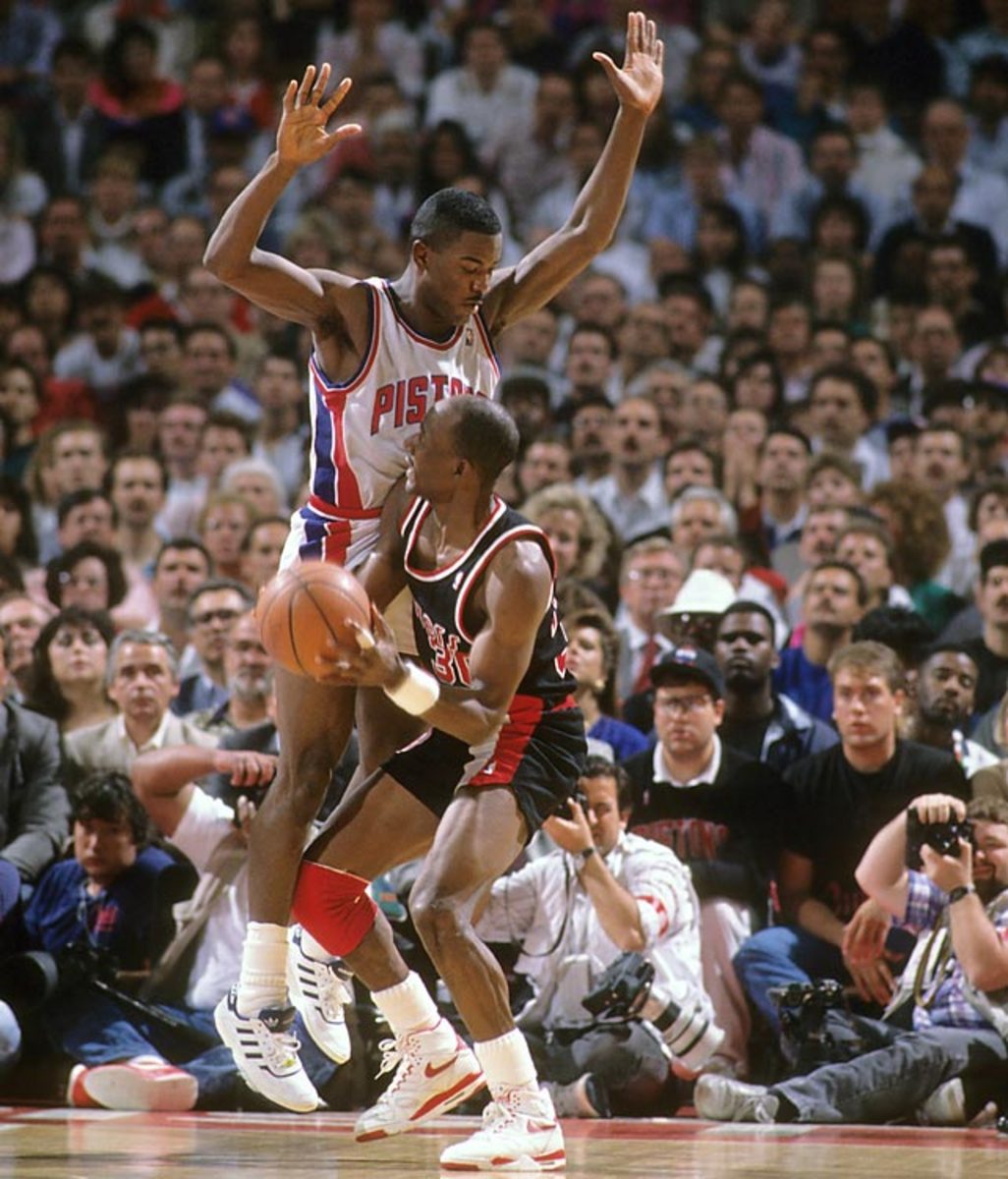
Joe Dumars of the Pistons defends Terry Porter of the Trail Blazers in Game 1. The backcourt of Isiah Thomas (27.6 points per game) and Dumars (20.6) propelled Detroit to the championship in five games. Vinnie Johnson hit the series-clinching jumper at the end of Game 5.
1989
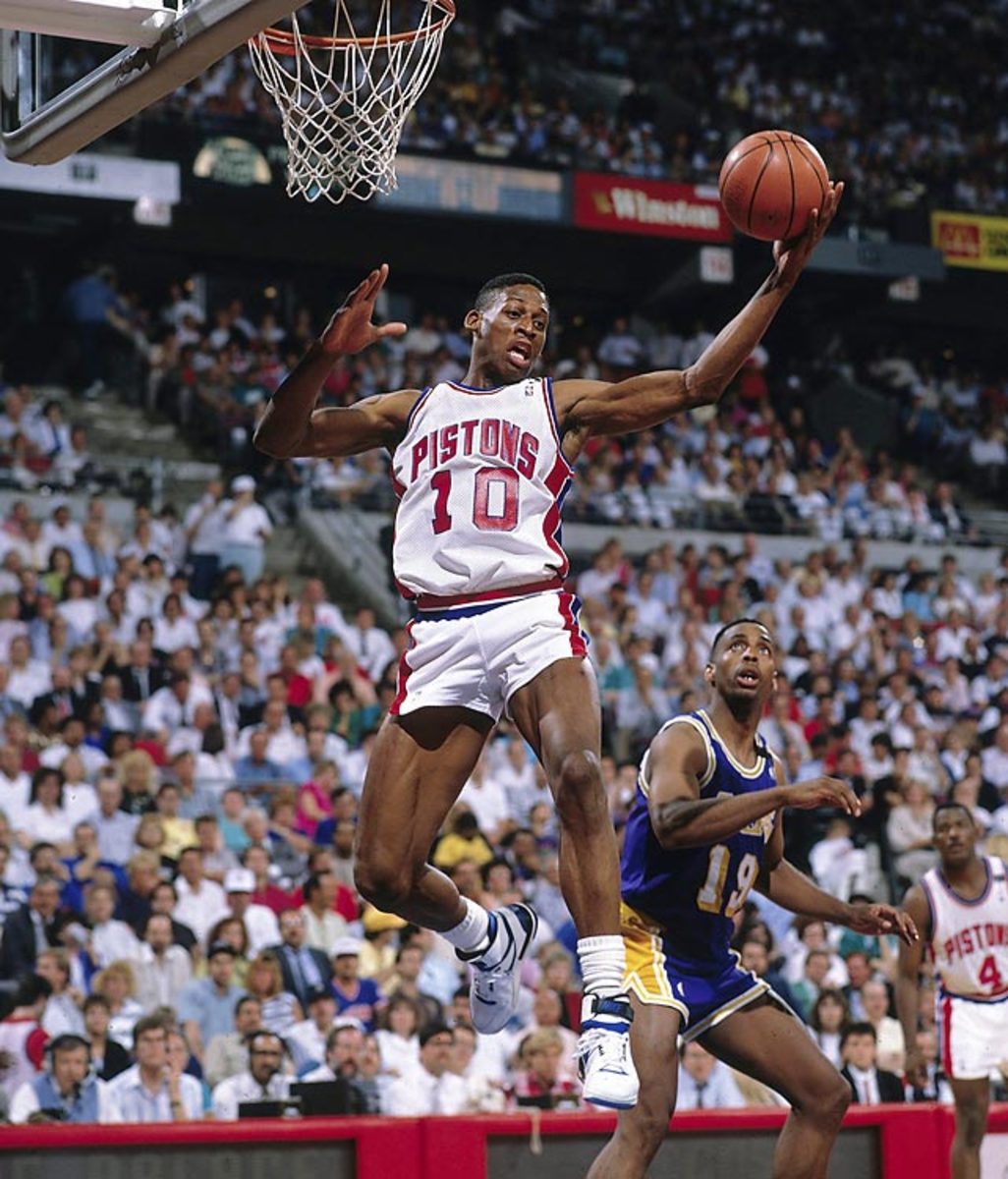
Pistons forward Dennis Rodman snatches a board against the Lakers. Detroit ended L.A.'s bid for a third straight title with a four-game sweep after Magic Johnson injured his hamstring early in Game 2.
1988
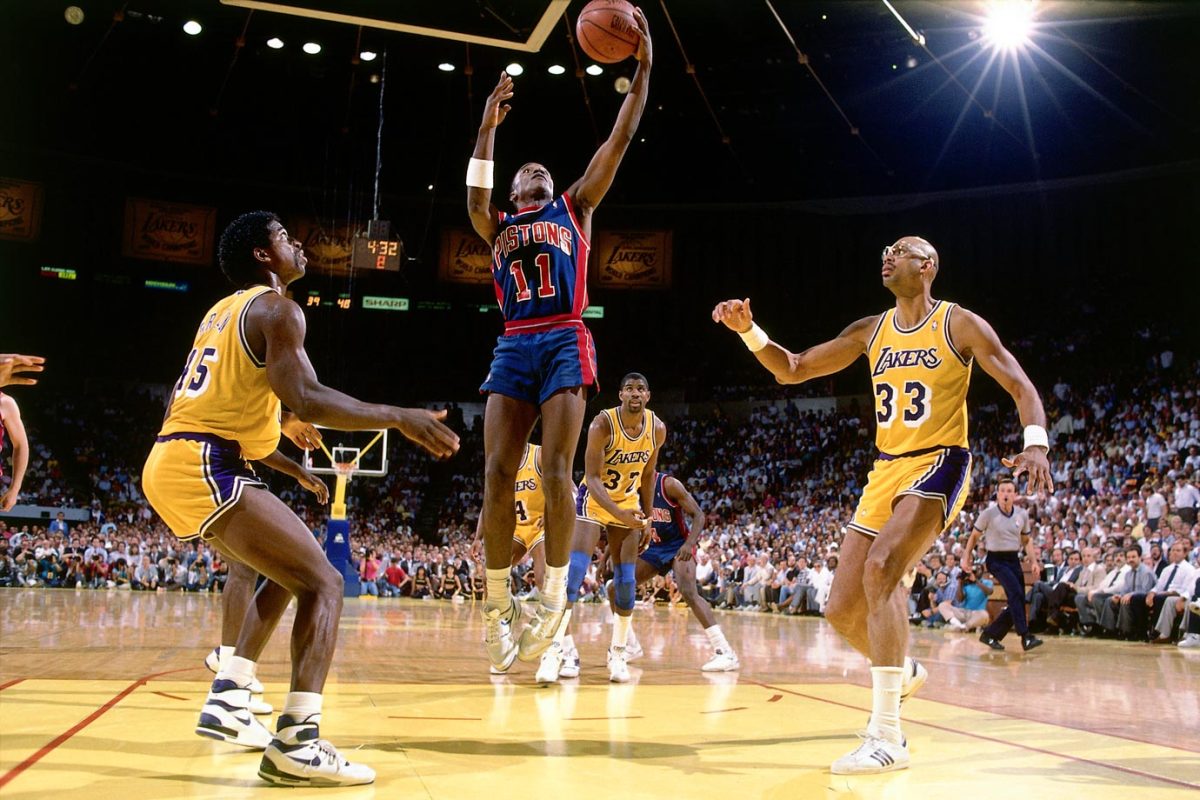
A new challenger emerged from the Eastern Conference as Detroit's "Bad Boys," starring point guard Isiah Thomas took on the Lakers. With Detroit up 3-2 going into Game 6, Thomas scored 25 gritty third-quarter points playing on a sprained ankle. It wouldn't be enough — L.A. won Game 6 103-102, with 28 points from James Worthy.
1988
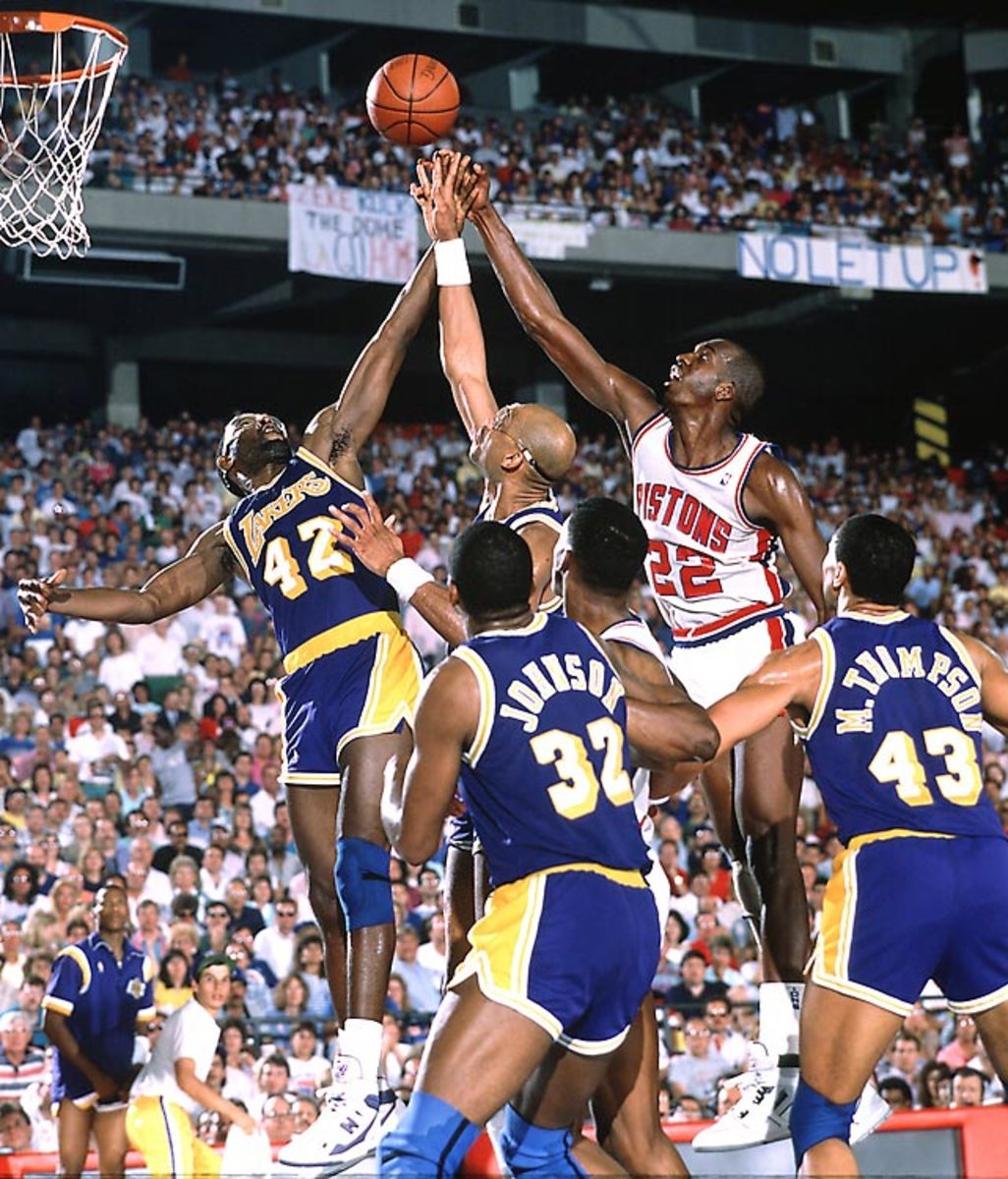
In Game 7 James Worthy (42) again shouldered the load for Los Angeles, recording a triple-double with 26 points, 16 rebounds and 10 assists to secure another Lakers title and Finals MVP accolades.
1987
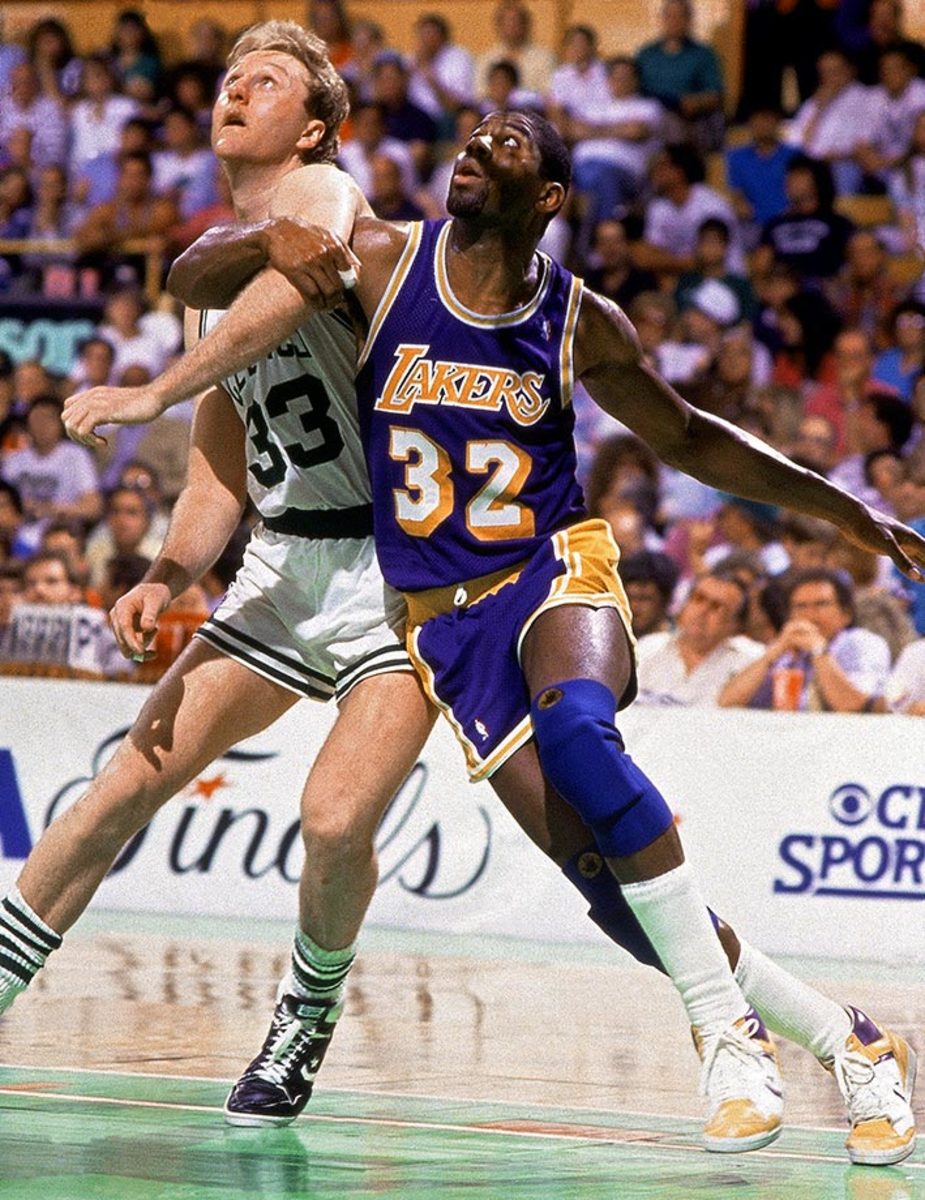
Boston, L.A., Bird and Johnson would meet in the Finals for the last time in 1987. Los Angeles won in six games with the core of Johnson, Abdul-Jabbar and Worthy again proving to be the cream of the crop.
1987
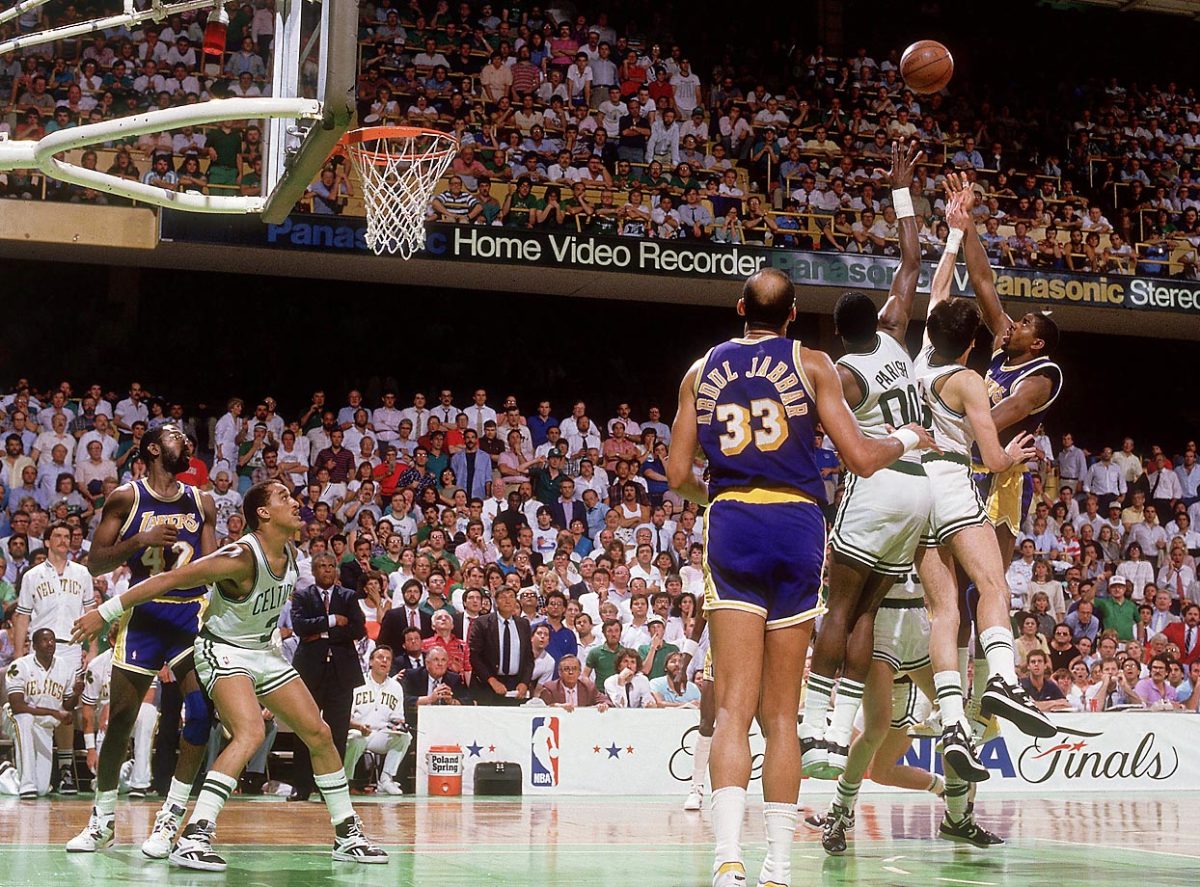
Magic Johnson drains his famous junior sky hook over Robert Parish and Kevin McHale to win Game 4 for the Lakers at the buzzer. Johnson was named Finals MVP.
1986
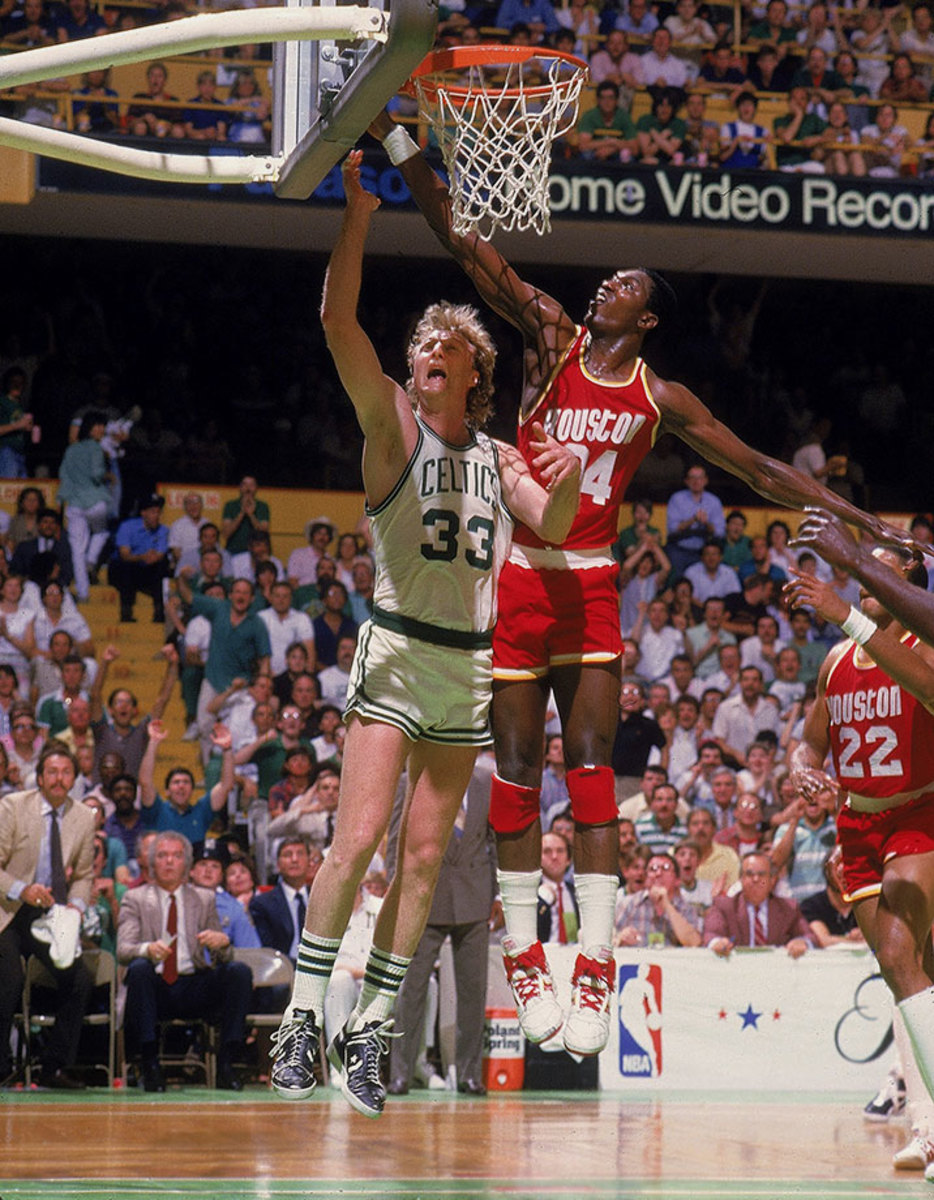
Larry Bird battles Hakeem Olajuwon under the hoop. The Celtics would win their second title in three straight finals appearances, paced by the dominant Bird (24 points, 9.7 rebounds and 9.5 assists per game), who posted a triple-double in the series-clinching Game 6.
1985
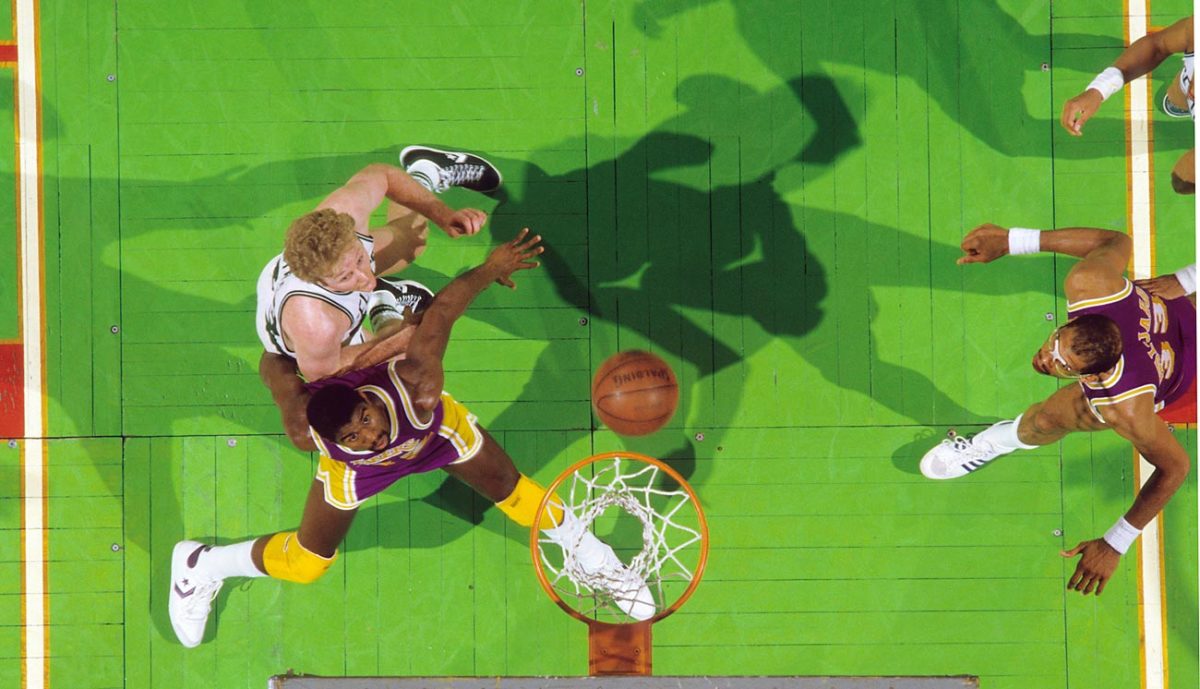
Rival stars Magic Johnson of the Lakers and Larry Bird of the Celtics battle beneath the rim in Game 1 of the 1985 Finals. L.A. pulled the series out in six games thanks to vintage play from 37-year-old Kareem Abdul Jabbar.
1984
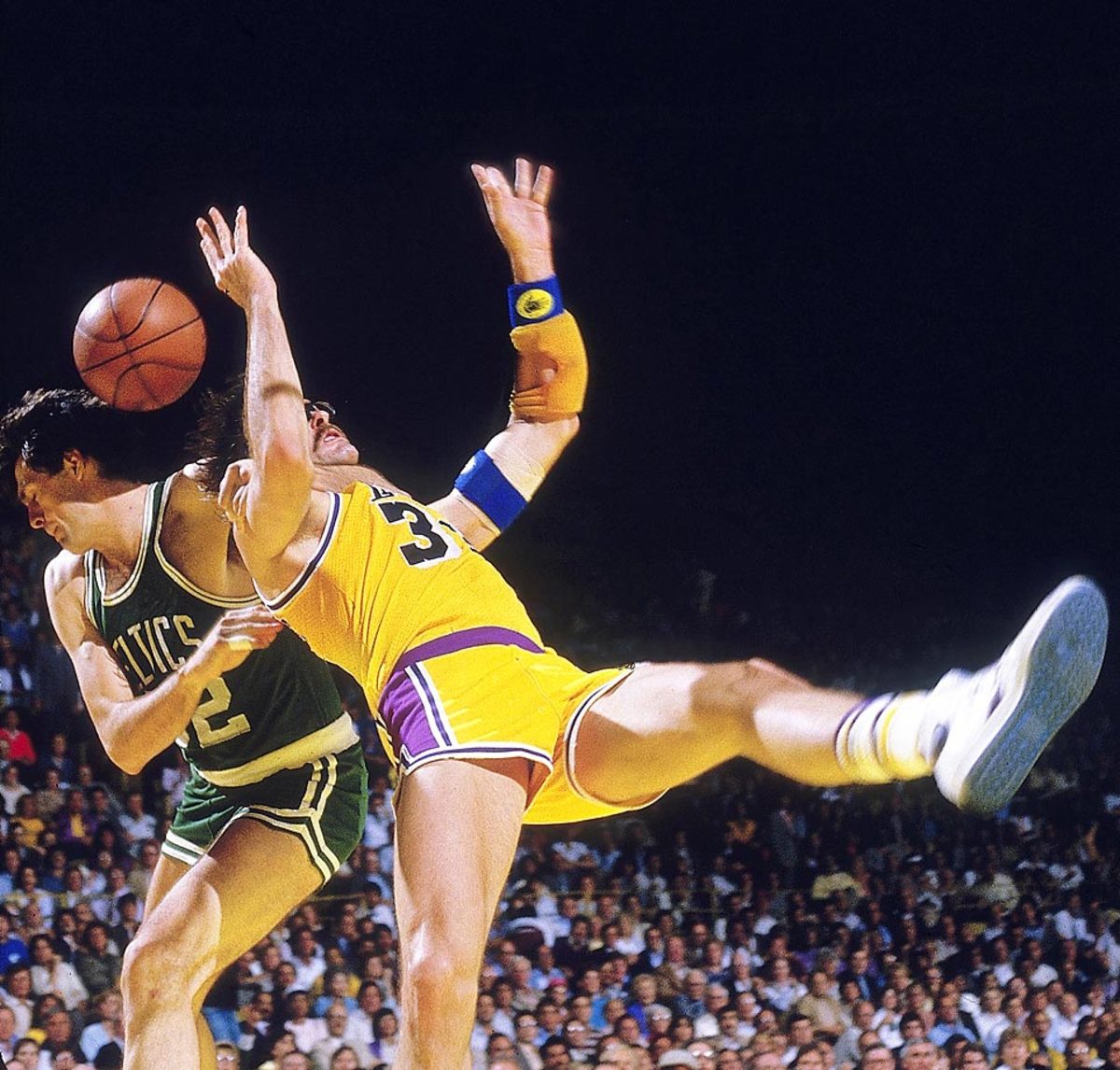
Kevin McHale of the Celtics delivers an extremely hard foul on Lakers forward Kurt Rambis in Game 4. The Boston-Los Angeles rivalry was reignited with an epic seven-game clash between the teams.
1984
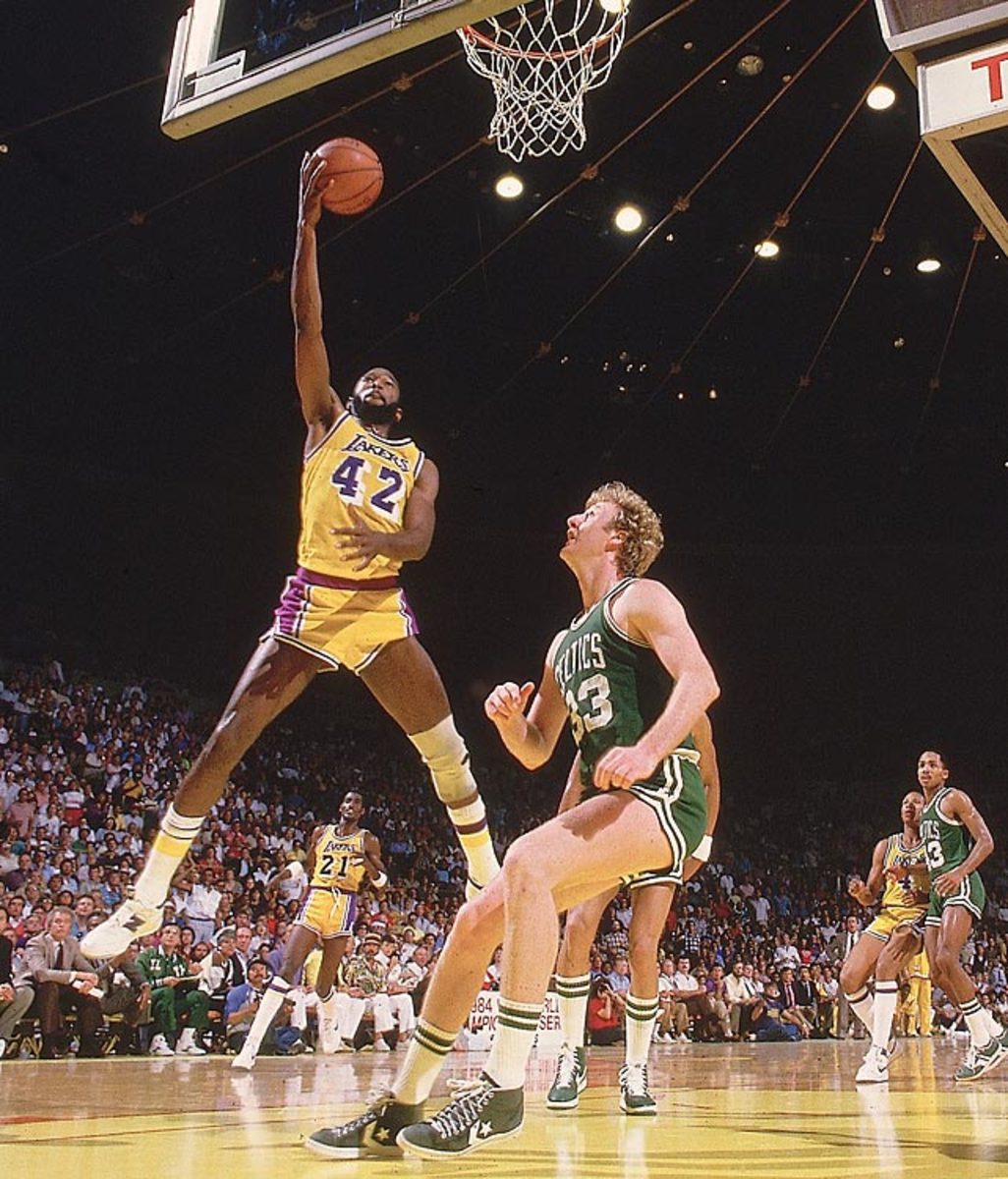
Los Angeles forward James Worthy rises to score over Boston's Larry Bird during a 119-108 Game 6 Lakers victory.
1983
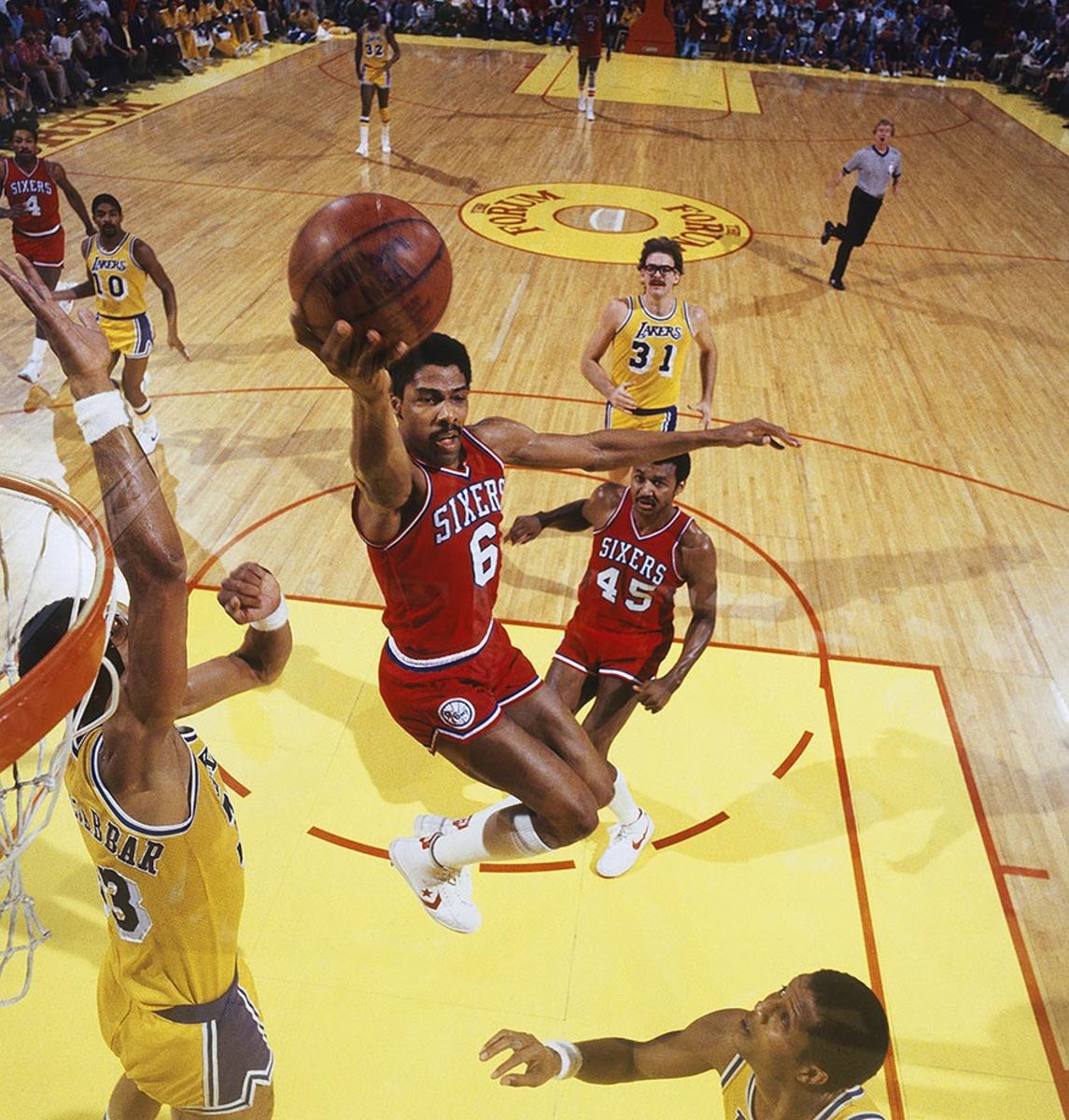
Julius Irving of the Sixers soars to the rim in their third finals matchup with the Lakers in four seasons. This time Philadelphia would prevail in a four-game sweep.
1983
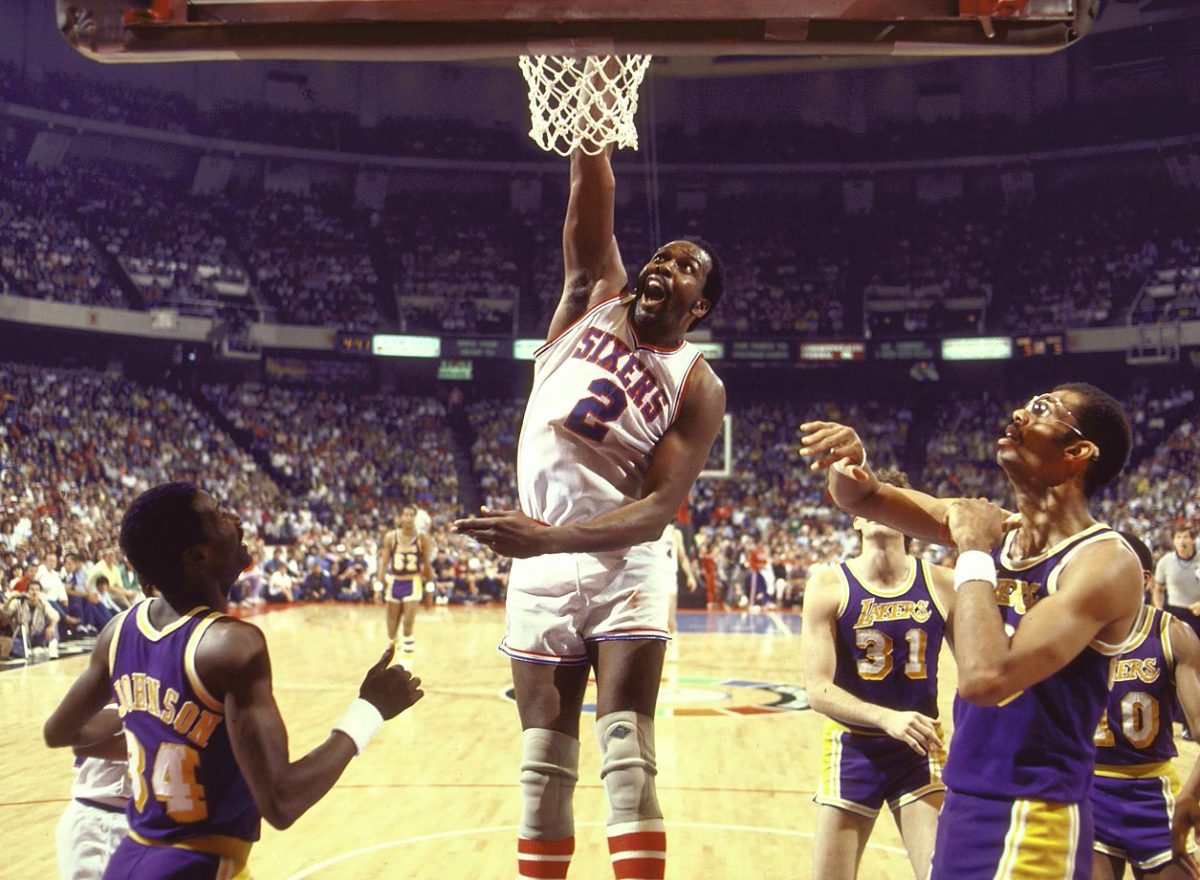
Finals MVP Moses Malone was dominant in Philadelphia's sweep of Los Angeles, averaging 25.8 points and 18 rebounds per game while outplaying L.A. center Kareem Abdul-Jabbar.
1982
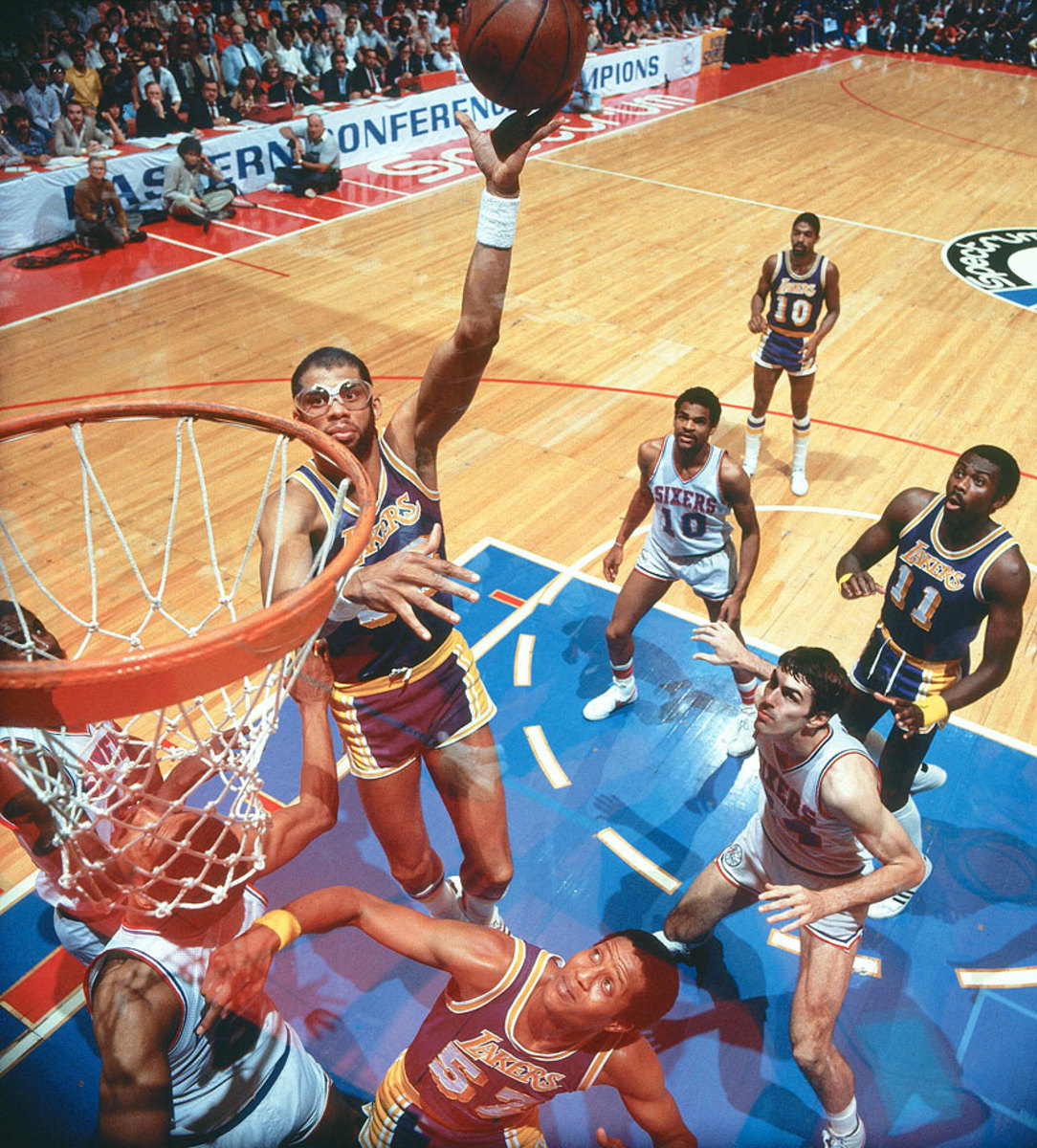
Kareem Abdul-Jabbar and the Lakers squared off against Julius Erving and the Sixers in a rematch of the 1980 finals. The Lakers once again prevailed in six games.
1982
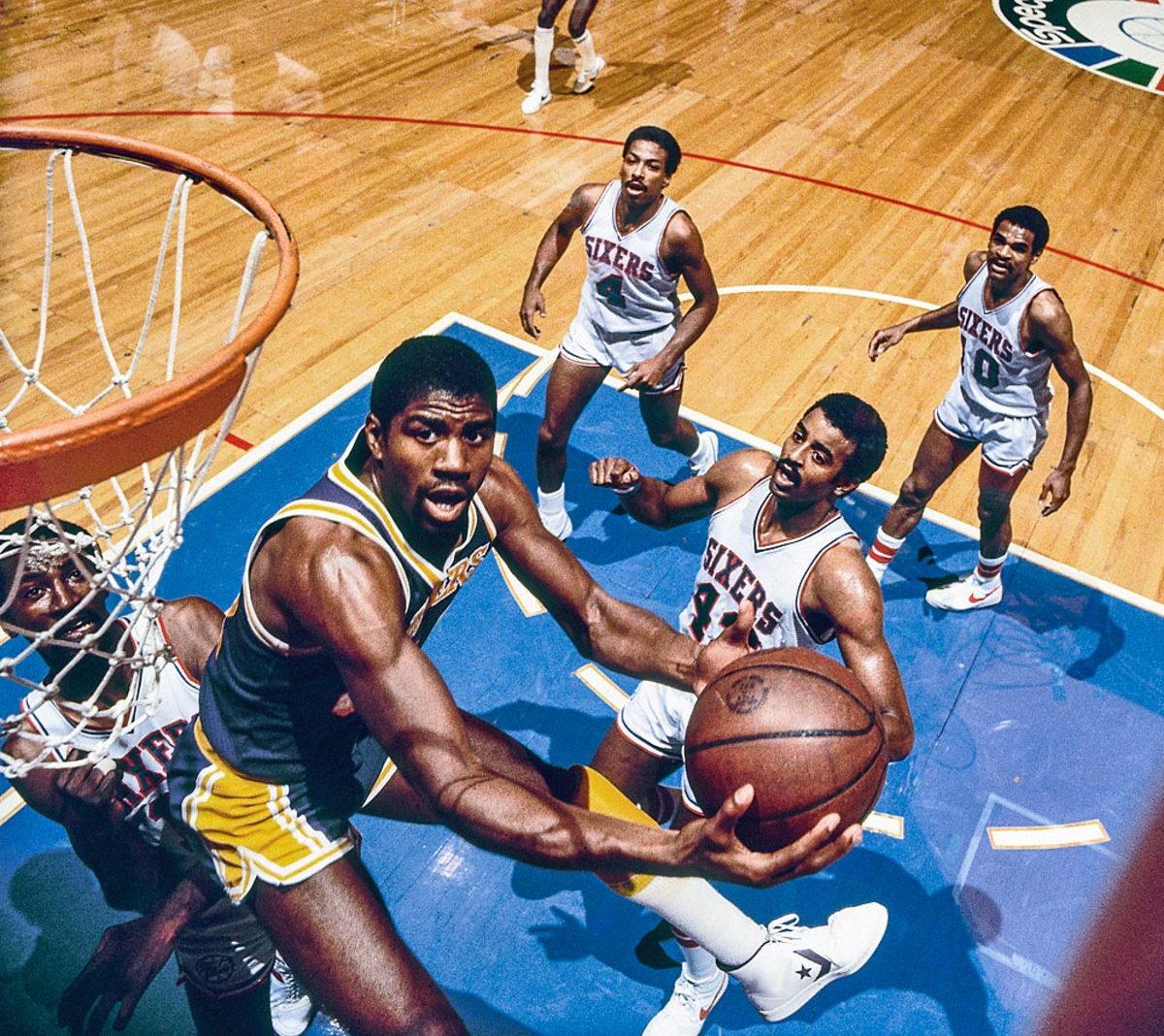
Magic Johnson attacks the hoop against the Sixers. Johnson fell just short of averaging a triple-double in the six-game series, with 16.2 points, 10.8 rebounds and 8 assists per game and winning MVP honors.
1981
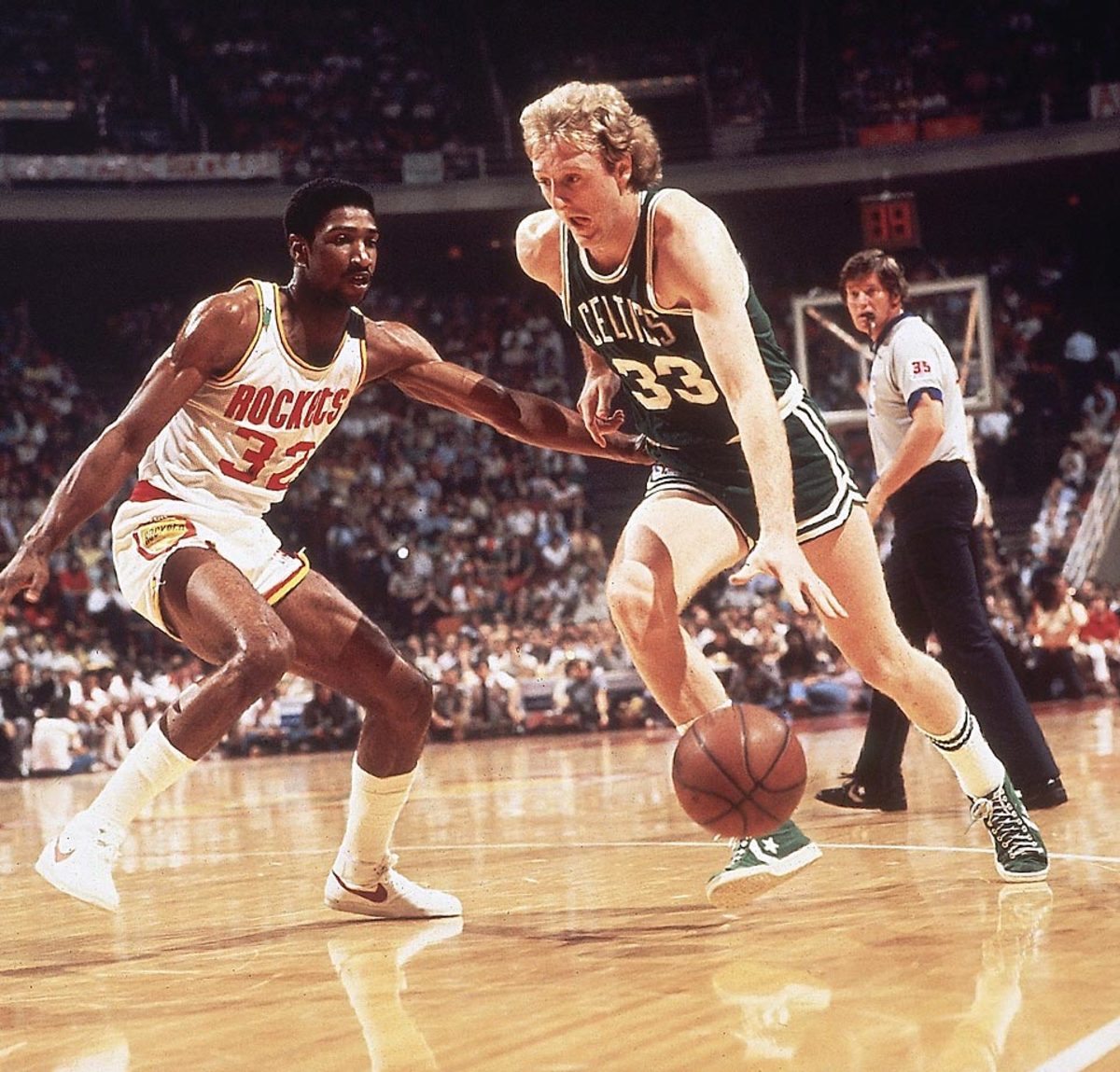
In 1981 it was Larry Bird's Celtics establishing themselves against the Rockets and dominant center Moses Malone.
1981
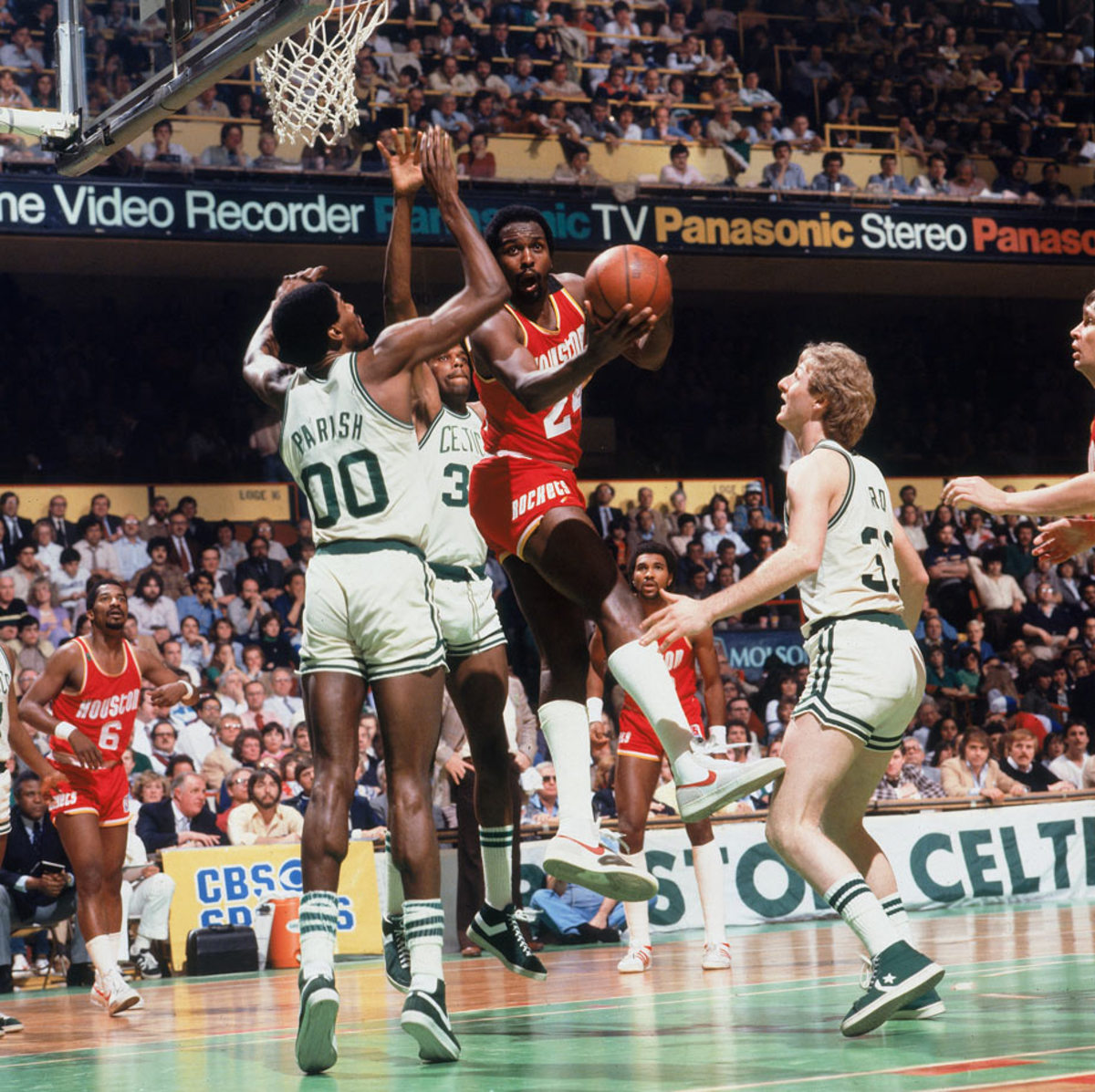
Moses Malone averaged 22.2 points and 16.3 rebounds for the series, which the Celtics won.
1981
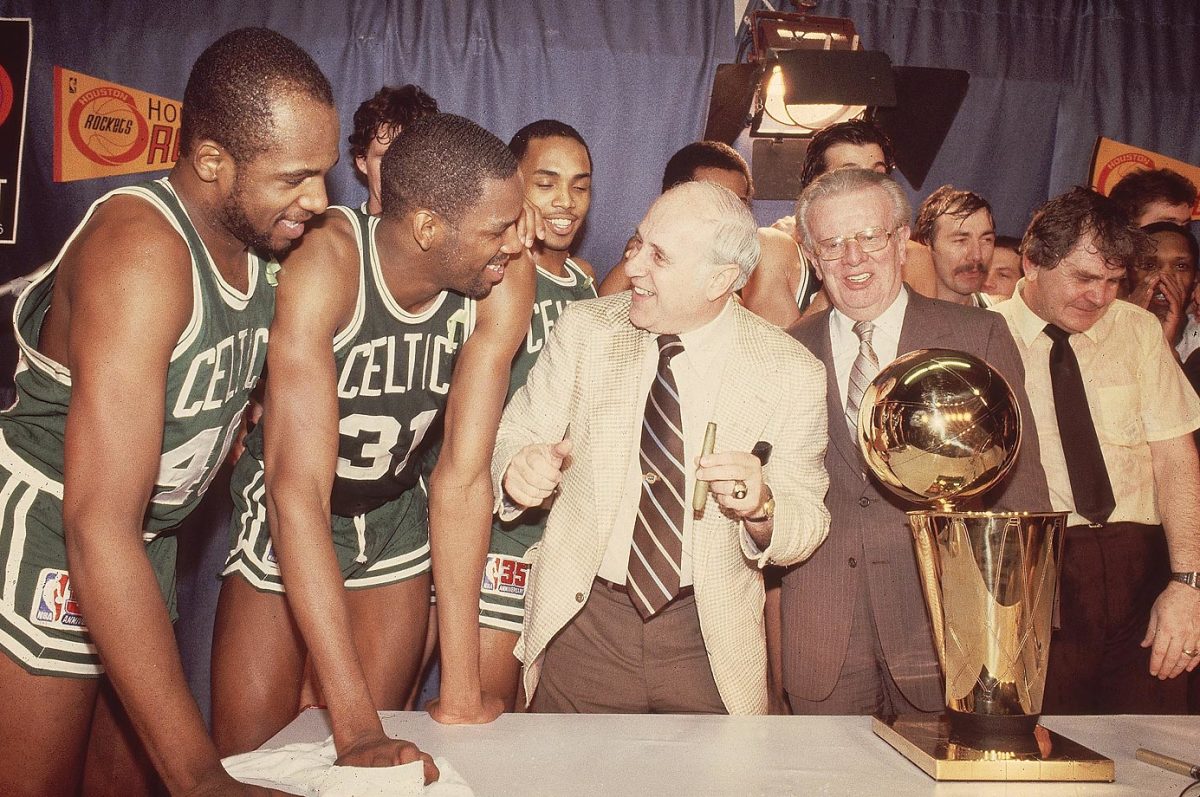
Boston Celtics owner Red Auerbach celebrates with the trophy and his team after beating the Houston Rockets in six games behind Finals MVP Cedric Maxwell and star Larry Bird.
1980
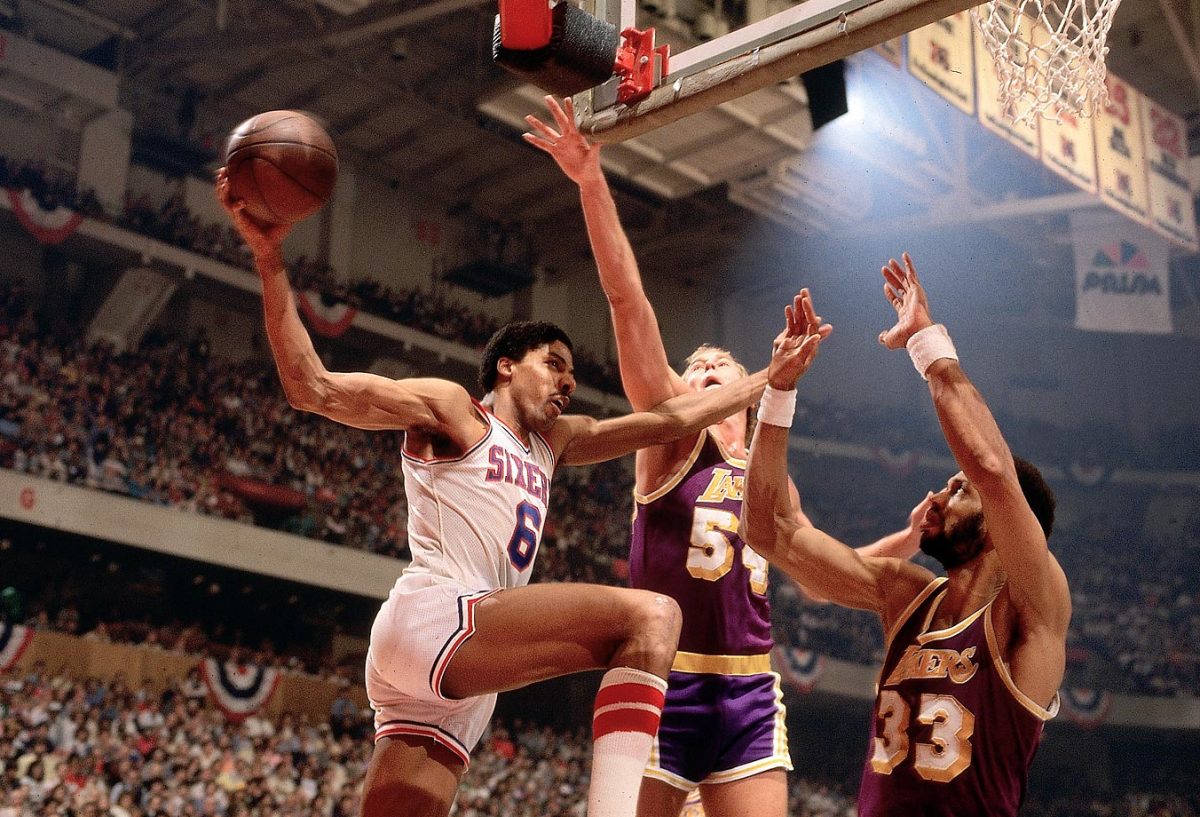
Julius Erving soars and stretches for what would become an iconic reverse layup in Game 4. The Sixers tied the series with a 105-102 win at home.
1980
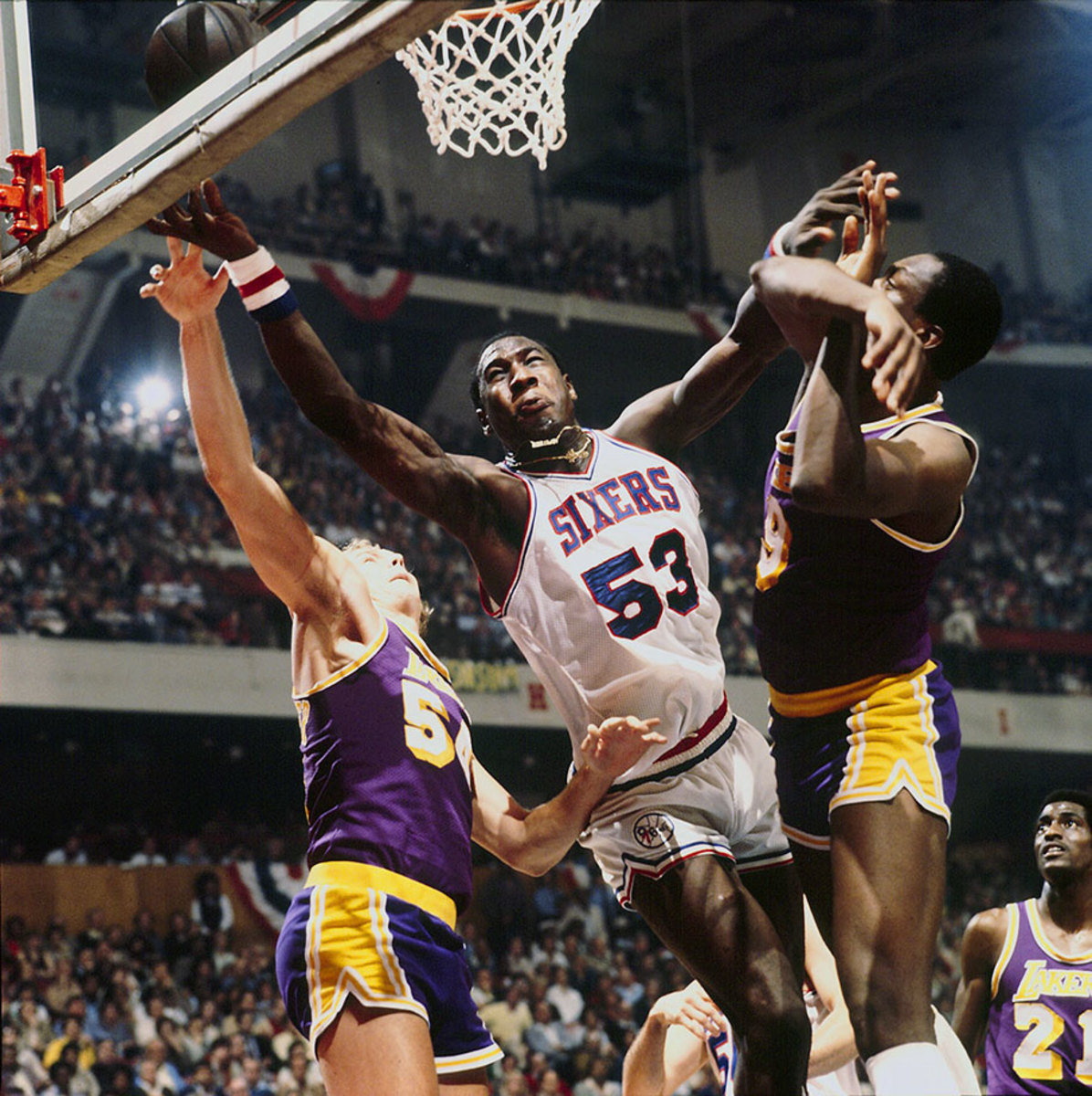
Philadelphia's Darryl Dawkins battles Los Angeles Lakers defenders on his way to the rim. "Chocolate Thunder" led the Sixers in scoring in their only two wins of the series.
1980
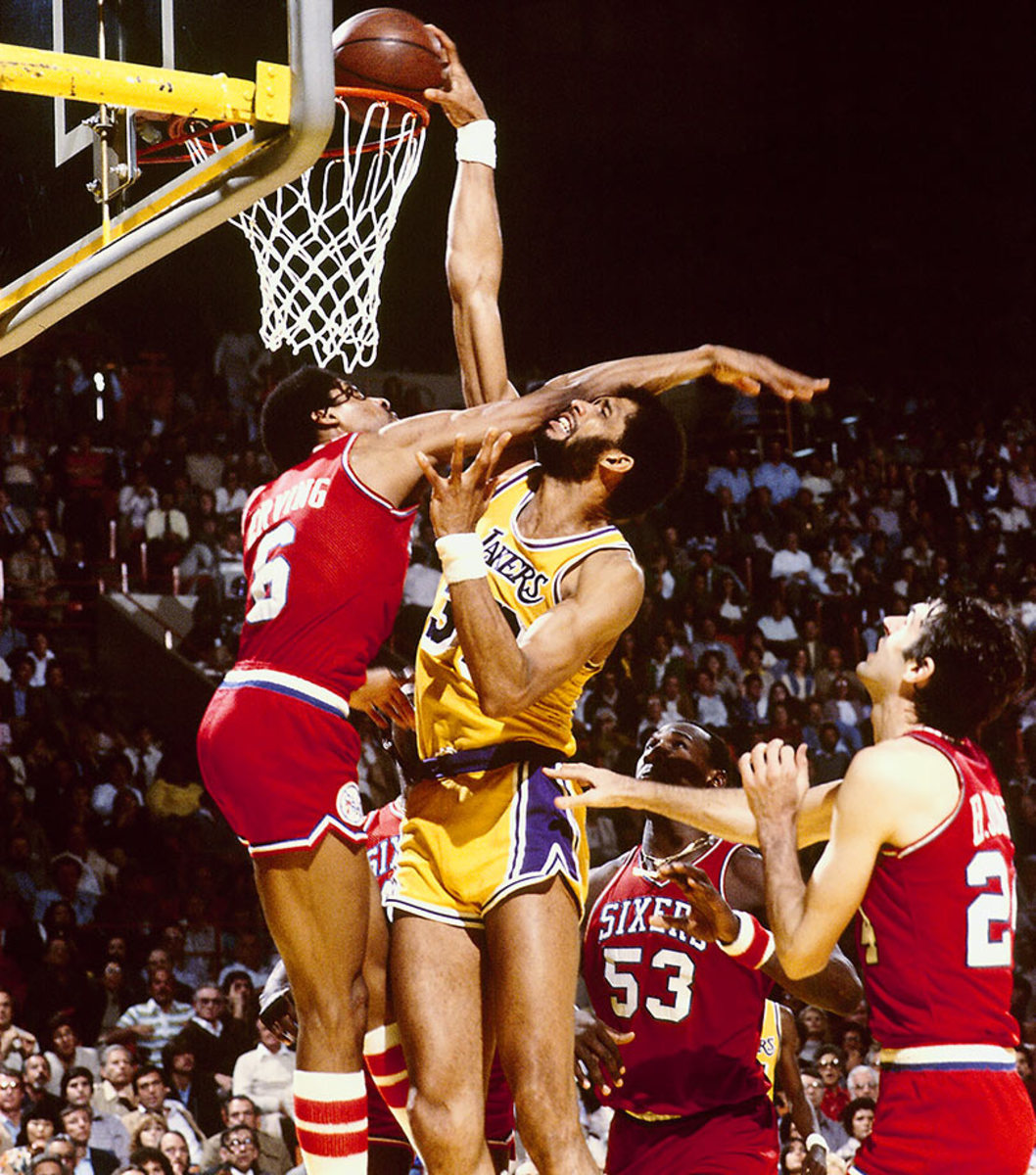
Kareem Abdul-Jabbar dunks against Julius Erving in Game 5 between the Lakers and Sixers.
1980
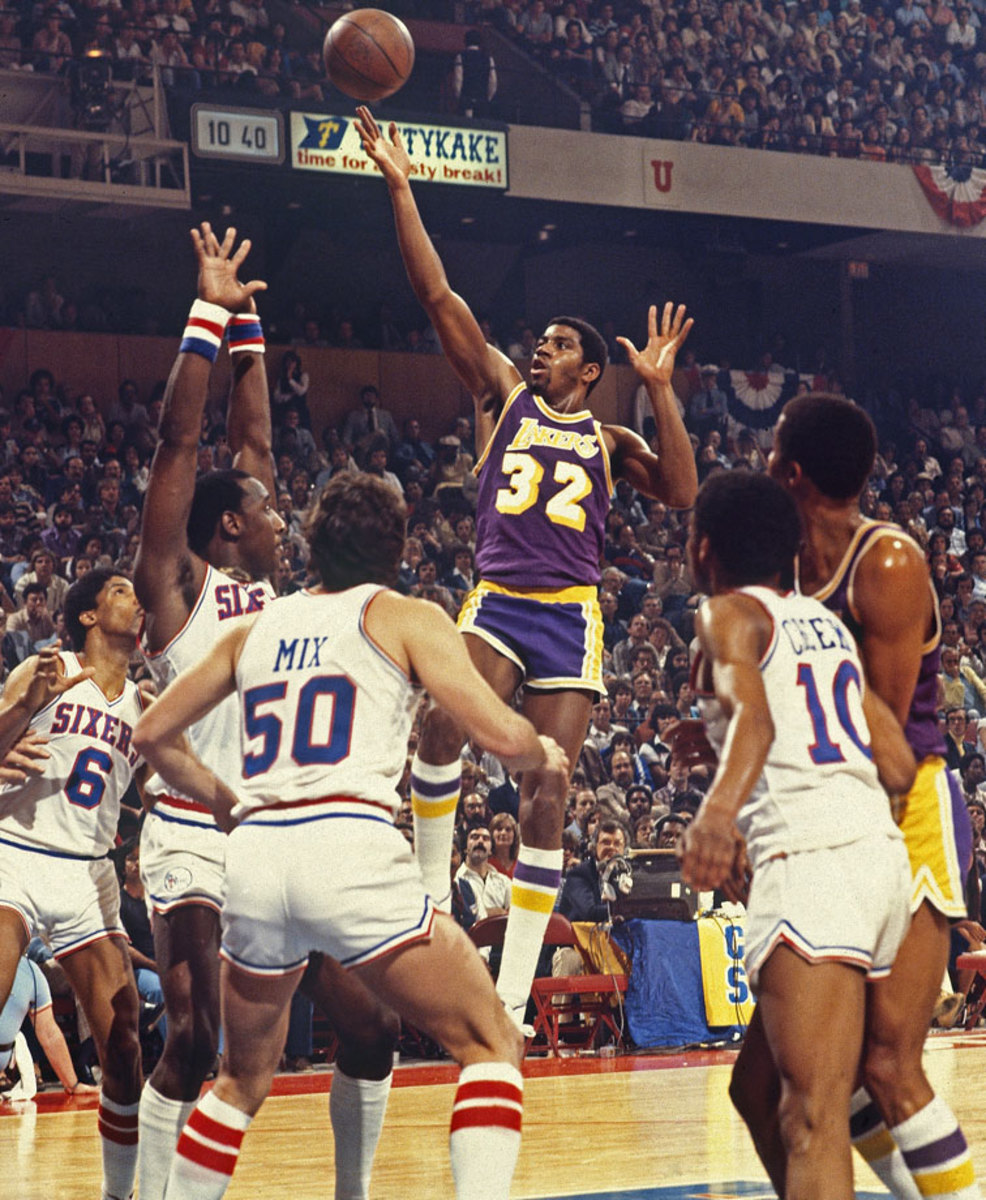
Magic Johnson's 42 points, 15 rebounds and 7 assists in Game 6 sealed the series for the Lakers, sparking a 123-107 win. The versatile Johnson memorably started the game at center for the injured Kareem Abdul-Jabbar in one of the greatest games in playoff history.
1979
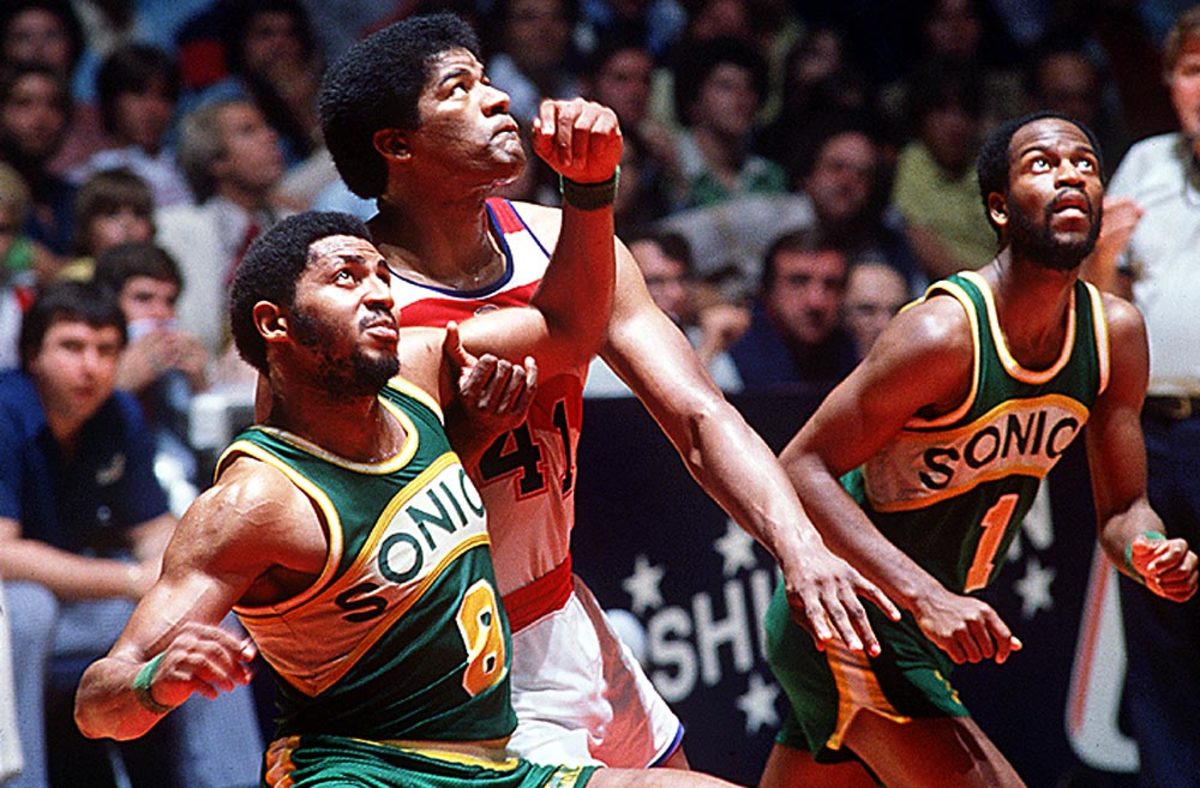
Lonnie Shelton of the Sonics battles Wes Unseld of the Bullets during the 1979 Finals. Unseld led Washington to a title over Seattle the previous year, but the Sonics stuck this one out behind their high-scoring backcourt of Gus Williams and Dennis Johnson.
1979
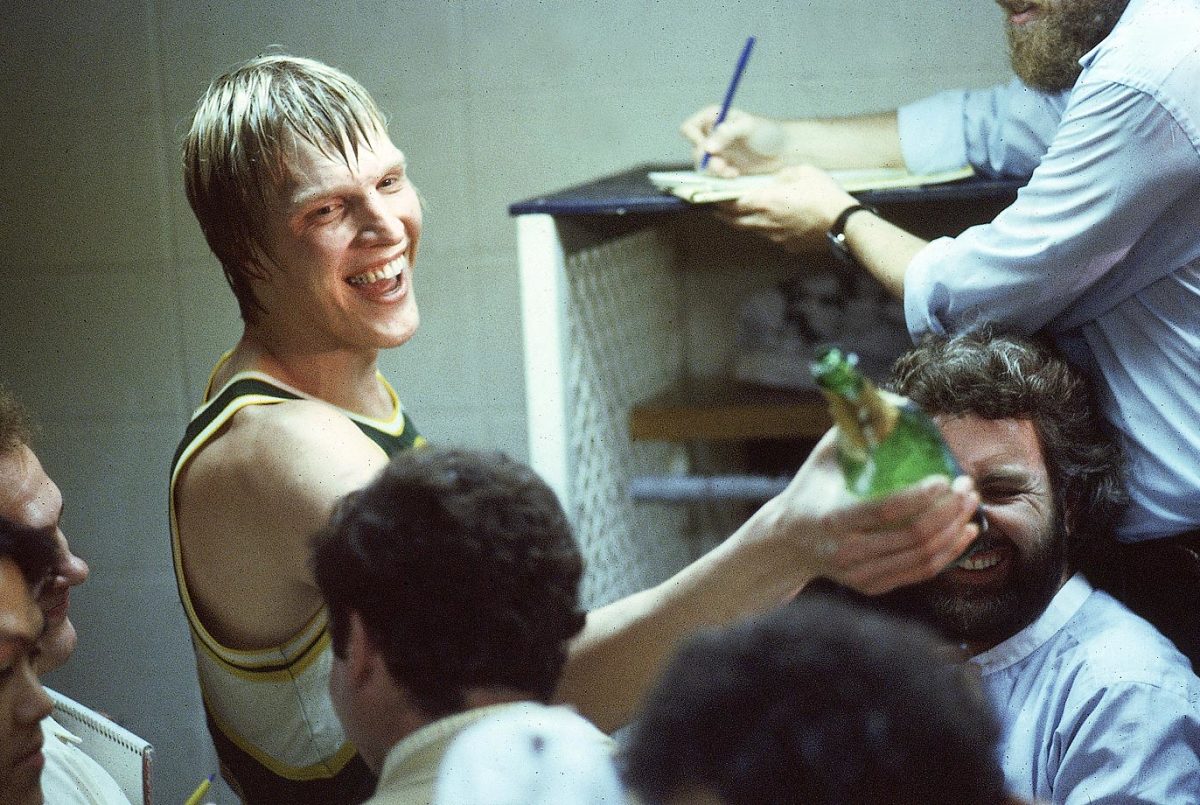
Jack Sikma of the Supersonics celebrates after the series-winning Game 5 against the Washington Bullets. It would be Seattle's lone championship in franchise history.
1978
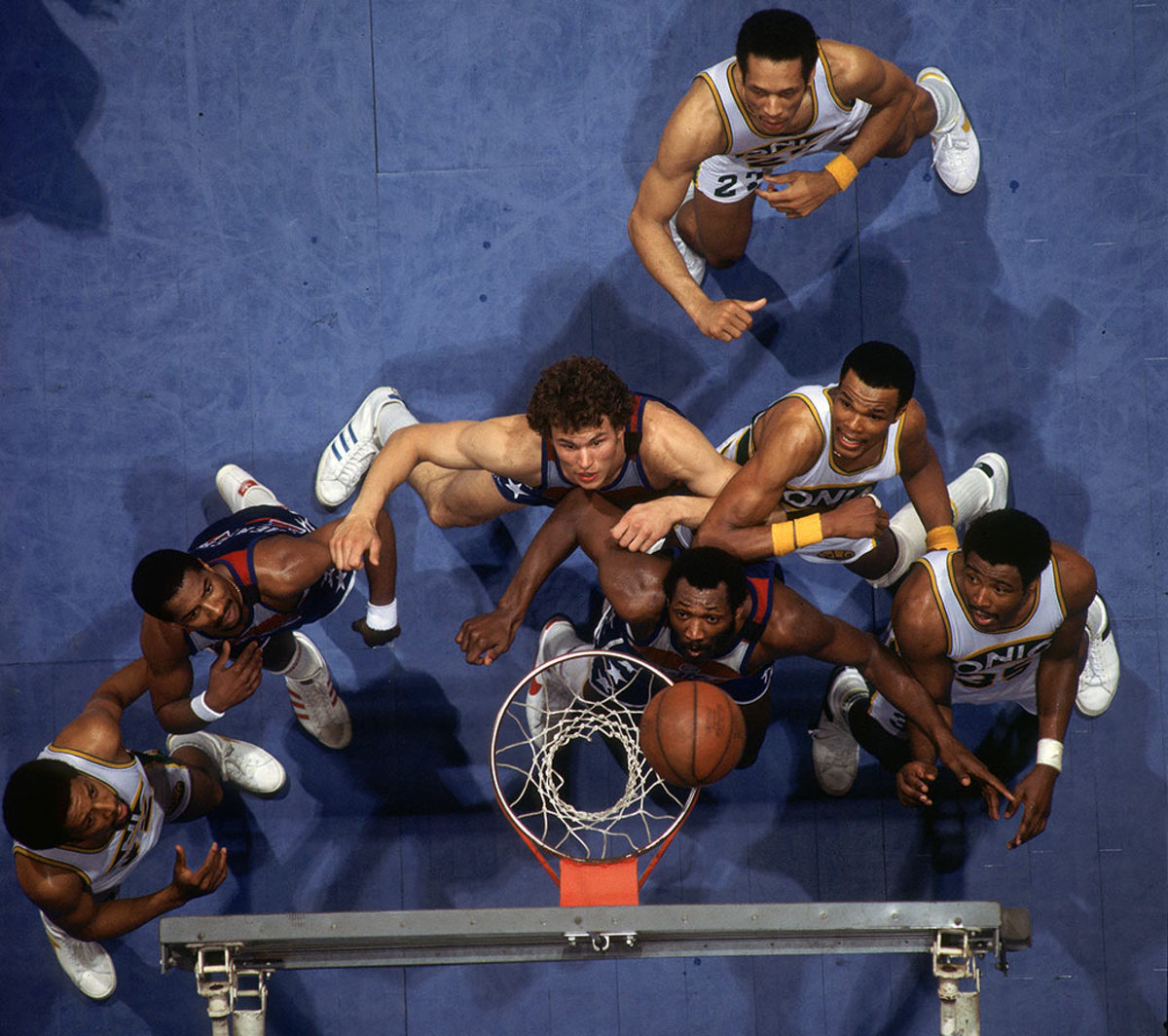
Elvin Hayes of the Washington Bullets watches the ball on the rim. Averaging 20.7 points and 11.9 rebounds, Hayes led Washington to its only title in franchise history.
1977
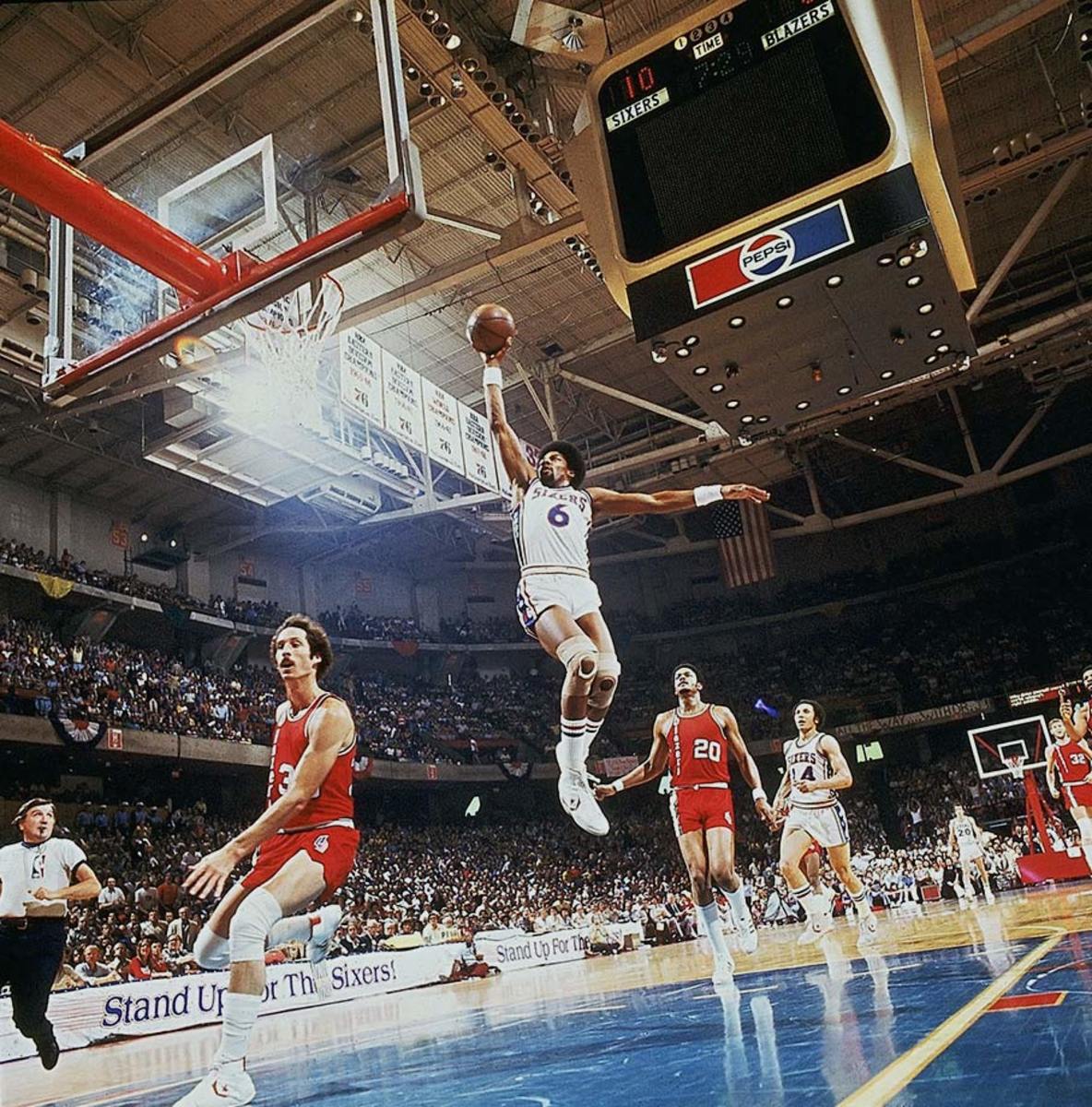
Julius Erving soars to the basket for a dunk in Game 2 between the 76ers and Trail Blazers.
1977
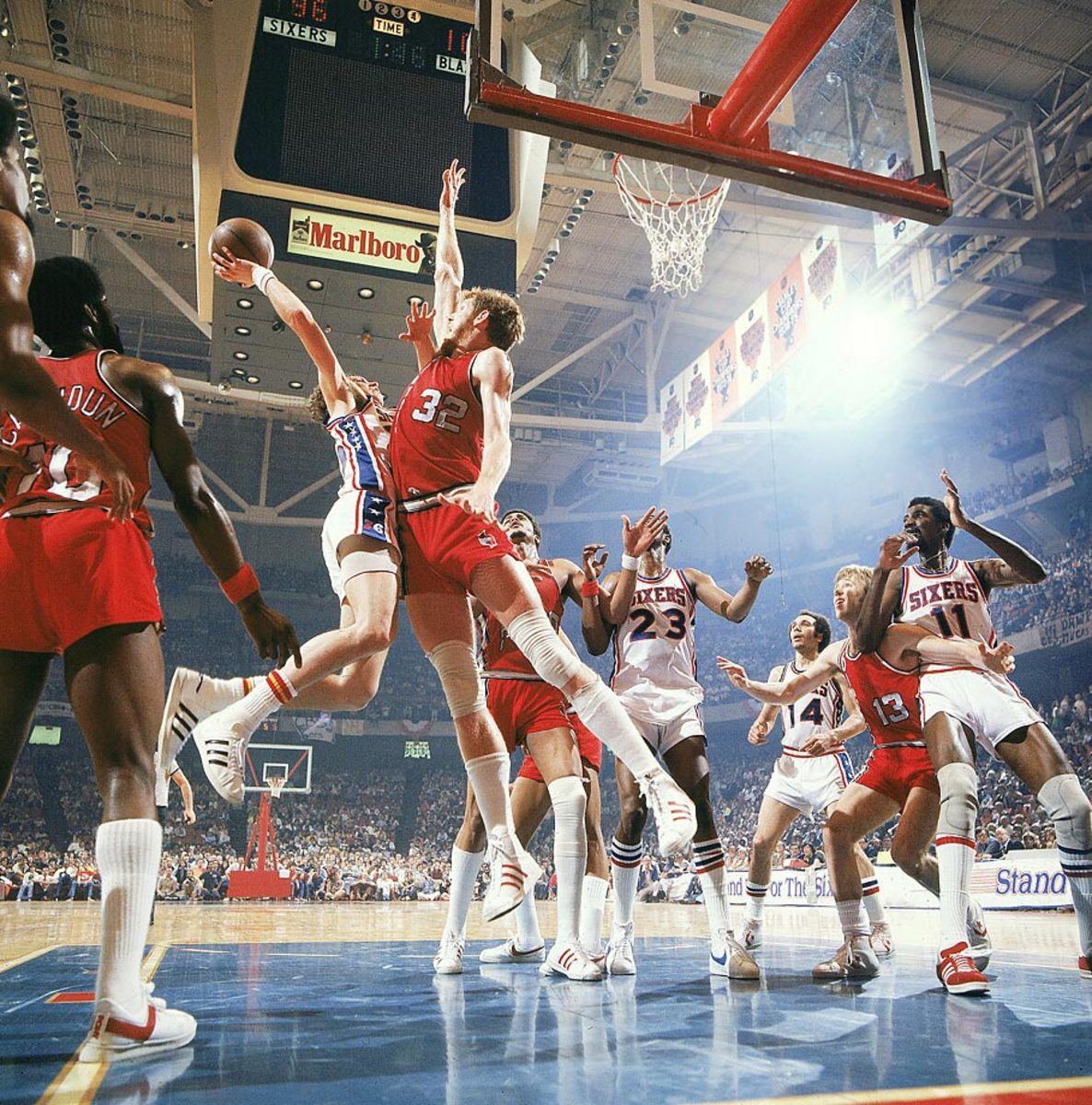
Bill Walton of the Trail Blazers contests a shot by Doug Collins of the 76ers. Walton galvanized the Blazers, who won the series in six games behind his Finals MVP-winning 18.5 points and 19.0 rebounds per game.
1976
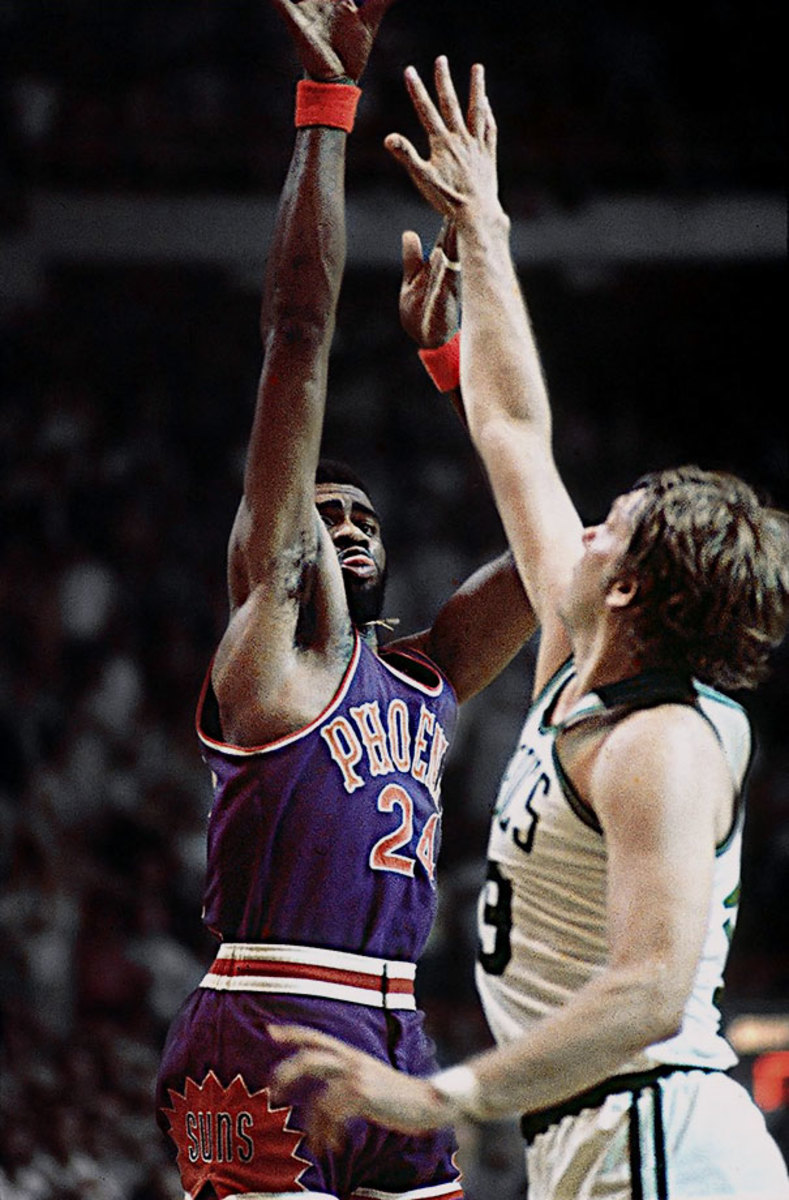
Gar Heard of the Suns releases the game-tying shot at the double-overtime buzzer against the Boston Celtics in Game 5. Boston prevailed 128-126 in the third OT, and took the series in six.
1975
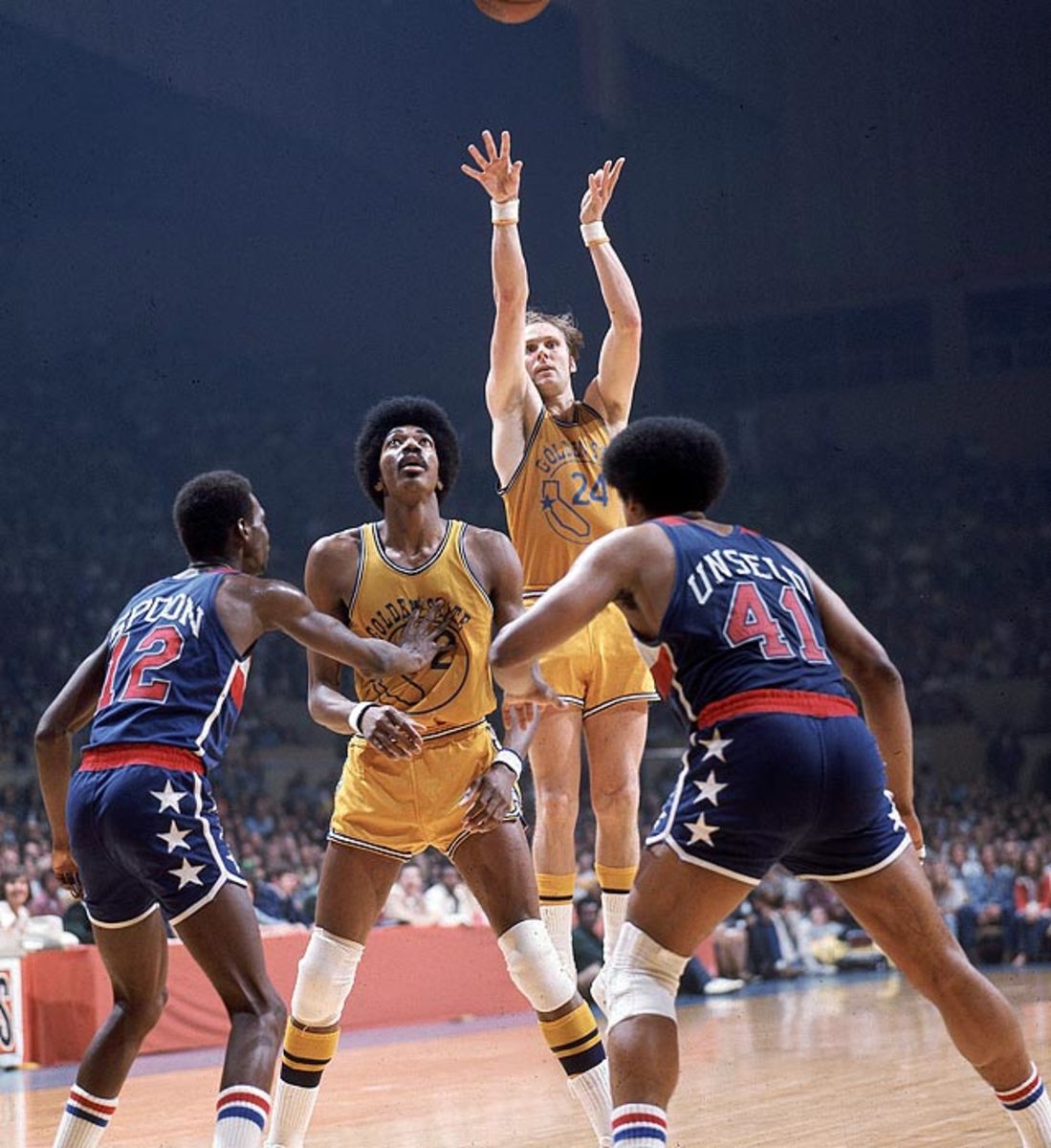
The underdog Warriors were bolstered by a red-hot Rick Barry, who led the team in a 4-0 sweep of the Bullets. Barry averaged 29.5 points, 5 assists, 4 rebounds and 3.5 steals in the series.
1974
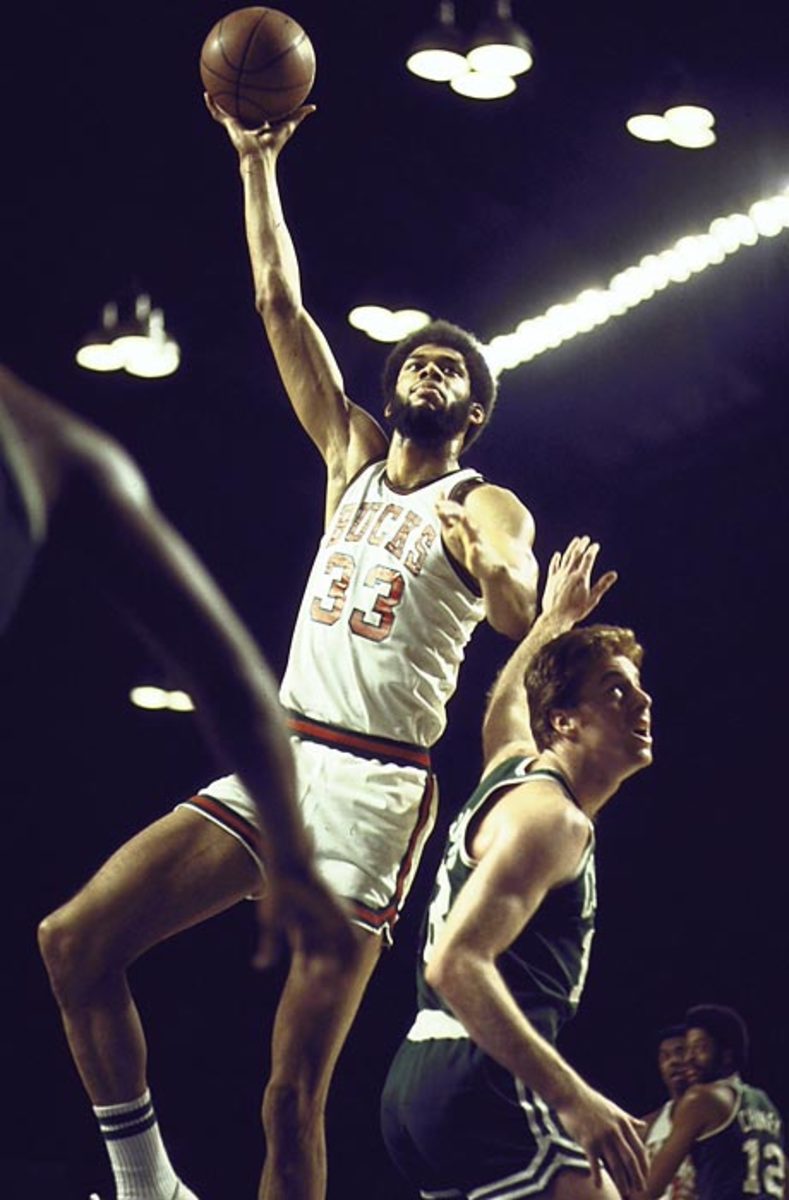
Kareem Abdul-Jabbar paced the Bucks, averaging 32.6 points per game and deploying his signature sky hook to seal Game 6, but the Celtics would pull it out in a seventh game.
1973
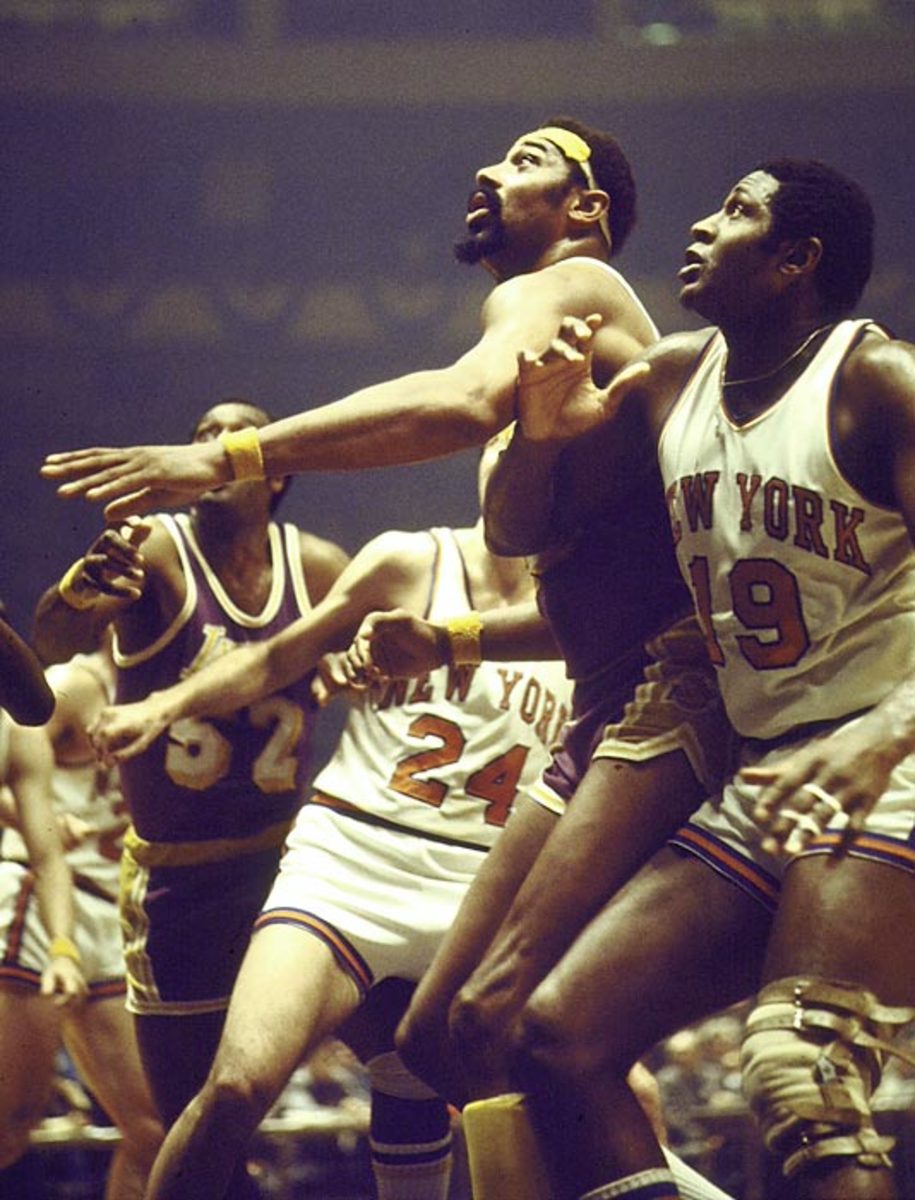
The Lakers and Knicks clashed in a rematch of the previous year, but this time it was New York in five, and Knicks center Willis Reed (19), not L.A.'s Wilt Chamberlain (center), named MVP (16.4 points, 9.6 rebounds).
1973
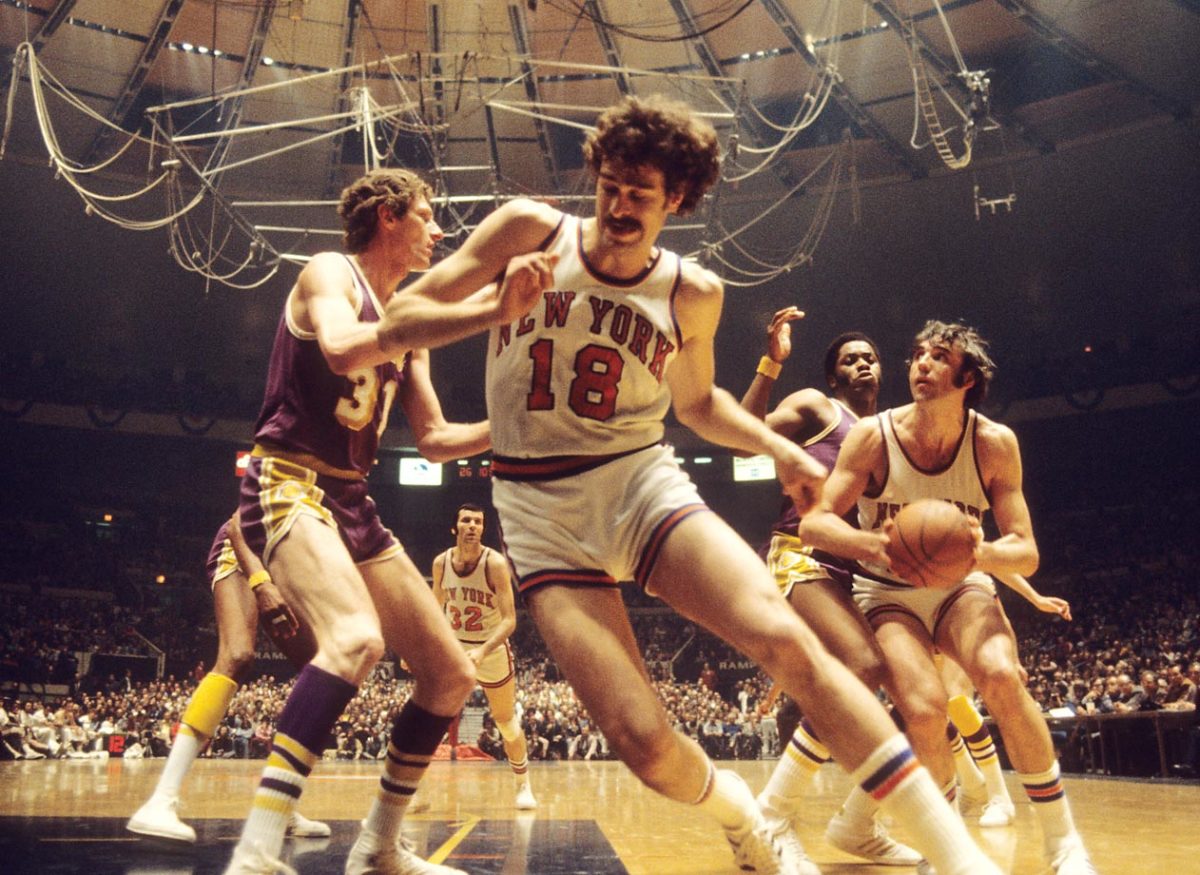
Knicks Dave DeBusschere (with ball) and Phil Jackson (18) in action against Lakers Jim McMillian and Mel Counts (31) during Game 3. The Knicks would win 87-83.
1973
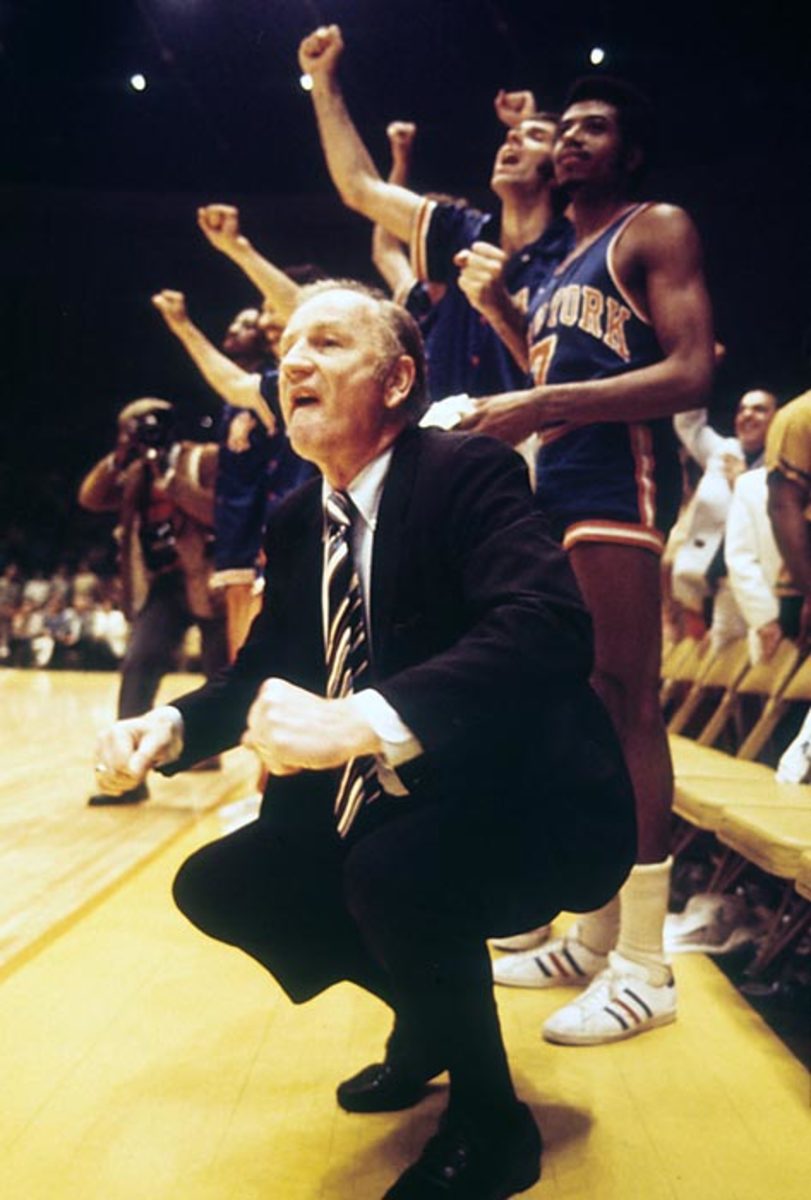
New York Knicks coach Red Holzman celebrates on the sidelines during Game 5. Earl Monroe scored 23 points for the Knicks in the series-clincher.
1972
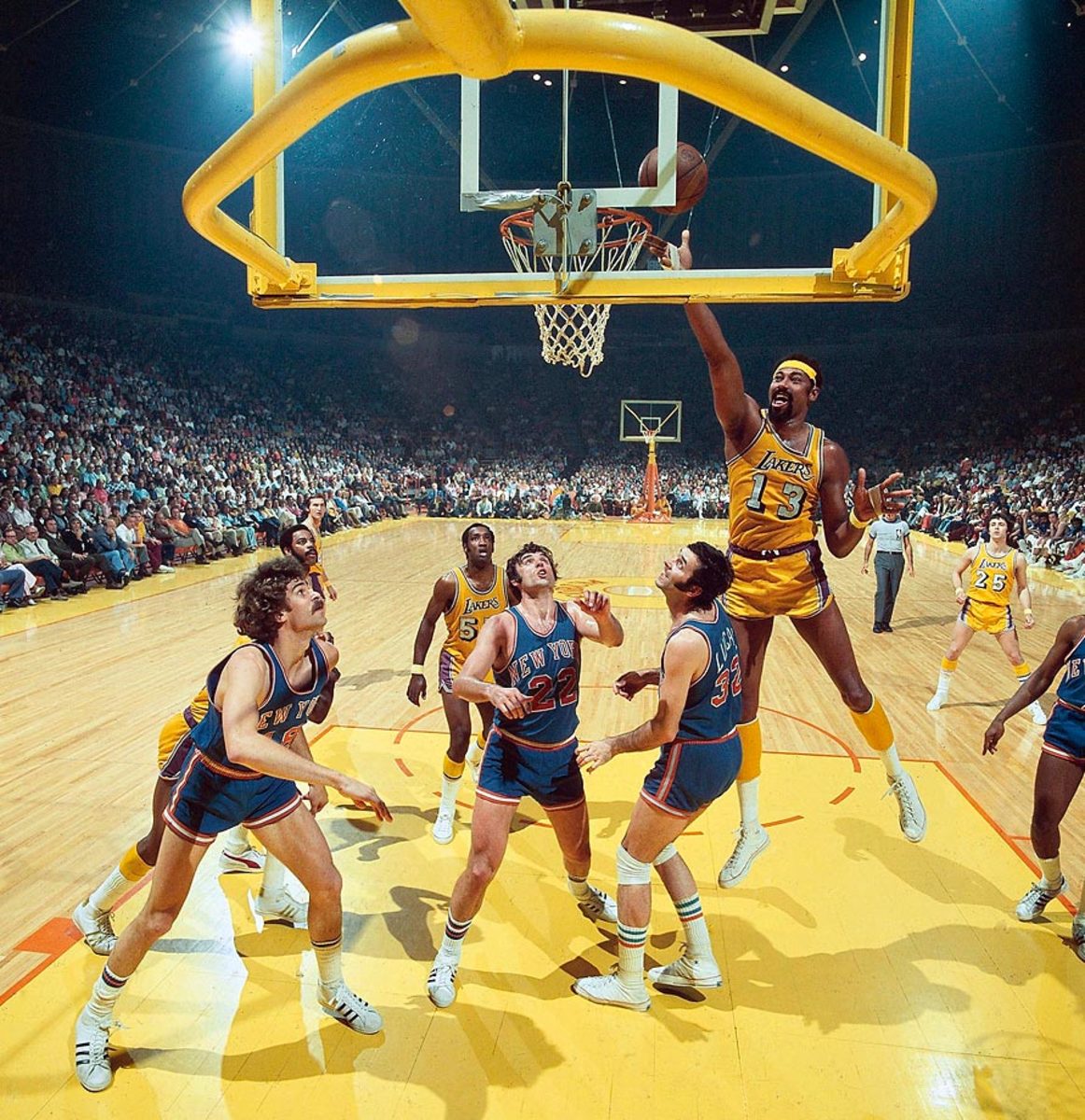
Lakers center Wilt Chamberlain took home Finals MVP honors as the Lakers defeated the Knicks in five games and won their first title since moving to Los Angeles. Chamberlain averaged 19.4 points and 23.2 rebounds on the series.
1971
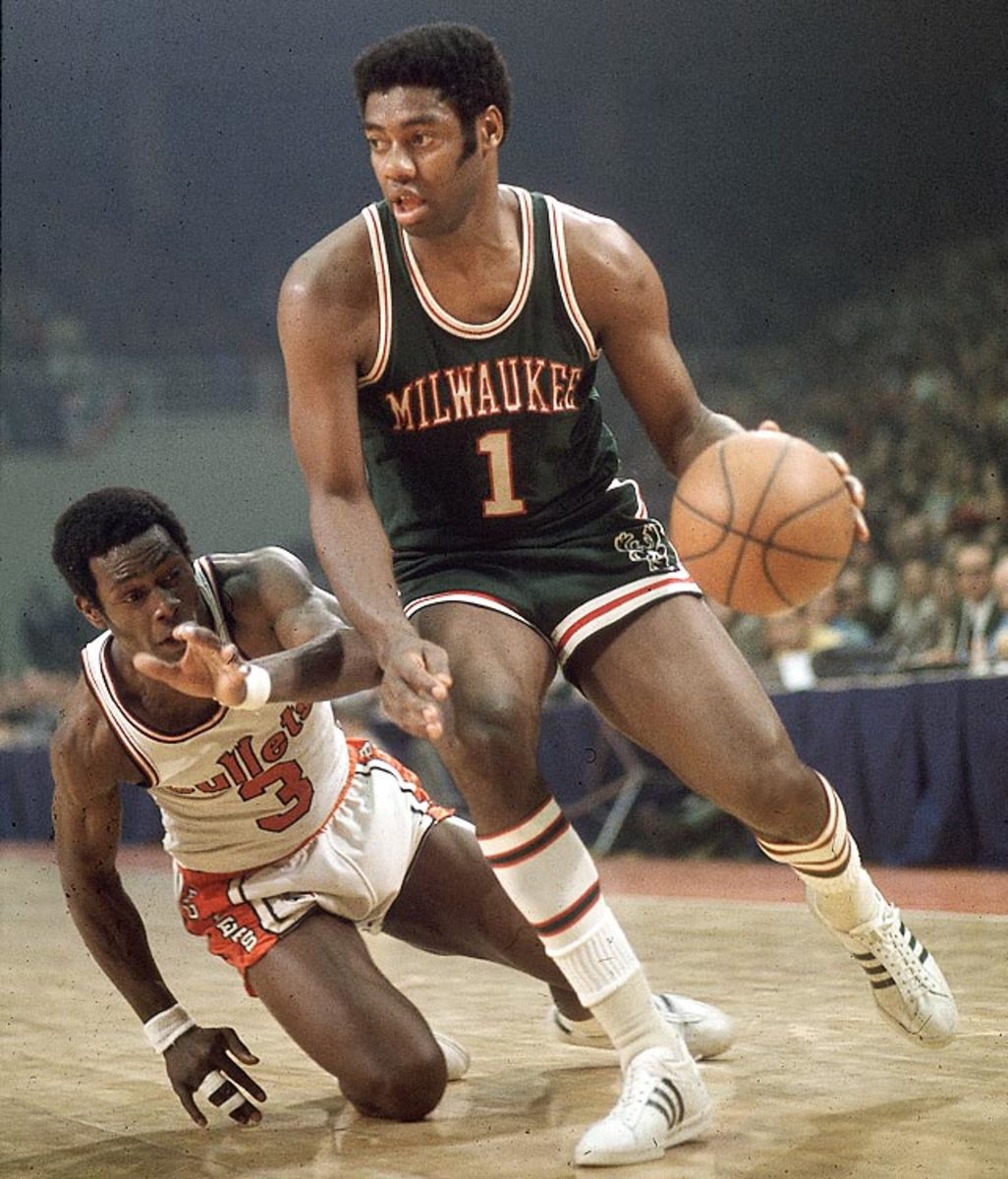
Oscar Robertson led Milwaukee on a 4-0 sweep of Baltimore in his first season joining up with Lew Alcindor and the Bucks. Robertson had 30 points in the series-clincher.
1971
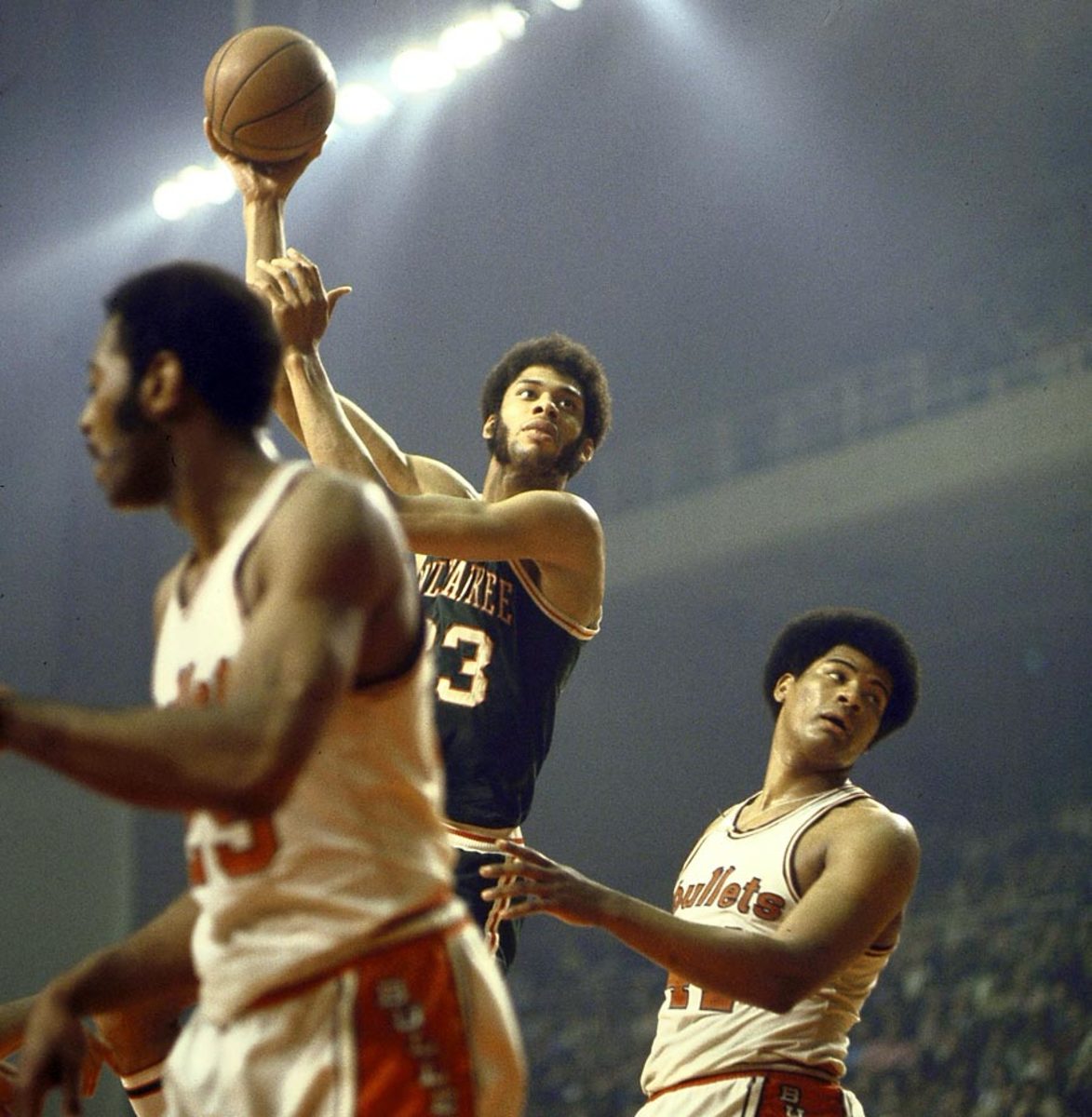
Lew Alcindor lofts one of his signature hook shots. Alcindor won the Finals MVP award, averaging 27 points and 18.5 rebounds in the four-game Milwaukee sweep.
1970
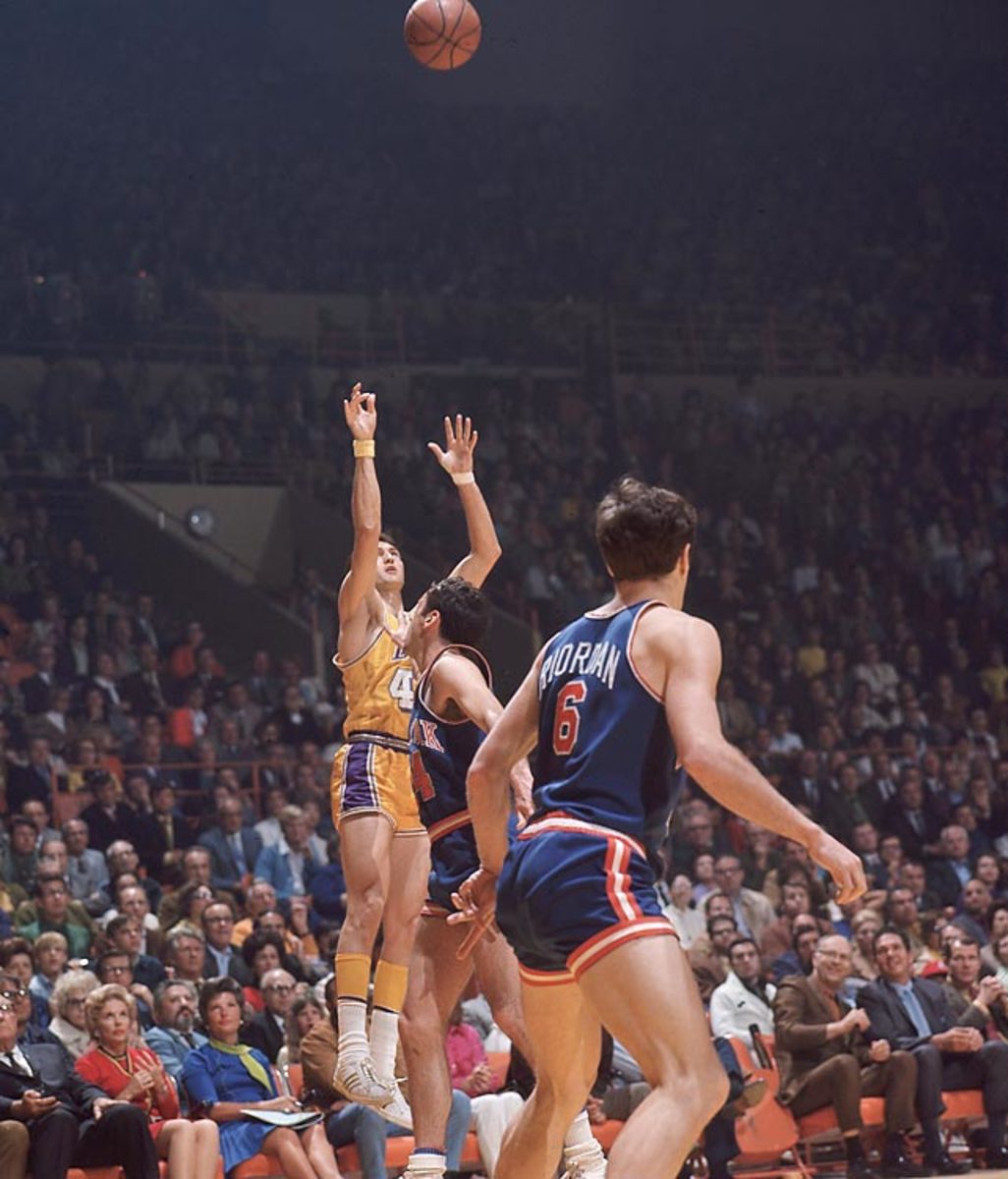
Jerry West of the Lakers launches a shot against the Knicks. West drained a dramatic, desperation 63-footer as time expired in Game 3 to send things to overtime. The Lakers went on to lose that game and dropped the series to New York, 4-3.
1970
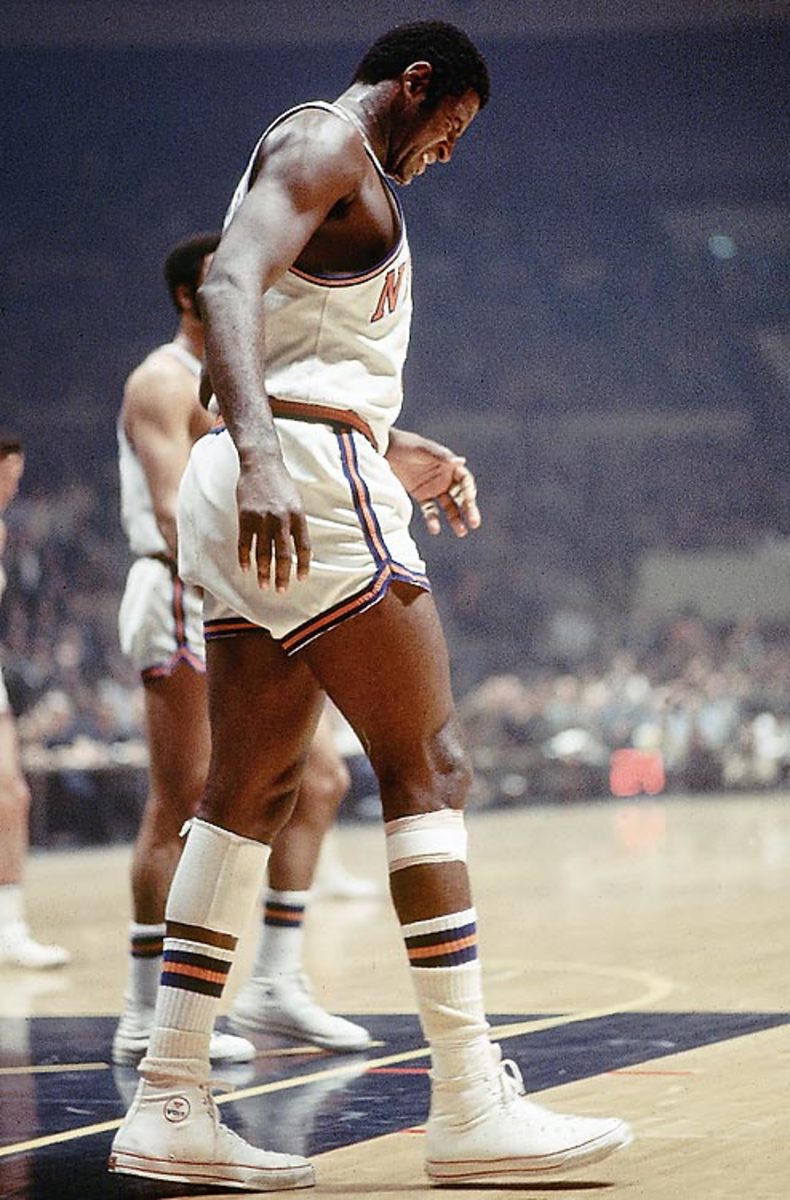
In Game 7 of the 1970 finals, injured Knicks center Willis Reed made a dramatic surprise entrance, scoring the first two baskets of the game in front of a packed Madison Square Garden crowd.
1970
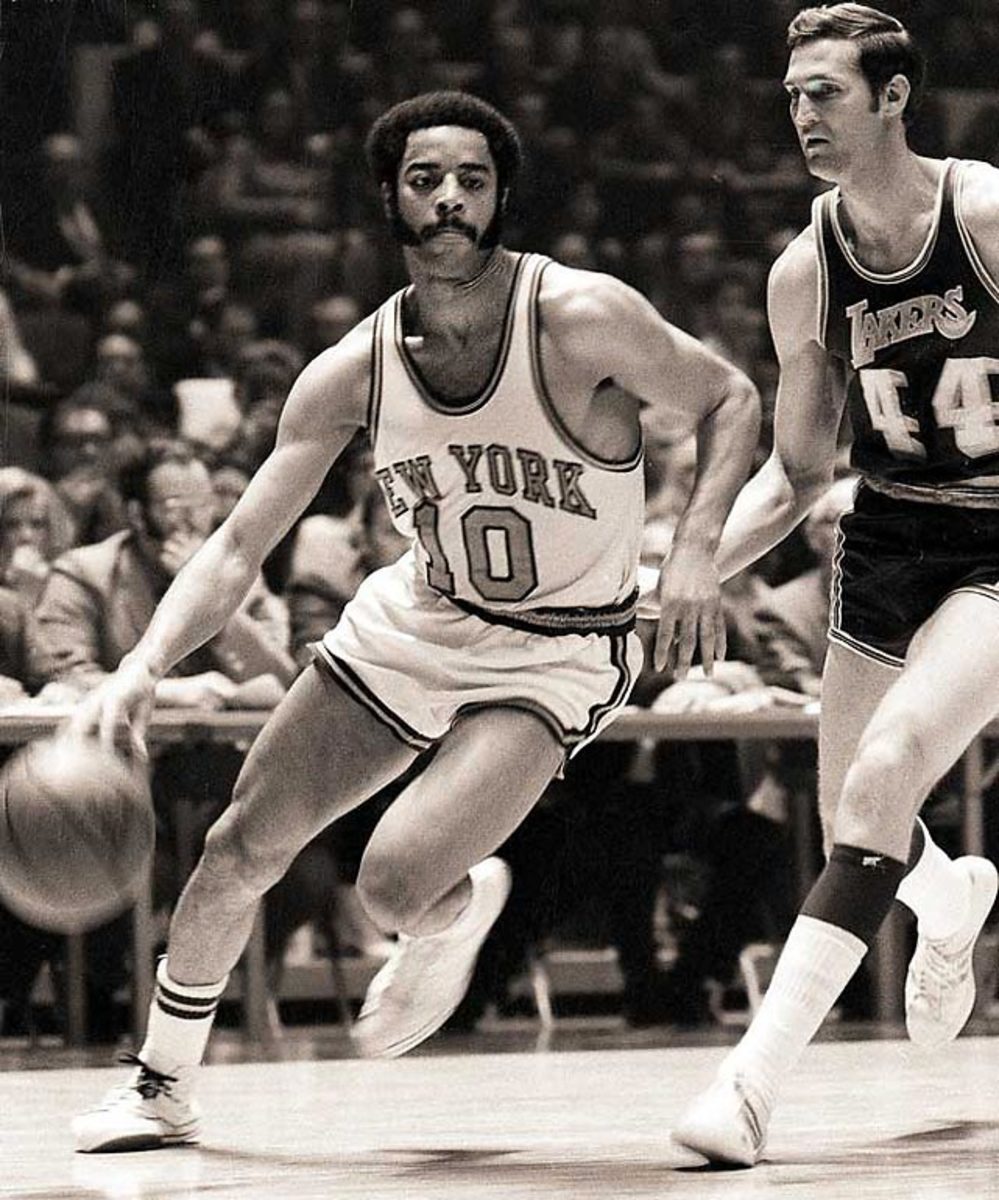
Reed got the crowd excited, but it was Walt "Clyde" Frazier, whose 36 points and 19 assists propelled the Knicks past the Lakers 113-99 to win the championship.
1969
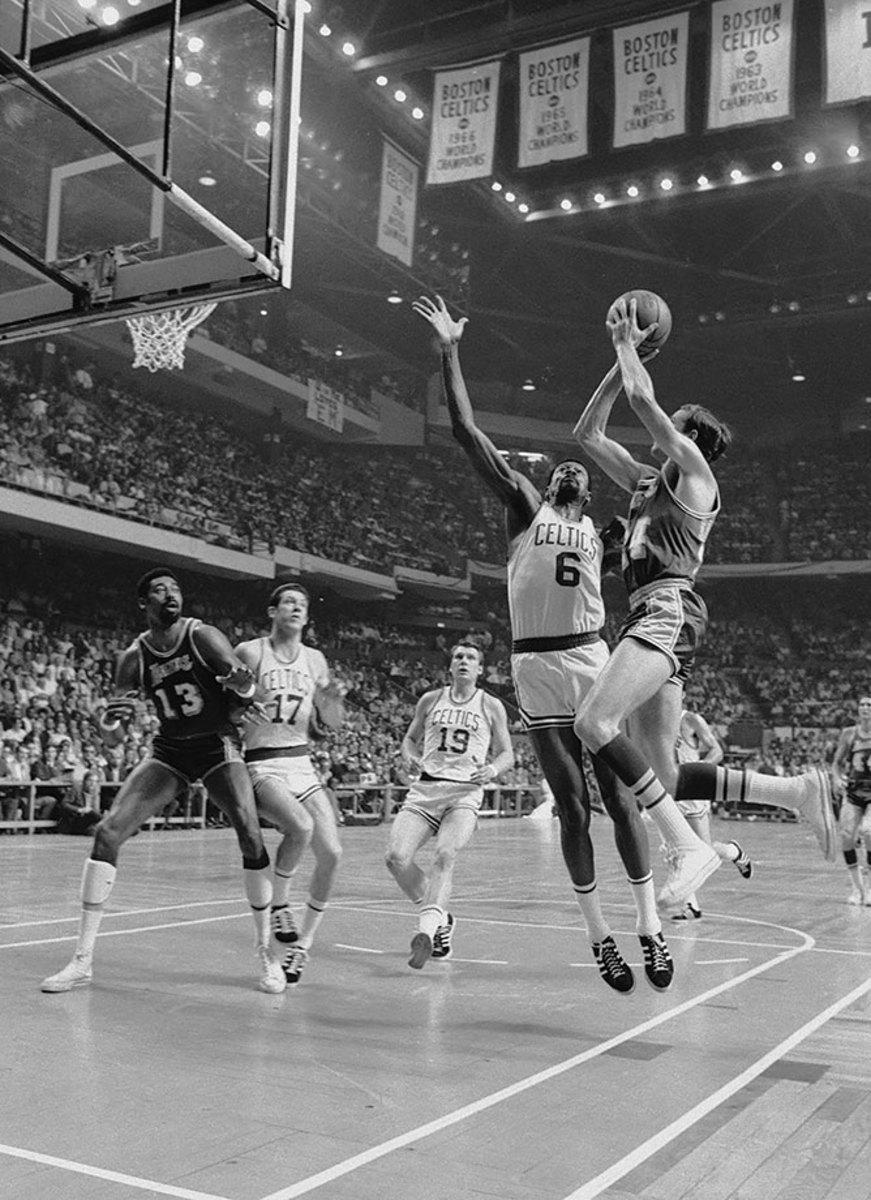
Bill Russell attempts to block Jerry West in Game 3 between the Celtics and Lakers. The Lakers were heavily favored (West averaged 38 points in the series on a squad that also had Wilt Chamberlain) and jumped out to an early 2-0 lead, but the Celtics came back to hand player-coach Bill Russell his final championship.
1969
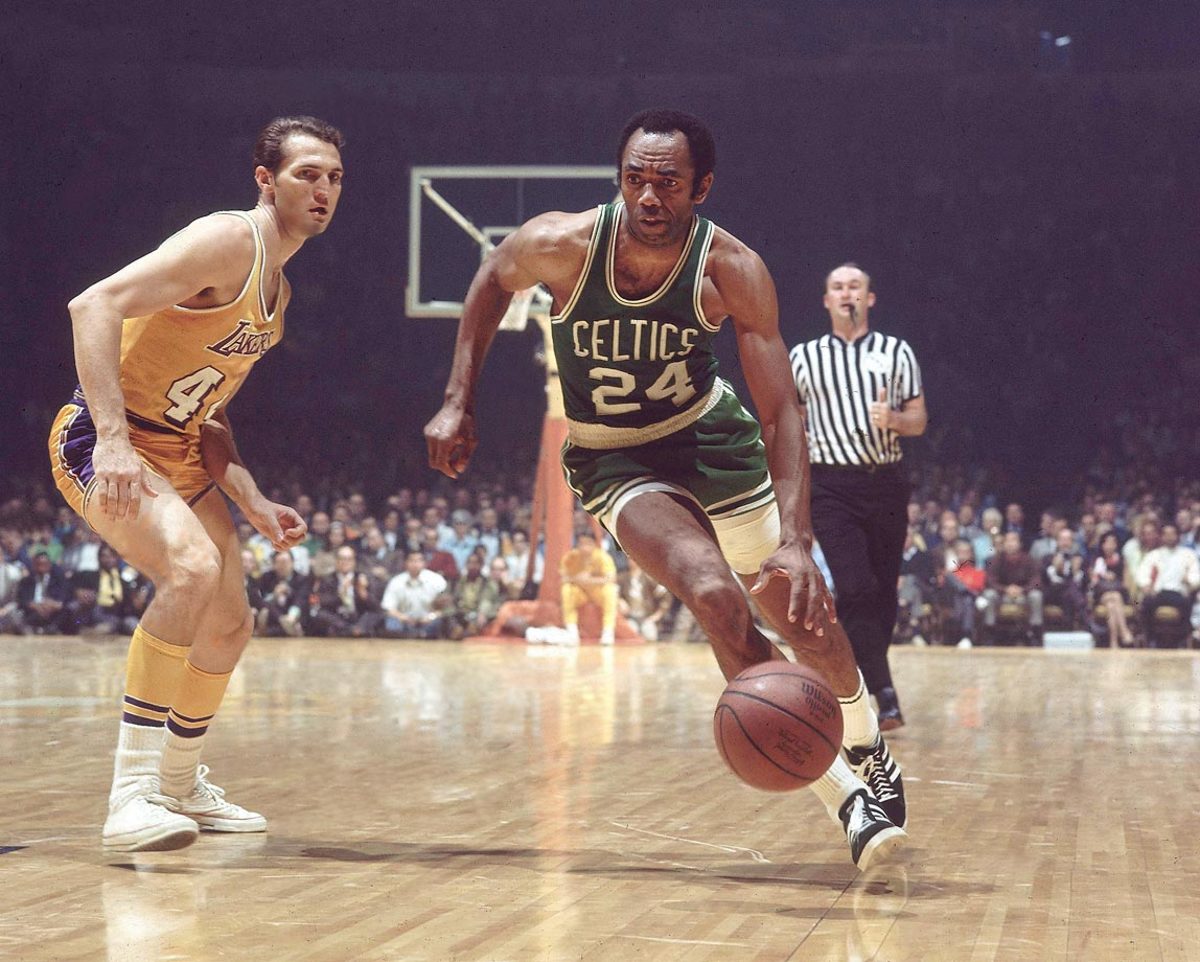
Sam Jones of the Celtics dribbles around Jerry West of the Lakers. Jones would hit the game-winner in Game 4 of the 1969 finals to even the series at two games. Boston would go on to take the title in seven.
1968
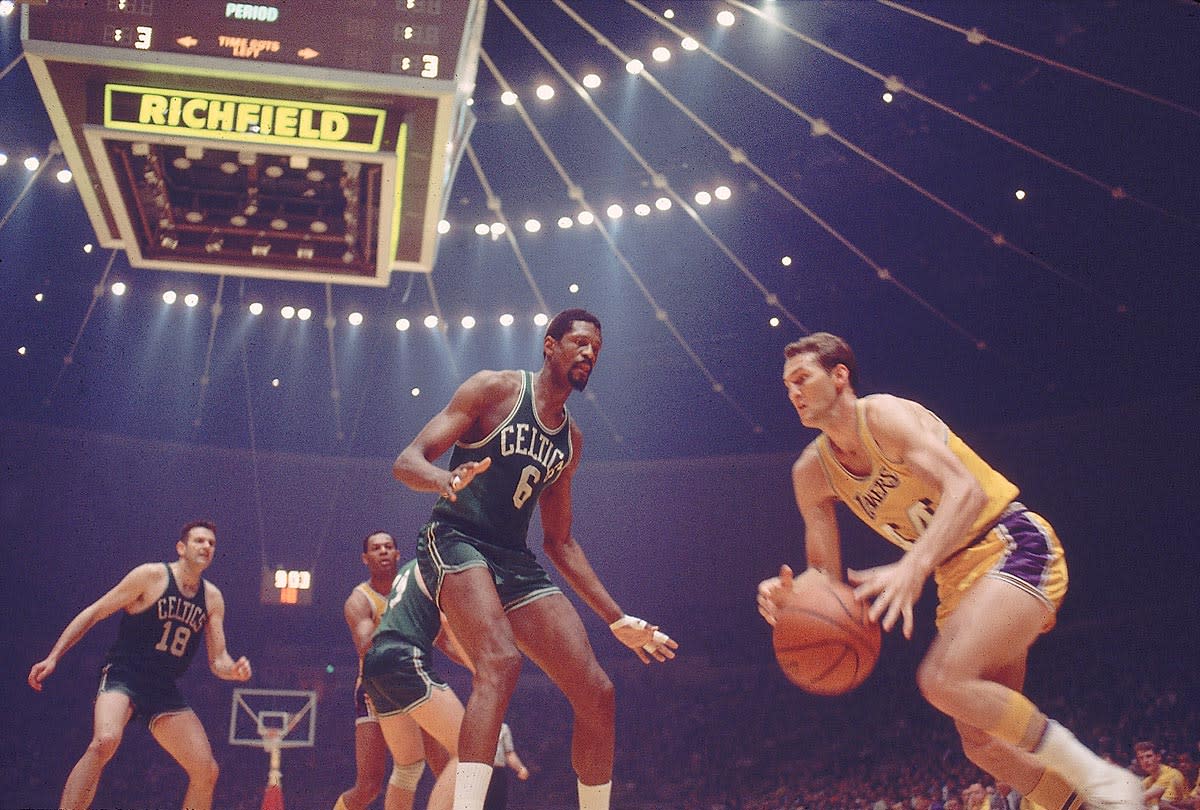
Lakers guard Jerry West drives past Celtics center Bill Russell in Game 6. Boston went on to a 124-109 win at the Forum to clinch the series 4-2.
1966
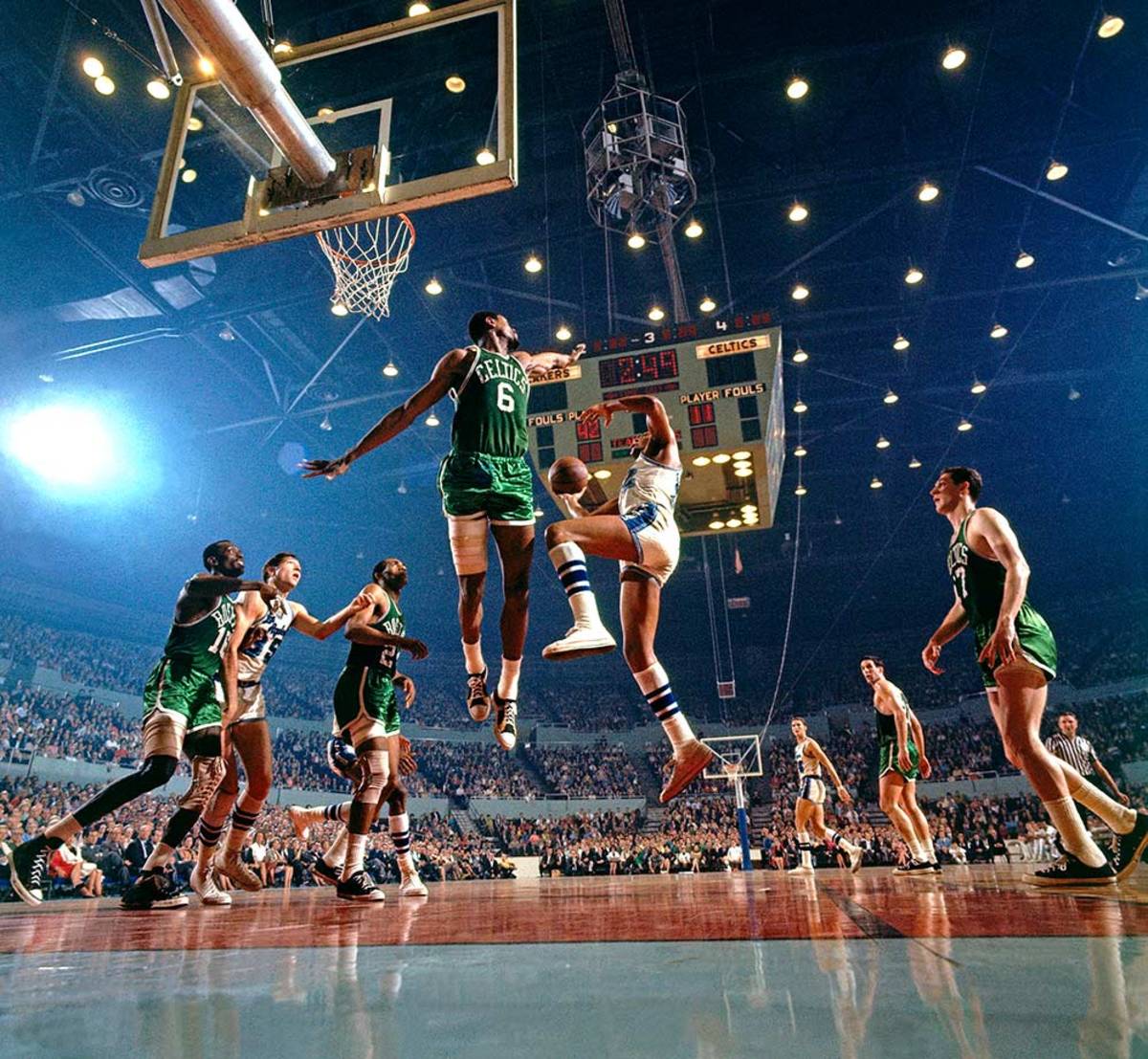
Bill Russell leaps to block Elgin Baylor. Russell and the Celtics were a constant thorn in the Lakers side, defeating them for five of their eight straight titles (1959-66).
1966
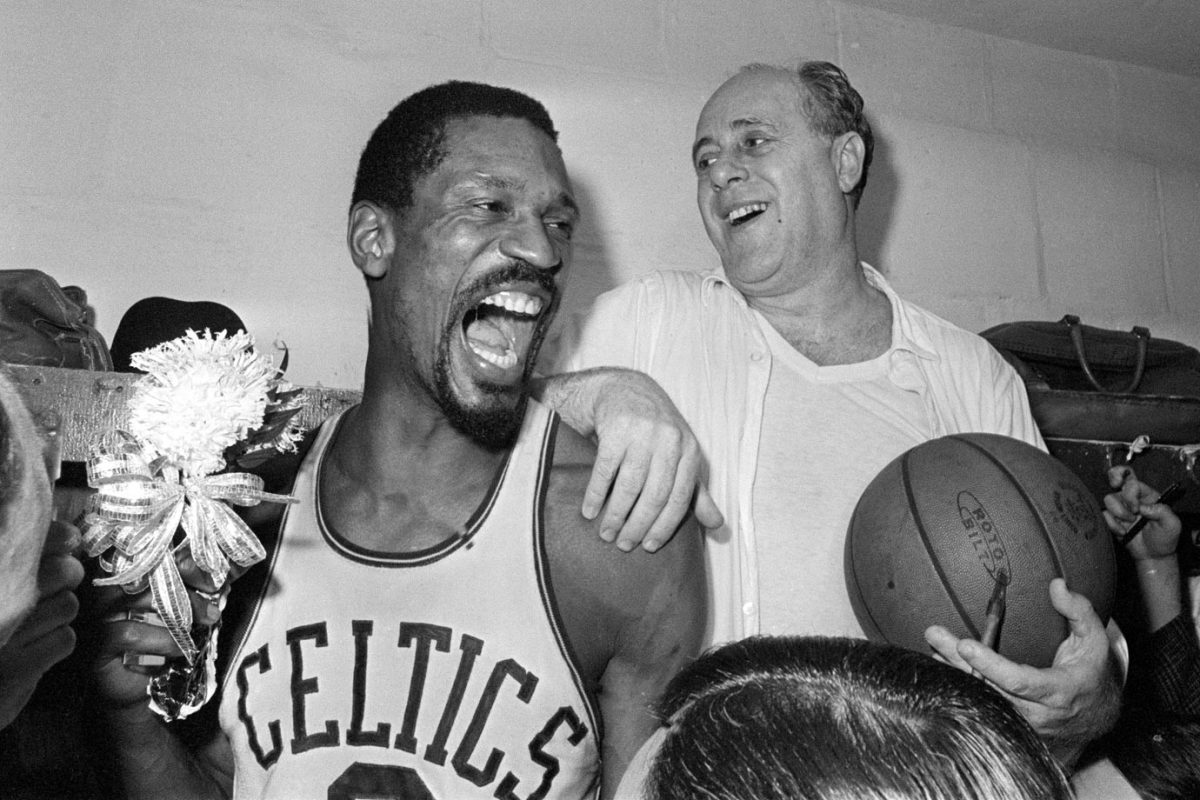
Bill Russell holds a corsage sent to the dressing room as he celebrates with Celtics coach Red Auerbach after defeating the Lakers, 95-93, in Game 7 to win their eighth-straight NBA championship.
1962
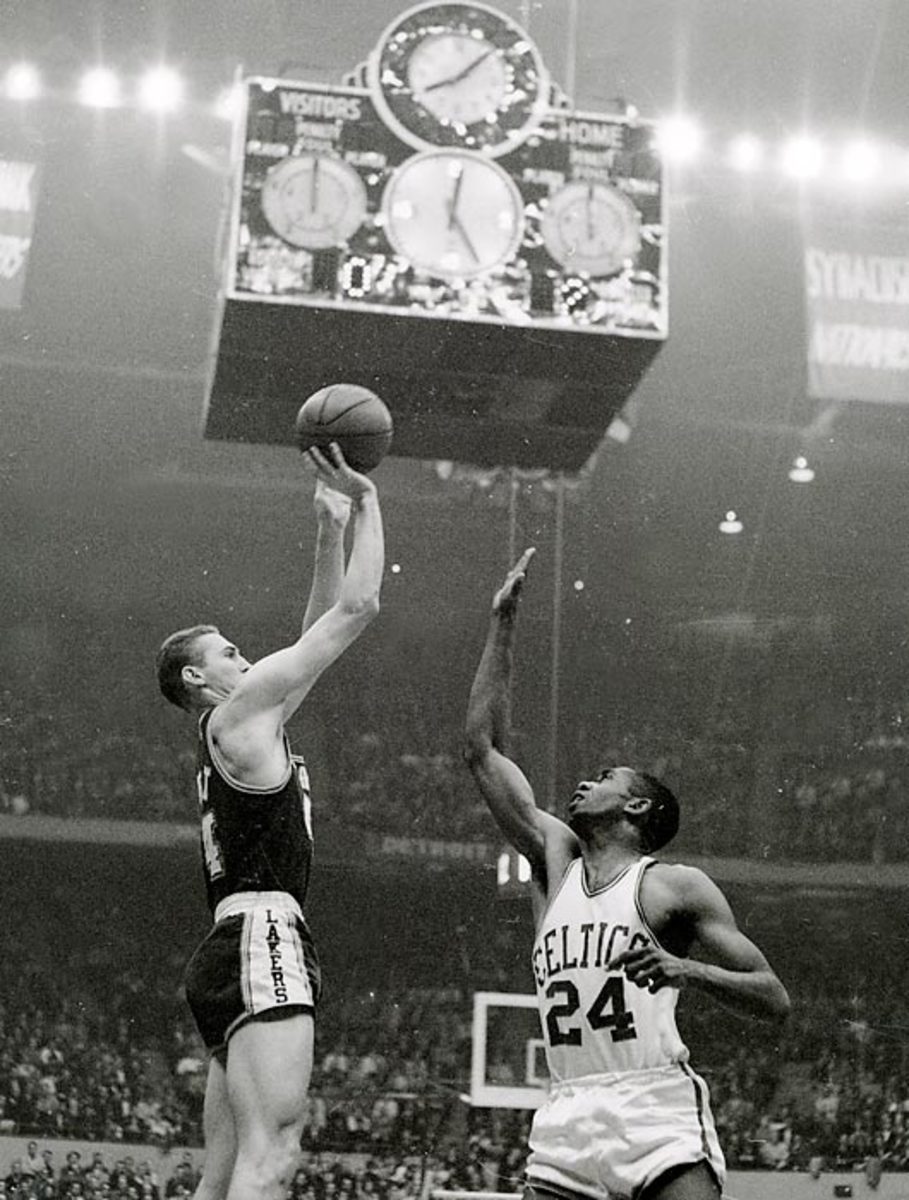
Jerry West of the Lakers elevates for a jumper in Game 7 against the Celtics. West scored 35 points, but Boston would win the game and the series.
1962
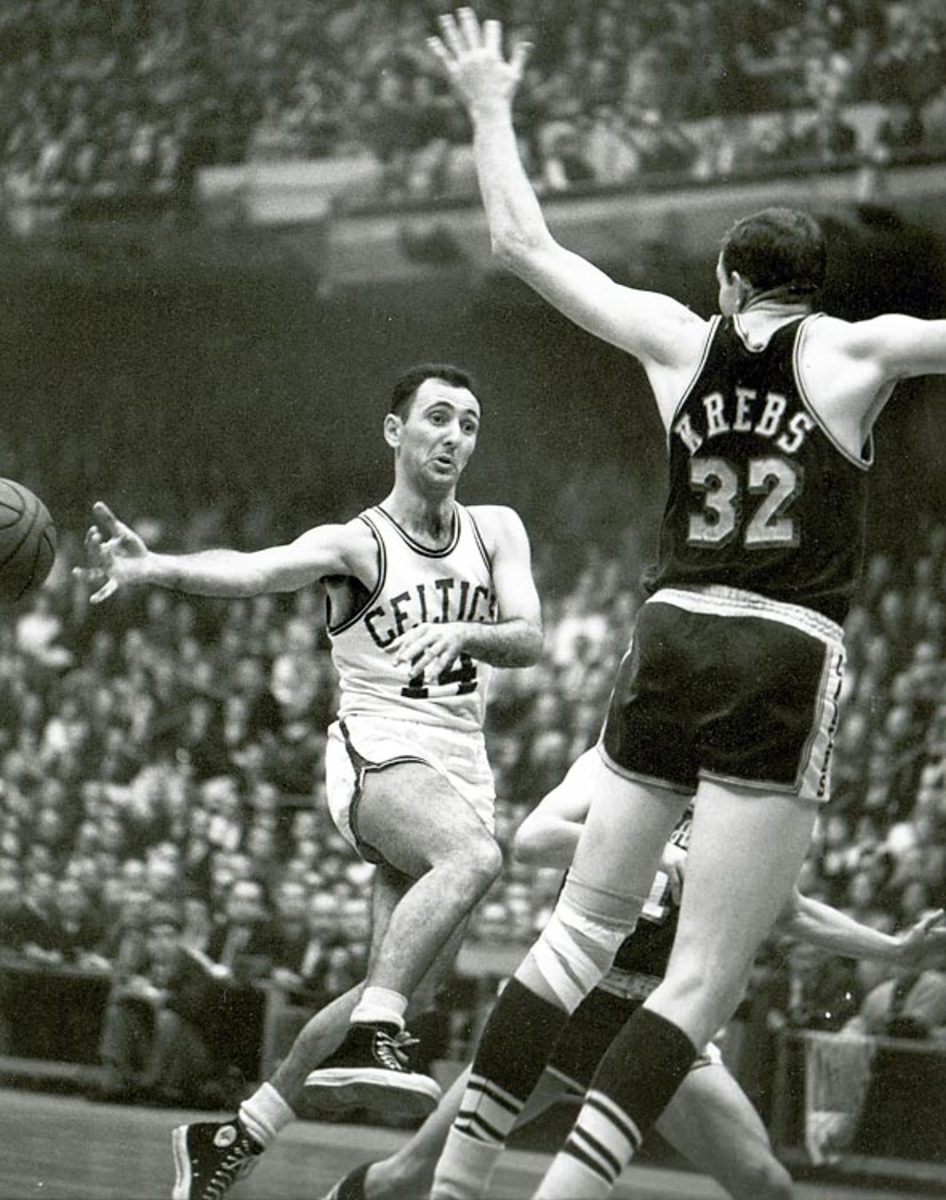
Celtics point guard Bob Cousy (14) throws a no-look pass in Game 7. Later that game, he would famously elude several Lakers and dribble out the clock to deliver Boston the title.
1962
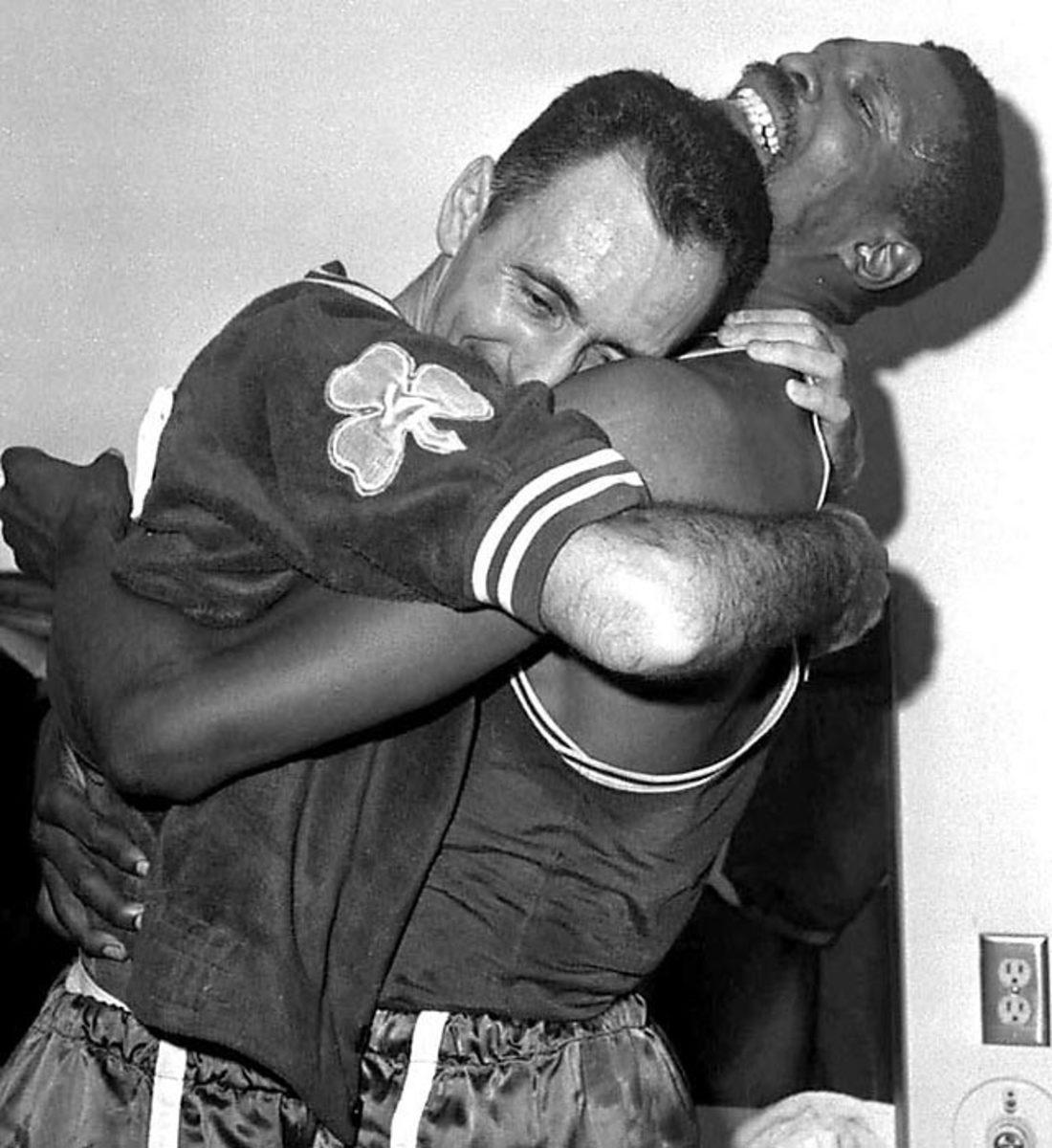
In one of the greatest winner-take-all games in NBA history, the Celtics beat the Lakers for the title, 110-107 in overtime, behind Bill Russell's 30 points and 40 rebounds.
1962
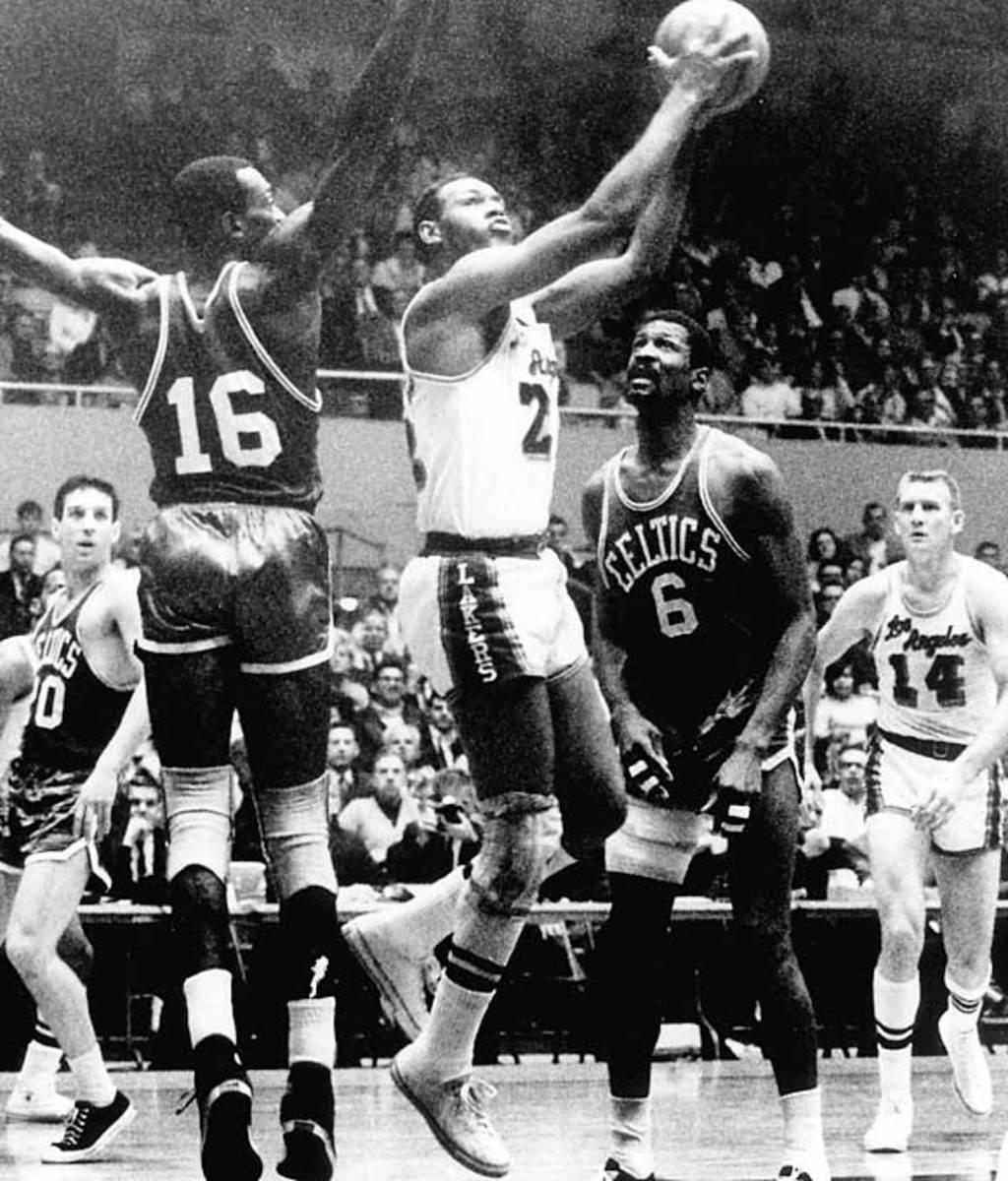
Elgin Baylor of the Lakers erupted for a Finals-record 61 points and grabbed 22 boards against the Celtics in a 126-121 Game 5 win at Boston Garden. The Lakers took a 3-2 series lead in what became a classic first finals meeting between L.A. and Boston.
1957
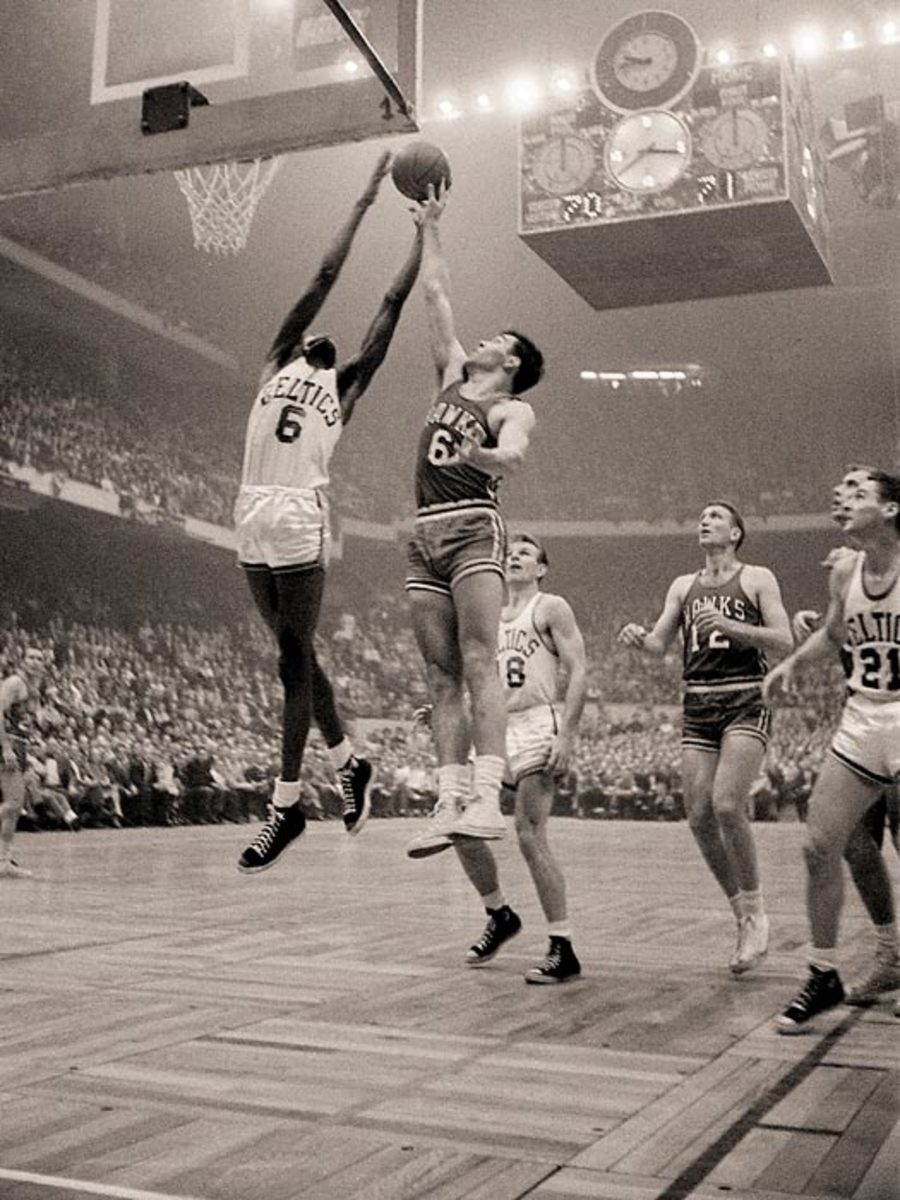
Bill Russell of the Celtics grabs a rebound over Cliff Hagan of the Hawks in Game 5 of the 1957 finals. The Celtics won the game 124-109 and took the series in seven in Russell's rookie year after acquiring his rights in a trade with ... St. Louis.
1949
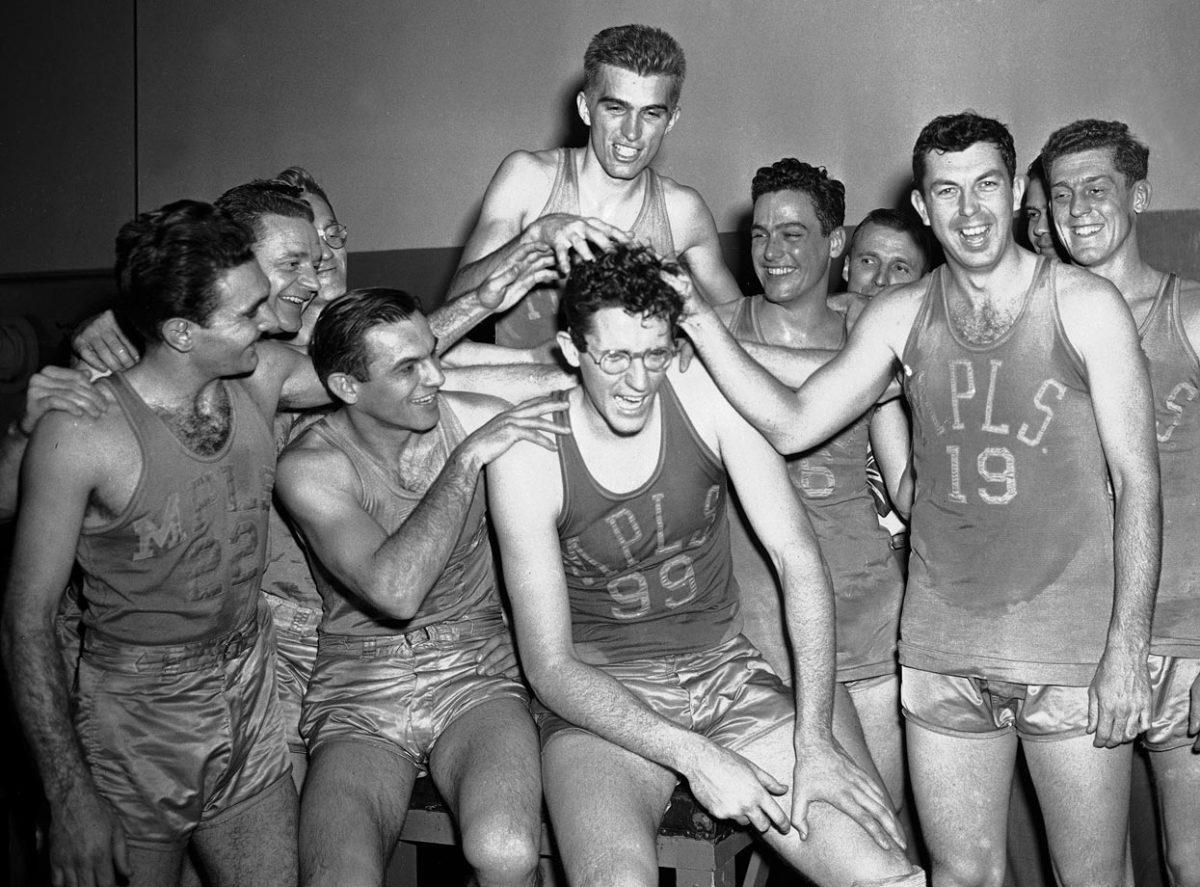
Lakers center George Mikan (99) gets his hair mussed by teammates after leading Minneapolis to its first-ever championship. Mikan set a Madison Square Garden scoring record with 48 points in a 101-74 victory over the Knickerbockers. The Lakers' 101 points also set an all-time team high scoring mark at the Garden.
Who LeBron James defends
Cleveland’s best all-around defender is also its most important offensive player. That’s the kind of luxury a team has to couch in long-game thinking; asking too much of LeBron over the full term of a playoff series risks wearing him down, possession by possession, until compromising much of what makes him so good. A fresh, physical James could be more than the Warriors can handle. A sapped, overextended James wouldn’t have access to the level of command the Cavs desperately need.
As such, James might be best off assuming a lesser defensive role—like guarding Iguodala or Barnes—for as long as possible. Churning in the background, however, is the distinct possibility that Cleveland’s rotation might not allow it. J.R. Smith will walk a fine line in taking on Klay Thompson. Kyrie Irving will pick up Curry to start, though we’ll see Iman Shumpert and Matthew Dellavedova share in that responsibility at times. Tristan Thompson will likely be tabbed to guard Green by process of elimination, though his minutes will be fairly modest.
Each of those matchups presents problems—some slightly concerning, others clearly alarming. James, in moderate doses, is the way to quiet them. Cleveland has no better option for defending Green when Thompson is off the floor, and perhaps no better option for defending Green (and, by extension, his pick-and-roll partners) period. James has no business burning energy trailing Thompson all around the floor if Smith comes up short, though Shumpert might be able to handle that assignment if James can check Curry in spots. There’s a lot to untangle in deciding how to make best use of James’s defense without demanding too much, most of which is rooted in…
Cleveland’s defense against Curry
Irving is in line for the biggest challenge of his basketball career: a ringer of pick-and-rolls and pin-downs that has effectively neutralized some of the best defensive players and systems in the league. His knack for suboptimal positioning will be attacked, as will his chemistry with a number of defensive partners. Should the Cavs start switching in an effort to stall the Warriors’ execution, then Irving will be all that stands between players like Green, Barnes, and Thompson as they work the post. Otherwise, he’ll have be tasked with restricting Curry through any means possible and spending his most in a constant, desperate state of recovery.
Data Dimes: 2016 NBA playoffs are the most lopsided in league history
The only evidence that suggests he might be up for the challenge is part of one game in last year’s Finals. Otherwise, most of the precedent on film points to this matchup being a problem—especially if the Warriors are able to knot up Irving and Love directly via two-man actions. Rarely are those two on the same page, which often either forces an additional rotation from elsewhere on the floor or yields an immediate opening. With Curry involved, there now exists the possibility that he might pull up for a three-pointer without really driving into the defense at all, should Irving and his pick-and-roll partner botch their defensive exchange.
Any kind of above-and-beyond defensive performance from Irving would go a long way in settling Cleveland’s playing rotation. Otherwise, Tyronn Lue might have to toy around with leaning hard on Shumpert (a better Curry foil, but not a perfect one) at the expense of his offense, playing Dellavedova (who isn’t as much a match for Curry as the narrative of the 2015 Finals would have you believe) more alongside Irving, or throwing LeBron into the mix for as many minutes as he can handle. None of these solutions is especially elegant, but this particular matchup leaves the Cavs in a pinch. Even the best, most aggressive defense possible from this group would still leave Curry the opportunity to cut backdoor—all without Mozgov around protect the basket. Irving might just have to make do, while using his positional alignment to attack…
Klay Thompson, crossed in transition
Kerr never really committed to one primary defender against Irving in the regular season matchups between these two teams, though Thompson is decidedly the best direct choice among those available. Few perimeter defenders in the league do a better job of angling a ball handler in the direction of the help before continuing in pursuit; point guards, in particular, can feel Thompson right on their heels even after they turn the corner, and tend to rush shots or dribble into trouble because of it. Irving would be a handful in his own right, but Thompson is up to the challenge of hanging with his deceptive dribble and recovering to contest Irving’s mid-range jumpers.
The real trick will be if Thompson, should he get the job of defending Irving full-time, can fully make his way back into position when Cleveland transitions quickly into its offense. At the moment the Cavs collect a defensive rebound, Irving—who will essentially never defend Thompson in this series—might be on the opposite side of the court with a significant head start on the break. It’s then that the Warriors will need to pick up as they can and survive a possession at relative disadvantage, even if the action slows to attack their potential mismatches.
Golden State will have some options in those scenarios and is better equipped to scramble in transition than most. What they might not have is time; if Irving and James are running the ball aggressively, even a frantic point or call to a teammate might not come soon enough. It’s there that these kinds of cross-matches can fall flat. Whatever advantage there is to be gained by having Thompson defend Irving in half-court situations has to be protected in the chaos of a transition free-for-all. Even an isolated, dedicated matchup like this one can only succeed with the help of Thompson’s teammates.
